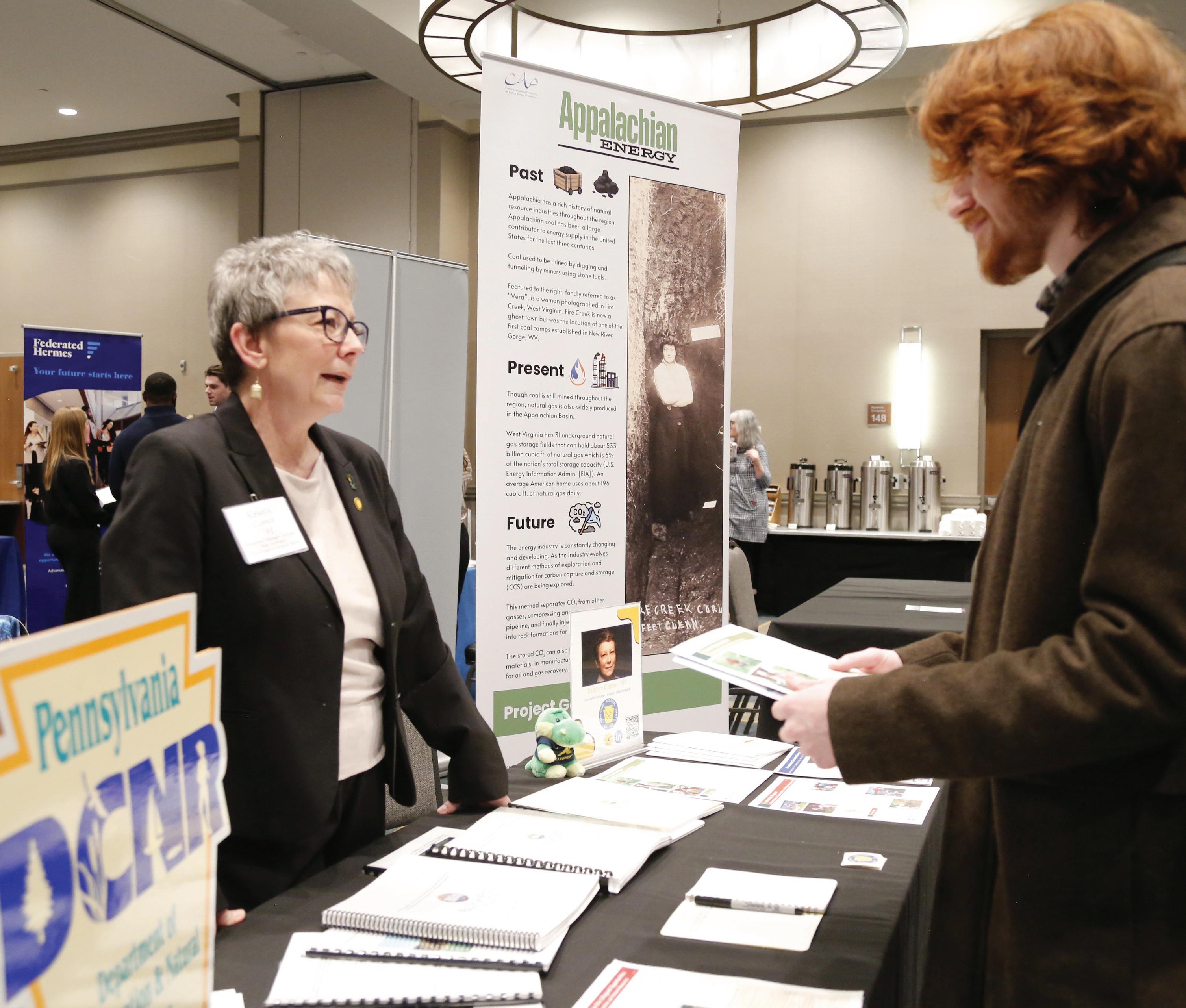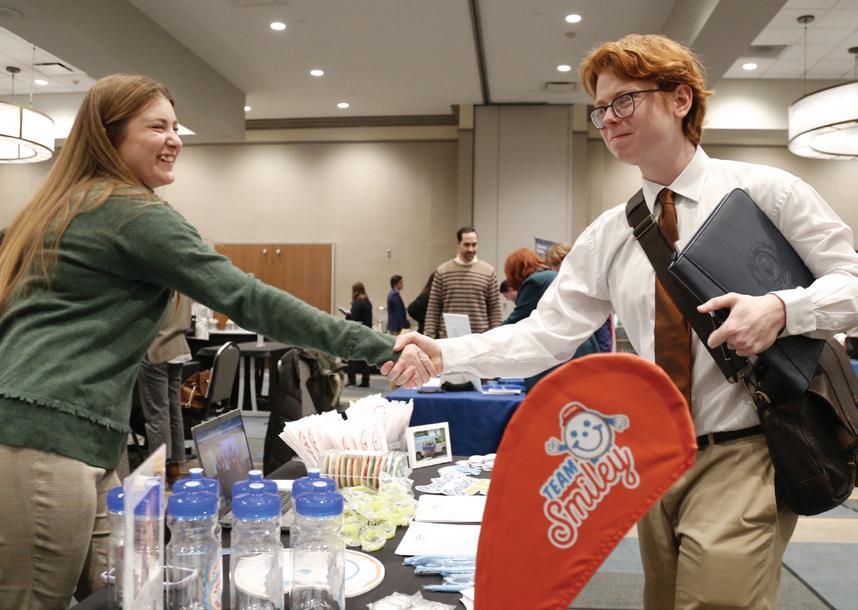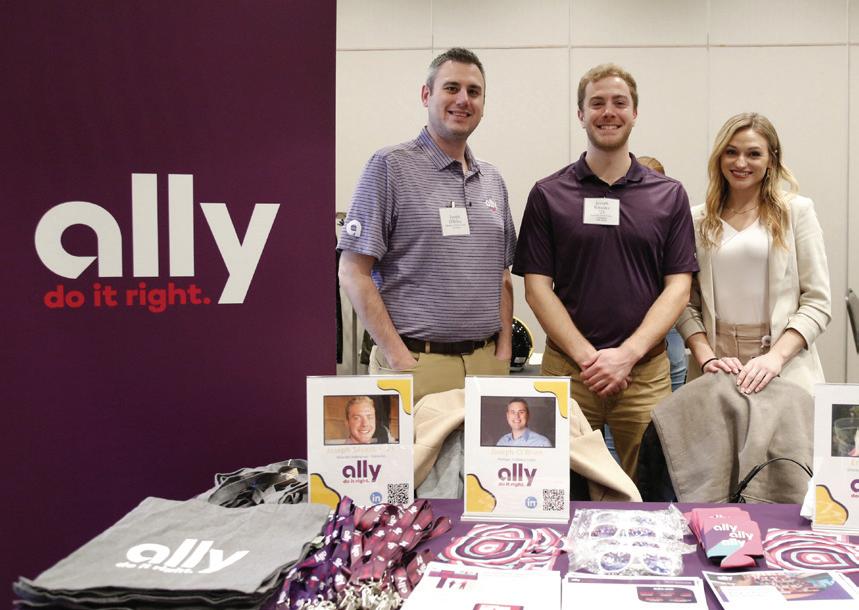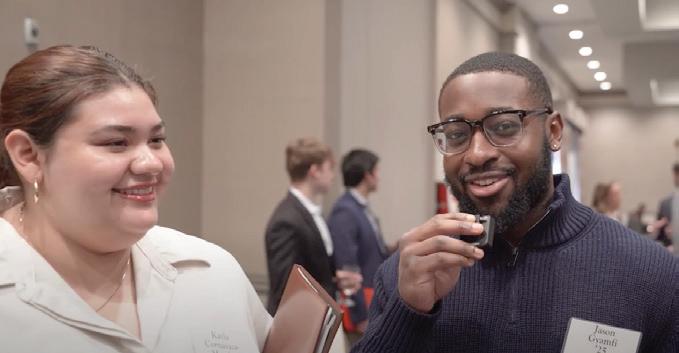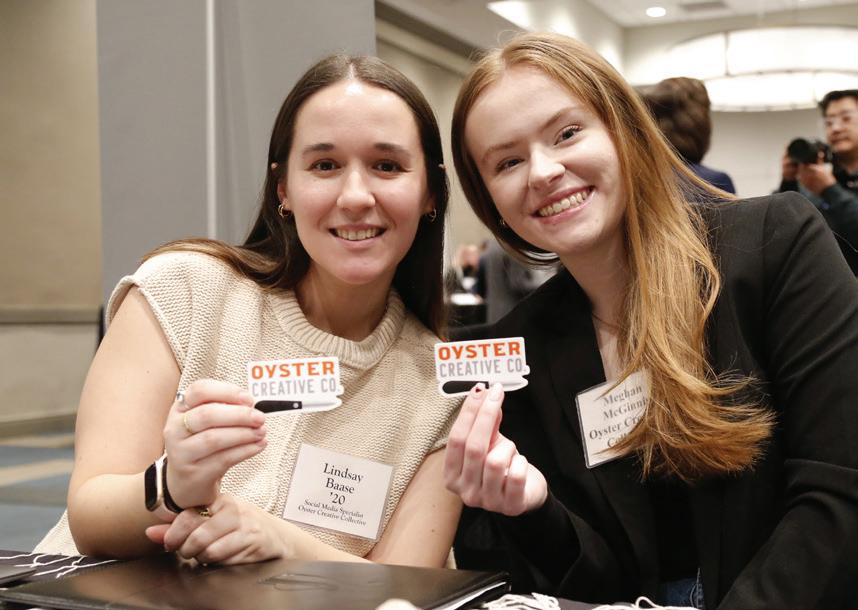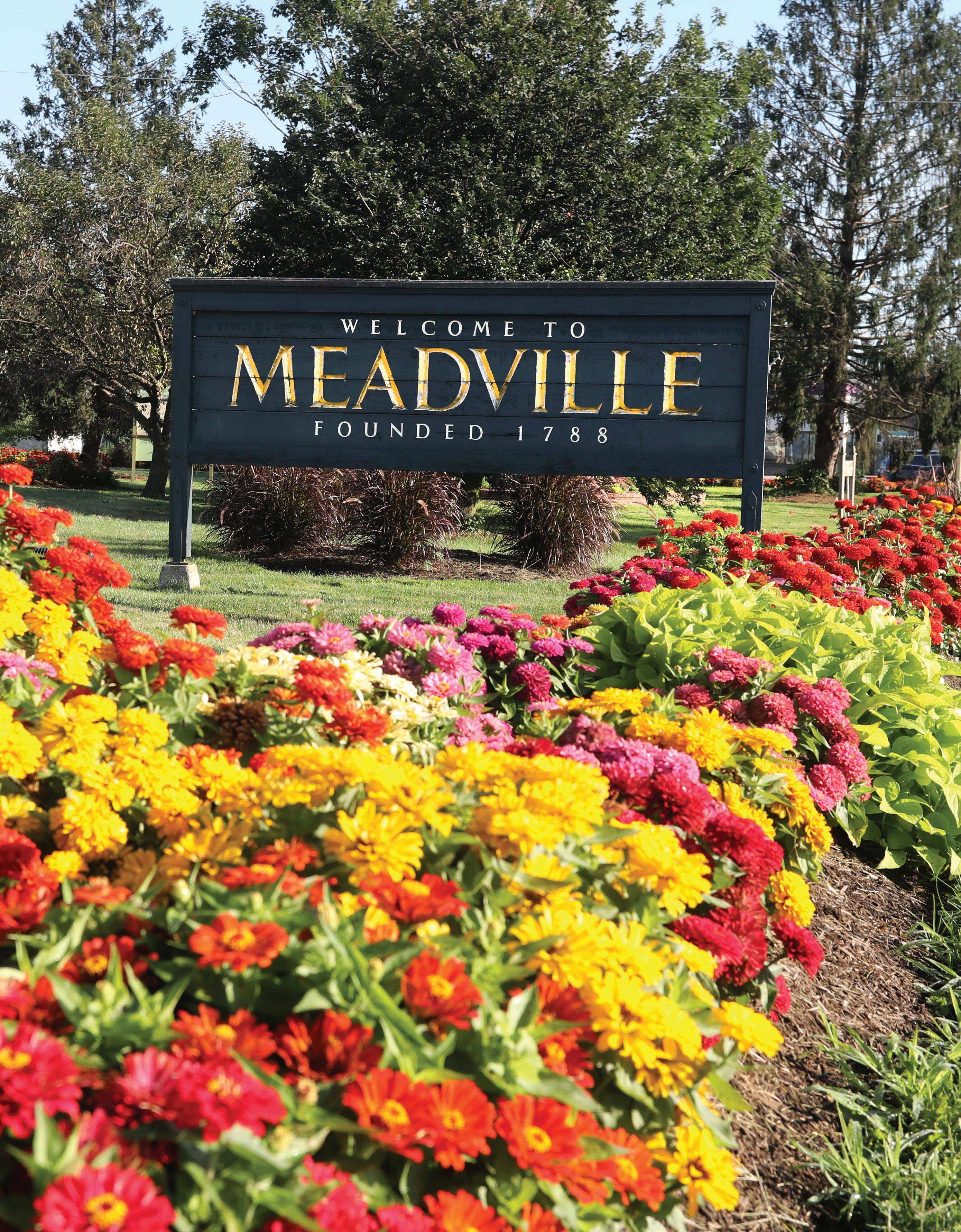





The beloved spring Run-Out is an annual tradition where each nationally affiliated social Greek-letter organization chapter introduces its new members to the campus. This year was a chilly one, but the joyful students paid no attention to the snow. Approximately 25% of Allegheny students are members of a fraternity or sorority.
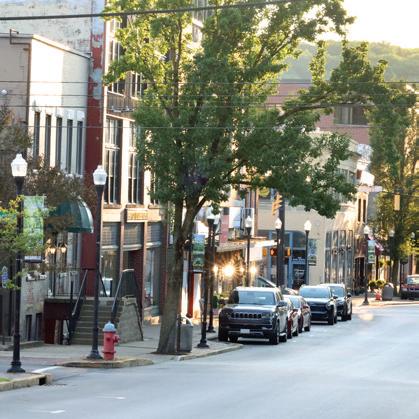


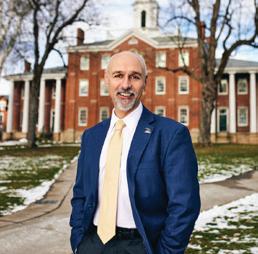
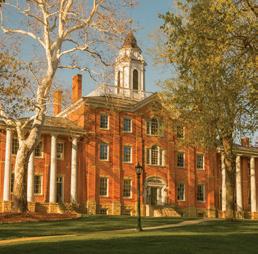

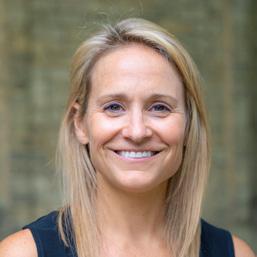
For the last 210 years, Allegheny College has been part of the Meadville community. We explore how this mutualistic bond is fostering economic growth, sustainability, and opportunity for students, faculty, and the broader community.
Many past and current participants agree that Orchesis gave them more than an opportunity to dance, citing the ability to learn about collaboration and leadership, to make new friends, and to grow their confidence. Here, past and current members share their favorite Orchesis memories through the years.
Celebrating our athletes and three PAC Championships.
20 On the Campus
Celebrations, news, and updates from Allegheny.
24 What Unites Us
Join us in championing the transformative power of Allegheny.
28 Class Notes
News and events from alumni.
44
Lauren Paulson, Ph.D., explains how the Community Impact Hub works with faculty, students, and community members to make Meadville a vibrant place to live and work.
allegheny.edu/magazine facebook.com/alleghenycollege x.com/alleghenycol youtube.com/alleghenycollege instagram.com/alleghenycollege
CHAIR, BOARD OF TRUSTEES
Steven D. Levinsky ’78
PRESIDENT
Ronald B. Cole ’87, Ph.D.
VICE PRESIDENT FOR INSTITUTIONAL ADVANCEMENT
Matthew P. Stinson
EDITOR
Heather Grubbs
ASSOCIATE ART DIRECTOR/ LEAD MAGAZINE DESIGNER
Brian Martone
CONTRIBUTORS
Penny Drexel
Phil Foxman ’90
Katheryn Frazier
Travis Larner
Sara Pineo
Jennifer Rignani
Bernadette Wilson
PHOTOGRAPHY
Derek Li
Ed Mailliard
John Mangine
Liam Michel '00
Bill Owen '74
Vivian Potts '27
Brian Rose
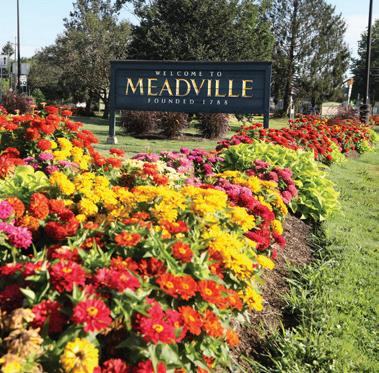
Our town is resplendent in spring.
(photo: Ed Mailliard)
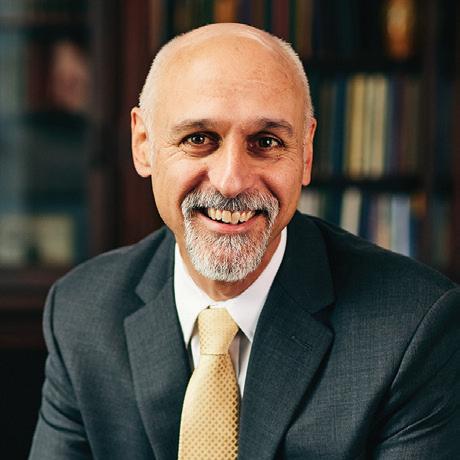
by President Ronald B. Cole ’87, Ph.D.
This time of year evokes a sense of renewal, and community and economic development align perfectly with this spirit of new beginnings. Like the new blooms that abound on campus, our Strategic Pathway continues to flourish, thanks to our students, faculty, staff, Board of Trustees, alumni, donors, and critically, our local partners.
Meadville is a place some of us have called home for decades. Others, like our latest incoming class, are discovering the bounty that the area has to offer. Focusing this issue on some of the manifestations of Goal 4 of the Strategic Pathway is a perfect metaphor for spring, because it's all about growth. Quite simply, the goal states: Allegheny College be part of and serve the greater Meadville community.
You’ll learn about a range of historic grants to the College, including the generosity of the Richard King Mellon Foundation and another source that wishes to remain anonymous who funded hallmark investments like the Meadville Community Revitalization Corporation (MCRC) and the Community Impact Hub (the Hub).
Both support efforts to build a more resilient and flourishing community. Through these collaborations, students develop a commitment to engaged citizenship.
The Hub facilitates a strategic and collaborative network of teams that includes community partners, faculty, staff, and students. It is organized around five Impact Teams: Arts and Culture, Community and Economic Development, Education and Social Development, Environment and Sustainability, and Health and Well-Being. Working together, the Hub supports capacity-building and community-improvement efforts initiated by non-profit community partners and government agencies and integrated into
the College’s curriculum and student engagement activities.
Of course, another key community investment is ALIC @ Bessemer, which brings Allegheny College’s educational mission to the community by equipping the regional workforce with the technical and operational skills needed for today’s advanced manufacturing sector. We take great pride in our relationship with manufacturing leaders in the region.
conduit for students to get deeply involved in the Meadville medical professional and patient community and for Meadville’s medical professionals to benefit from the student-eye-view of patient needs through home care. Among the many great things about hands-on, in-depth programs like this is that it allows students to discover what they may prefer to do when they graduate, which often differs from what they thought they would do.
Meadville is a place some of us have called home for decades. Others, like our latest incoming class, are discovering the bounty that the area has to offer.
In line with its commitment to northwestern Pennsylvania’s economy, ALIC @ Bessemer provides affordable, fast-track educational opportunities for non-degree-seeking students, directly addressing the workforce needs of the manufacturing community. Over the coming months and years, ALIC will expand its offerings in response to input from industry leaders and build capacity for research and business incubation, driving economic growth and long-term prosperity.
We also highlight a program that has been so successful over the last couple of decades, that several other liberal arts colleges have replicated it. The health coaching program, in partnership with the Meadville Medical Center, is the ideal
As always, we love to tell the stories of superstar alumni like Heather Fish ’15 and Andy Walker ’00, two leaders in the community who applied their stellar experience at Allegheny, putting down roots in Meadville and making a difference. Heather’s entrepreneurial spirit is breathing new life into older buildings, and Andy’s civic engagement is moving the needle on Meadville’s role in the region.
Back on campus, Orchesis is a cornerstone of the artistic side of Allegheny, which is a thriving part of who we are. The studentrun organization has been welcoming anyone who wants to express themselves through dance to join and perform. At their annual show, I always revel in the talent of the dancers, choreographers, and lighting and sound technicians. Orchesis is such a great example of the esprit de corps that makes our liberal arts college a very special place, contributing to Goal 2 of our Strategic Pathway, which is to have a vibrant and inclusive campus community.
All of these good news items and inspirational stories show the momentum of our Strategic Pathway, empowered by our In for Allegheny campaign, which is going strong. I hope that you enjoy this edition and that you will join me and so many others who are In for Allegheny!
Go Gators!
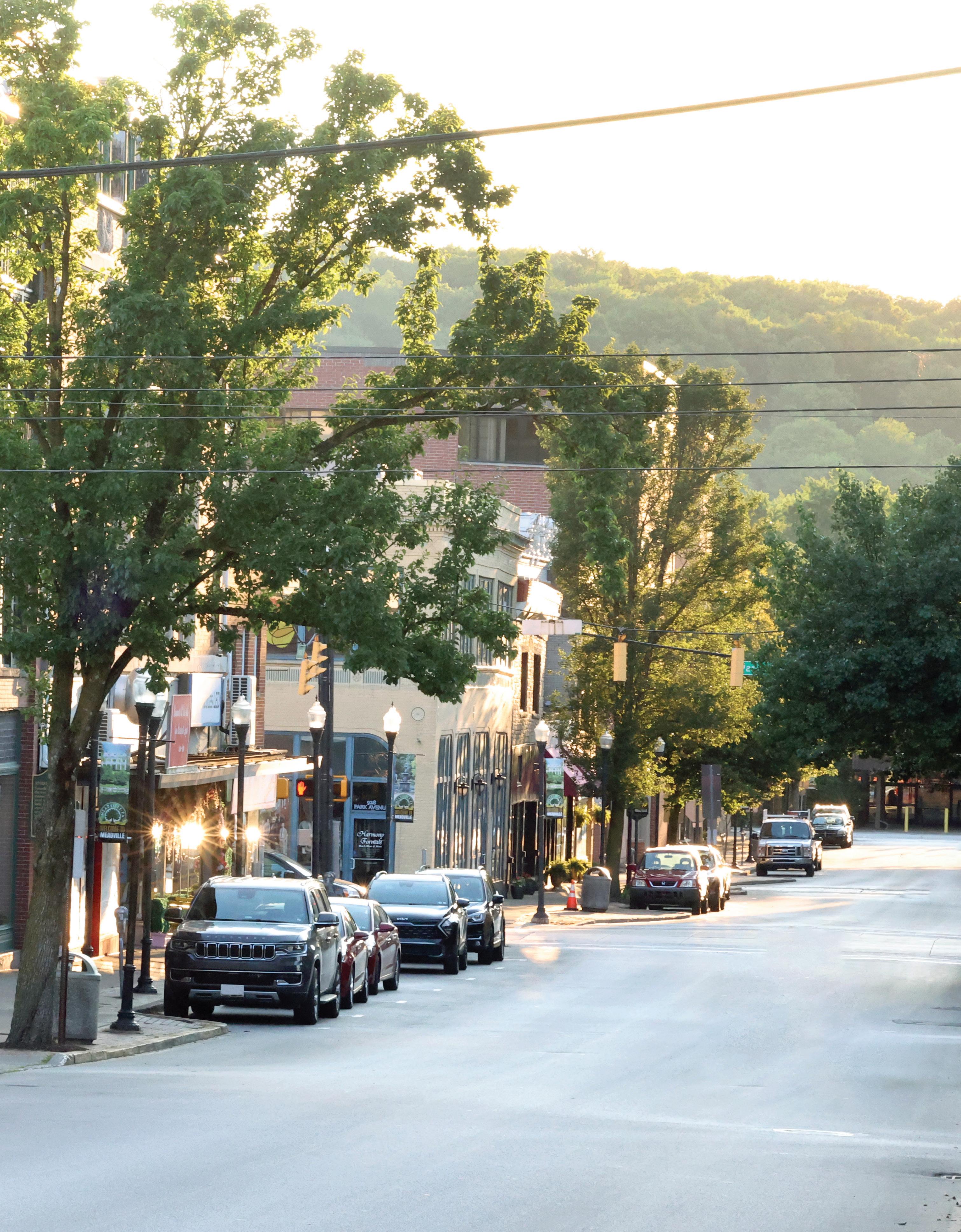
by Jennifer Rignani
Colleges and the towns they inhabit are a little like bees and flowers. Both need the other to flourish. The cross-pollination between Allegheny and Meadville delivers a diverse range of opportunities for the region and for students and faculty. The result is a healthy, resilient ecosystem for life and learning.
While investing in the community has always been a hallmark of the College, the last few years have accelerated this mutualistic bond. This is propelled by Allegheny’s landmark Strategic Pathway, wherein the fourth of five goals is as simply stated as it is part of our DNA: Allegheny will be a part of and serve the greater Meadville community
As President Ron Cole, Ph.D., ’87 wrote in an article titled “Economic Development as a Higher Education Imperative” in “Academic Leader”:
“To be successful, a commitment to economic development must be shared by campus stakeholders including the
governing board, senior administration, faculty, staff, and students, along with community stakeholders including local government, businesses, and nonprofit and service organizations. At my institution, after seeking input from each of these stakeholders, we codified our commitment to community and economic development explicitly as one of five goals in our Strategic Pathway. We know that it’s important to avoid a mindset of ‘swooping in’ to ‘save’ our town. Instead, we are part of our town and need to work alongside community partners to build capacity.”
One key to being part of the community is the people – a robust history of student involvement and alumni remaining in the region to foster growth. Also important are investments in the structures – entities within and outside the College to spur community growth. Here, we take a look at examples of both and how they are impacting the place we call home.
STRATEGIC PATHWAY

Hear more about Goal 4 from Matt Stinson, Vice President for Institutional Advancement and the Center for Career and Professional Development, and Cabinet lead for Goal 4 of the Strategic Pathway
It would take years of magazine features to illustrate the alumni talent who have been enriched by the area, calling it home and using their skills to build the community through careers in the public and private sectors. Heather Fish ’15 is just one example.
A first-generation college graduate, the environmental science major is a mover and a shaker. Her entrepreneurial spirit is complemented by a cool, edgy vibe she’s imparting to her adopted hometown of Meadville.
When Fish came to Meadville from Albuquerque, New Mexico, to attend Allegheny, a non-negotiable was the chance to get involved in the local community, which she grew up doing out West. Now 31, she considers Meadville home and is glad she stayed.
Fish says, “I would be nowhere without the Meadville community. There are so many community members who are cheerleaders for the work I'm doing.”
While at Allegheny, Fish was a member of the Bonner Program, a national network that offers students opportunities to work at local nonprofit organizations through 140 hours of service learning. The program served as a natural pathway to getting involved in Meadville. Fish says, “I was a Bonner for four years at Women's Services and then never stopped volunteering. Now I'm on the board of the organization. It really changed my life.”
She stayed in town during her first year of college and fell in love. “There was just so much to do here, especially during the summertime.”

Read President Cole's article titled “Economic Development as a Higher Education Imperative” in “Academic Leader”
The daughter of two truck drivers, Fish knows hard work. She started her Meadville career as a coffee packer at Happy Mug Coffee Co and bartender at Voodoo Brewery. At the same time, she made dozens of connections in her role as the community market coordinator for Second Saturday Community Market, a local outdoor event that runs from May through September. Fish says, “I kind of fell in love with small business. Just the idea of keeping your talents and money local has always interested me. Also, I just like a place that has character.”
Fish always loved the idea of a collaborative working space, but the closest one was in
Erie. When a local building owner launched a big idea contest, with the prize being one year of free rent, she knew she had to submit her idea. She ended up winning first place. “I guess I’m in business now,” she thought. Through the connections she’d made with makers, artists, and other creatives, she had an instant cache of people who gladly joined her new membership-based space, Foundry Co-Work. It quickly grew, enabling her to hire employees. By 2021, she rebranded it as Hatch Hollow, and now also offers an art supply retail space and art gallery.
Hatch Hollow evolved into a valued community anchor for artists, innovators, and people who embrace creativity, thrive in community, and want to see change. Fish says, “We share a desire for a more collaborative and sustainable Meadville.”
However, like most entrepreneurs, Fish knew she could do more. In 2024, she purchased her first commercial building, a 10,000-square-foot, three-story gem on Market Street. Originally built in 1890, it needs a lot of vision, a little magic, and the very ingenuity Fish has parlayed into past success. She is working with local contractors, bringing it back to life. Her goal is to build a larger version of Hatch Hollow, with a commercial commissary kitchen and an event space in an old ballroom on the third floor. She contemplates the many lives of that old ballroom, with its chipped and fading patina, and decides she’ll keep much of it “as is” to retain the character of the space.
In the spirit of collaboration, she’s applying for grants to support refurbishing the building and working with local entities, including the Meadville Community Revitalization Corporation (MCRC), which is headed by Andy Walker ’00, a natural partner. (See more about the MCRC on p. 10.) Walker says, “Heather is a respected, quiet leader. When she speaks, people listen.”
Fish is excited, but understands it won't be easy. “The building needs a lot of work. Meadville really made me fall in love with historic preservation. My mission is to respect the integrity and the history of the architecture in our area. I’ll renovate this building and stick as close to its origins, while bringing it into the modern world. I have some busy years ahead of me, but I'm kind of used to it by now.”
I would be nowhere without the Meadville community. There are so many community members who are cheerleaders for the work I'm doing.
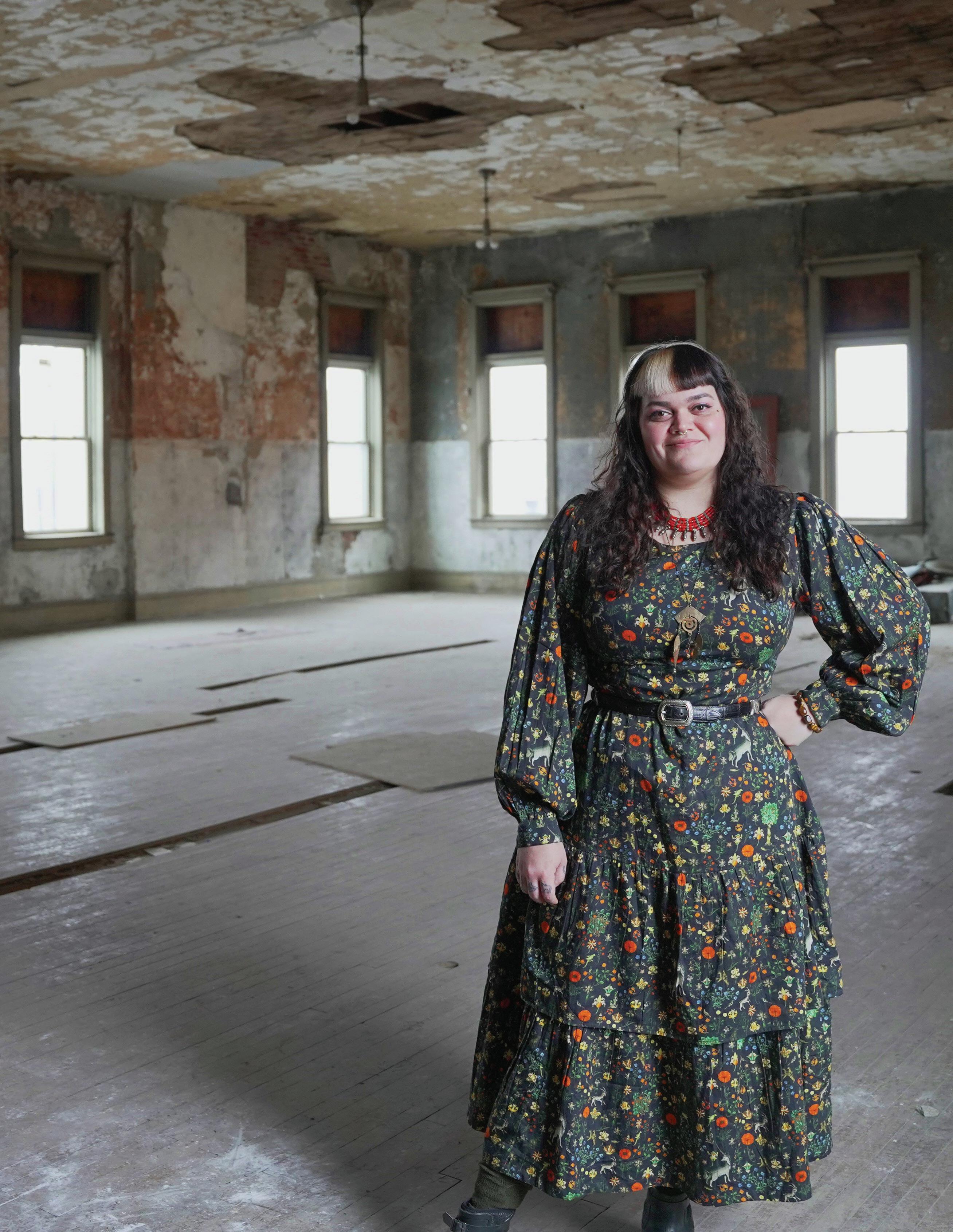
The Hub is a vital component of academic programs, providing our students with experiences working with government and nonprofit organizations as they engage with faculty and community mentors to make Meadville a vibrant place to live and work.
JenniferDearden, DMA
Provost and Dean of the Faculty
LEARN MORE ABOUT THE COMMUNITY IMPACT HUB


A stroll through the College archives illustrates the deep connections between the College and the community. There are cultural, physical, and programmatic manifestations throughout the region. One of the newest examples of the rich tradition of community engagement is the Community Impact Hub (the Hub).
The Hub is the result of years of tenacious work and relationship-building that initially started as a pilot project in 2018 with leadership from then Associate Provost Terry Bensel, Ph.D. The Hub expanded in fall 2024 through a $15 million grant Allegheny received from a source that wishes to remain anonymous. Bensel says, “The evolution of the Hub revolved around a series of meetings with community partners, students, and faculty experienced in (or interested in learning about) communityengaged class projects and research. Those discussions focused on what was useful and beneficial about community-based learning, the challenges in doing this kind of work, and what the College might do to help faculty overcome those challenges. This provided a blueprint for a grant request to fund an initiative to promote and enhance community-based learning at Allegheny.”
The grant provides immediately expendable funding to support first-year operations and a generous endowment of nearly $14 million to ensure the work of the Hub in perpetuity. The Hub facilitates a strategic and collaborative network of teams that include
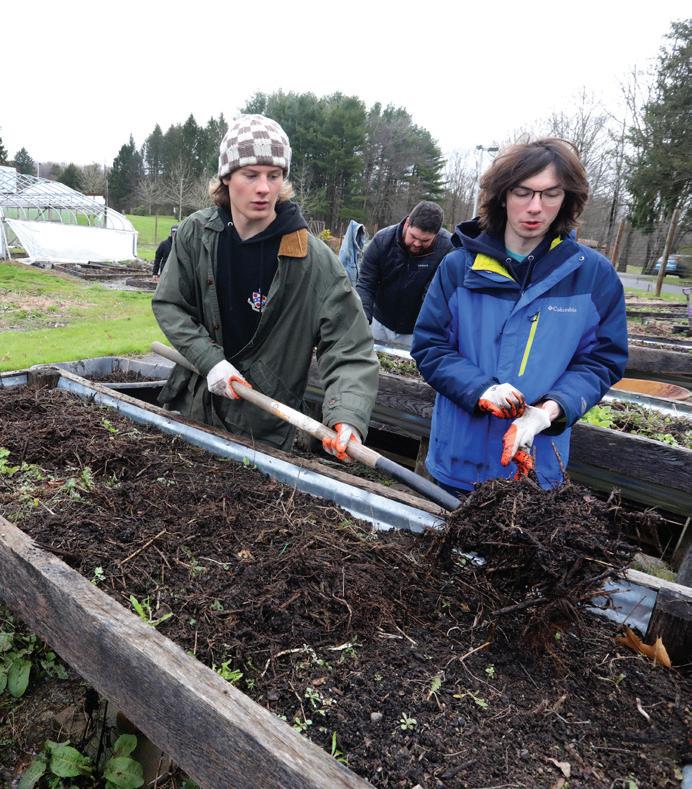
community partners, faculty, staff, and students. It is organized around five Impact Teams: Arts and Culture, Community and Economic Development, Education and Social Development, Environment and Sustainability, and Health and Well-Being. Working together under a “Collective Impact” model, the Hub supports regional capacitybuilding and community improvement efforts initiated by community partners and integrated into the College’s curriculum and student engagement activities.
“The Hub is a vital component of academic programs, providing our students with experiences working with government and nonprofit organizations as they engage with faculty and community mentors to make Meadville a vibrant place to live and work,” says Provost and Dean of the Faculty Jennifer Dearden, DMA.
As part of the grant, approximately $100,000 will be awarded to nonprofits and community organizations annually through the Hub and the five Impact Teams. With mentoring from experienced community practitioners and faculty, students are exposed during the summer and academic year to real-world complexities and grand challenges faced by all communities, allowing them to apply their knowledge in practical settings, develop leadership skills, cultivate a more profound commitment to engaged citizenship, and explore potential post-graduation life paths.
A long-standing opportunity for students to explore their connections with the community is through Allegheny’s Health Coaching program. The program imparts practical skills and compels graduates to stay locally. Working with Meadville Medical Center, students spend one semester learning about chronic disease management, the social determinants of health, and the local resources for patients. Instrumental in developing this program were Barry Bittman, M.D., former Meadville Medical Center chief innovation officer; Kirsten Peterson, associate director, Pre-Professional Advising; and Steven Farrelly-Jackson, associate professor.
After completing their first semester, students are assigned to a patient with whom they meet weekly. The program keeps patients out of the hospital (or reduces
admissions), helps them stay as healthy as possible, and helps keep them in their homes.
For example, students become the eyes and ears of the professional medical community, noticing when someone's confusion is getting worse, when they are not taking their medication regularly, or when a nurse needs to visit to assess a situation. The bond that forms is often a strong one, and patients are often more likely to share their concerns with a health coach.
Peterson says, “The experience is invaluable. The students learn firsthand that healthcare is more than tests and prescriptions. They participate in a model of care that demonstrates interprofessional cooperation. Our students start their professional training having already experienced it.”
The program strengthens the town/ gown relationship. The patients get to know college students in positive situations. I know of a couple who attended their coach's graduation. It sounds a bit grand, but coaches help keep the community healthier.
KirstenPeterson
Associate Director, Pre-Professional Advising
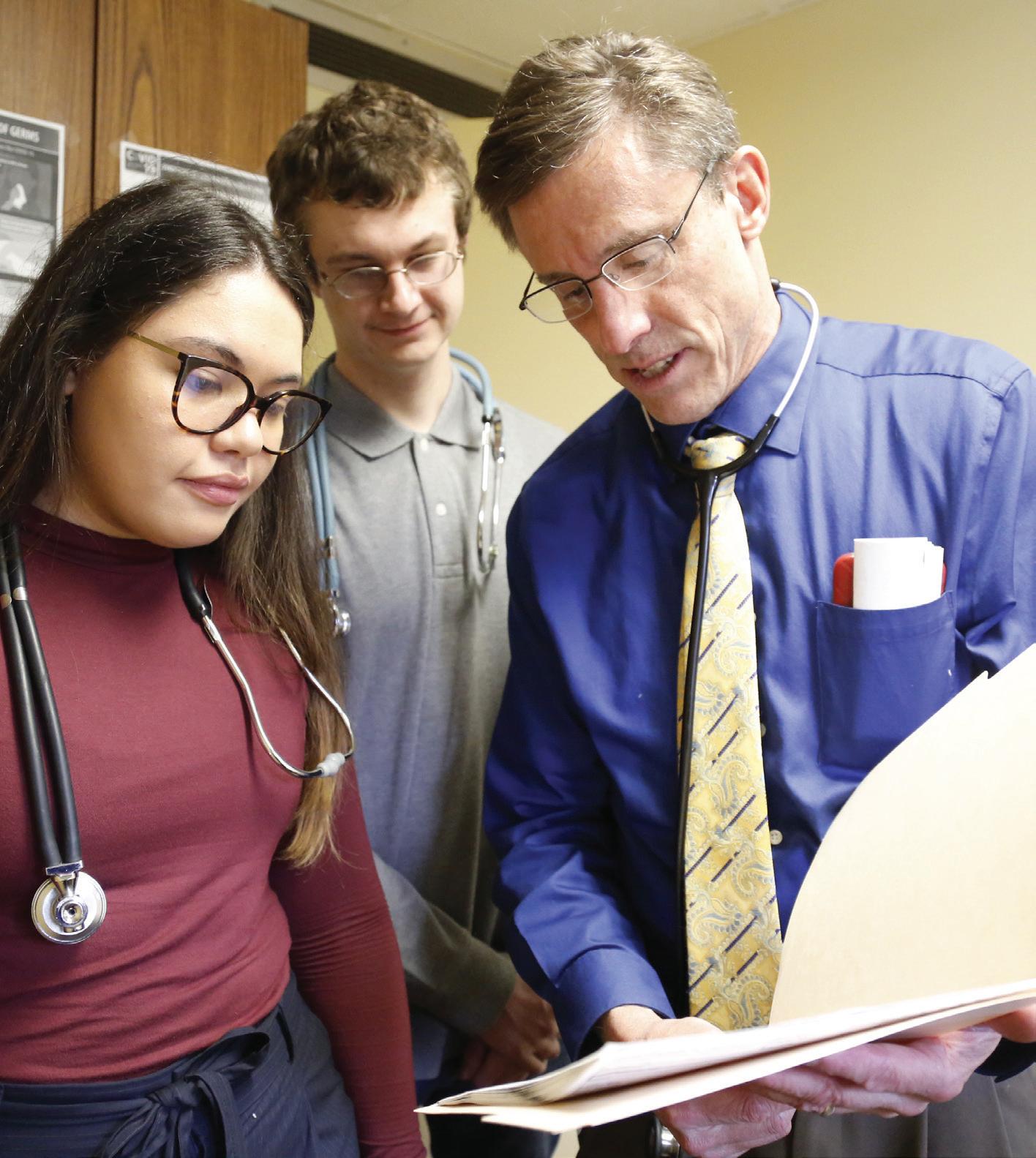
LEARN MORE ABOUT HEALTH COACHING and complementary major and minor programs

Last year, Allegheny received a $1 million grant from the Richard King Mellon Foundation to accelerate the initial redevelopment activities of the Meadville Community Revitalization Corporation (MCRC). The MCRC is an independent nonprofit organization that aims to better understand the challenges and opportunities facing Meadville’s Central Business District and to develop a vision and multi-year strategy to improve and advance a vibrant downtown. The grant is helping the MCRC hire key staff, prepare and introduce a range of programming to activate and revitalize downtown Meadville, set up a BUILD Meadville Development Fund, and establish a comprehensive fundraising strategy for the future.
Allegheny began its collaboration with the City of Meadville to bolster downtown revitalization and development to become a strong economic anchor two years ago with a planning grant from the foundation. This investment enabled the new entity to organize and gather stakeholders and build on prior work under the guidance of
Andy Walker ’00, a Meadville community leader who, as an Allegheny employee, has been contracted by MCRC to serve as its executive director.
Key partners in the work were Meadville City Mayor Jaime Kinder, members of City Council, and Crawford County Commissioners, including alumni Christopher Seeley ’10 (recipient of the 2024 Alumni Citation), Autumn Vogel ’15, and Jim Roha ’74.
“One of the key commitments of Allegheny College’s Strategic Pathway is to grow capacity for long-term improvements and collaborative initiatives with community partners for local and regional economic development,” says President Cole. “The resources provided by the Richard King Mellon Foundation are helping the Meadville Community Revitalization Corporation continue to build a vital downtown that meets the needs of current and future residents and businesses, draws talent to our region, and serves as a destination for our students, families, and visitors.”
From its very founding, urged on by town citizens, Allegheny College and Meadville have existed as partners. Buildings and institutions stand witness to this, but even more important has been the intertwining of the lives of faculty, staff, and alumni with their fellow town dwellers. Together they have made the community and college stronger.
JonathanE.Helmreich, Ph.D.
Professor Emeritus of History
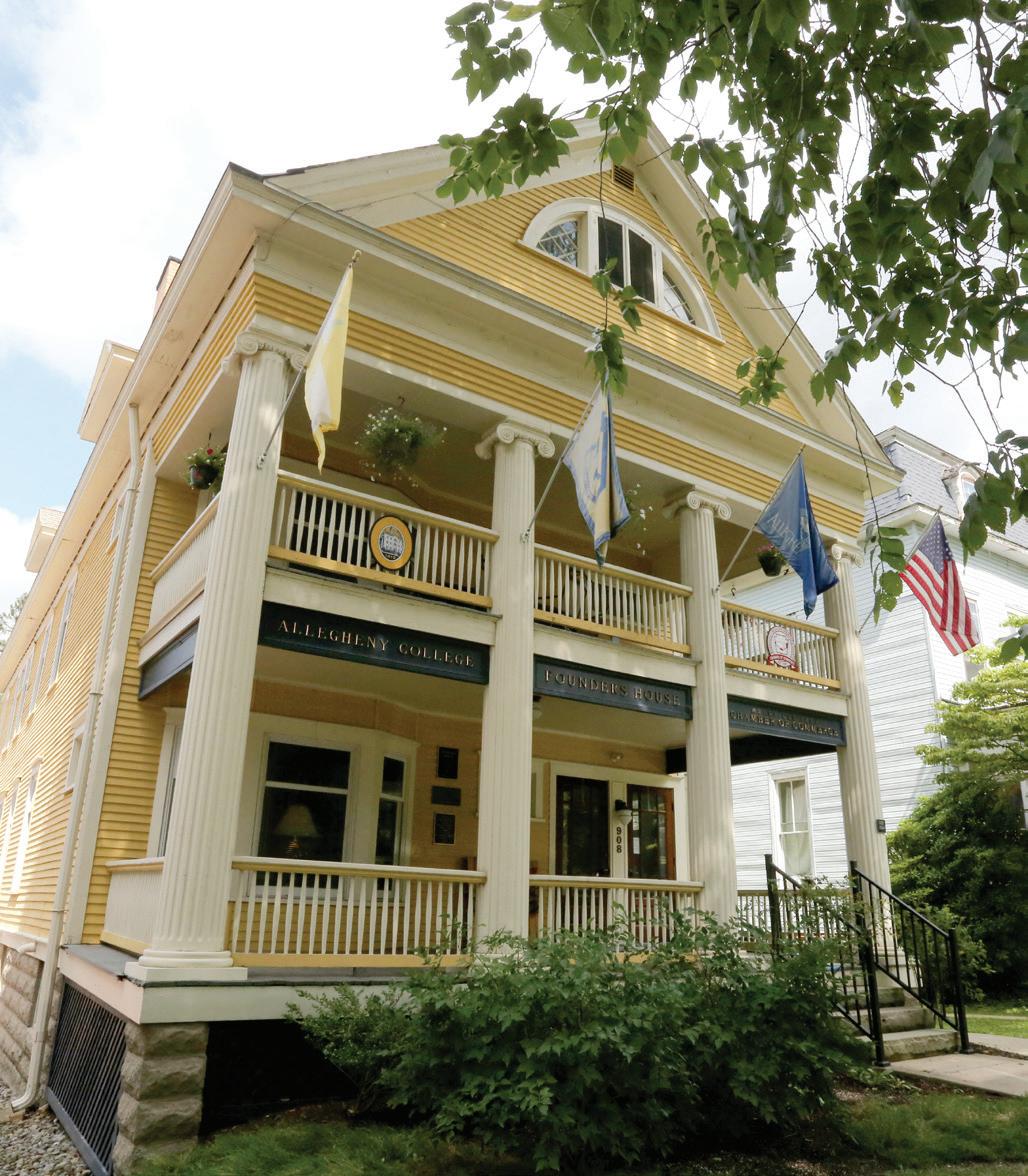
In 2008, Allegheny purchased the property at 908 Diamond Park, on which once stood the log courthouse where Allegheny College was founded. At that time, Allegheny’s Board of Trustees announced that the property would be named the Founders House in honor of former Allegheny President Richard J. Cook and Teresa M. Lahti. Cook and Lahti made strengthening the bonds between the community and the College one of the cornerstones of their work in Meadville.
Melding the mission and vision of a liberal arts college and the mission and vision of a region works best when those two complex entities are on the same page from the start. Allegheny could not have imagined incorporating the opportunities that modern manufacturing presents for our students, and for the bright future it can offer the region. As to the role the College would play, the Economic Progress Alliance of Crawford County was absolutely essential.
Recognized as a premier economic development organization in the Commonwealth, the Economic Progress Alliance promotes and enables sustainable economic growth with strengthening, expanding, or locating businesses in Crawford County. President Cole said, “We simply would not have the Allegheny Lab for Innovation & Creativity (ALIC) were it not for the shared vision and support of Executive Director Jim Becker and of course, Allegheny alumna and Deputy Director Angela Pero Annibale ’03.”
In 2023, Allegheny launched ALIC @ Bessemer, an expansion of the on-campus ALIC, to bring workforce development and education resources into the community. ALIC @ Bessemer, located on the Economic Progress Alliance campus on Bessemer Street in Meadville, is a collaborative learning, research, and fabrication space to equip the regional workforce with cuttingedge skills and serves undergraduate students with high-impact educational experiences alongside community members and industry partners.
With leadership from Assistant Provost of Academic Innovation Byron Rich, the three-
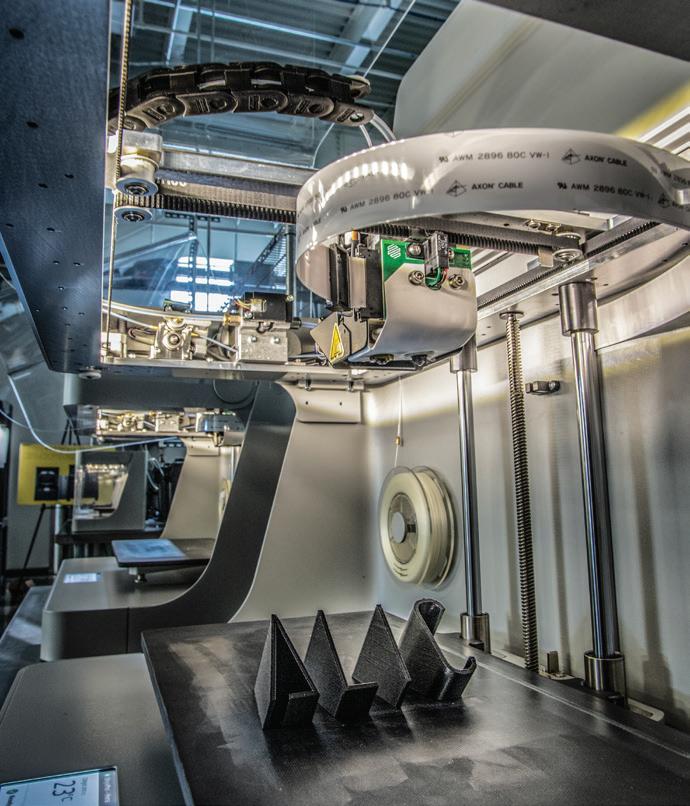
story space is designed to mimic a real-world environment, providing off-site training and onboarding opportunities for industry partners. The facility is outfitted with advanced manufacturing equipment such as a 5-axis CNC machine, multi-material 3D printers for additive manufacturing, automation technologies, quality assurance technologies, and computer labs with digital design software, which were selected based on input from over 25 organizations across Western Pennsylvania.
In partnership with the regional precision manufacturing industry, Allegheny will play a central role in the economic resurgence of Northwestern Pennsylvania in response to the over 20% growth in the aerospace, research, and information technology industries in recent years, combined with a decline in skilled workers for these positions. ALIC @ Bessemer will equip the regional workforce to adapt to emerging technological development and advances in business operations and help businesses future-proof by providing research and development opportunities.
“Our partnerships with the region’s precision manufacturing industries are unique for a liberal arts college and empower what we can accomplish through collaboration,” says President Cole. “We look forward to our continued work with industry partners to meet the workforce needs of our region with an infusion of liberal arts learning and to provide our undergraduate students with unique research opportunities to build skills for the future.”
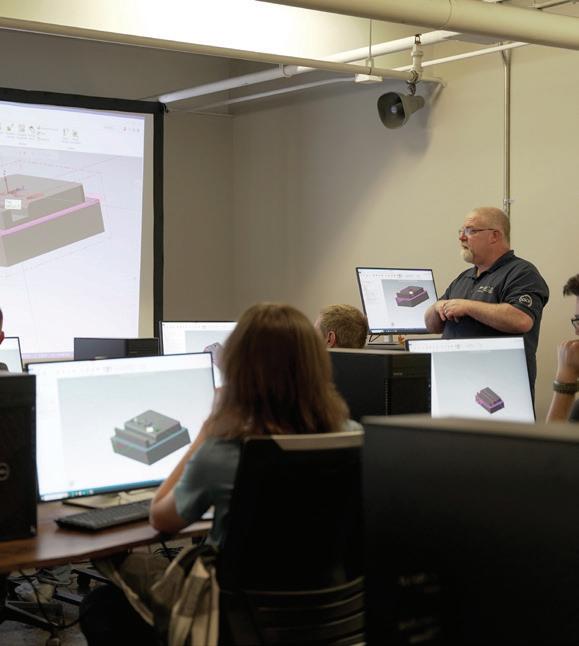
Our
partnerships with the region’s precision manufacturing industries
are unique for a
and
liberal arts college
empower what we can accomplish through collaboration. We look forward to our continued work with industry partners to meet the workforce needs of our region with an infusion of liberal arts learning and to provide our undergraduate students with unique research opportunities to build skills for the future.
RonCole, Ph.D.
President
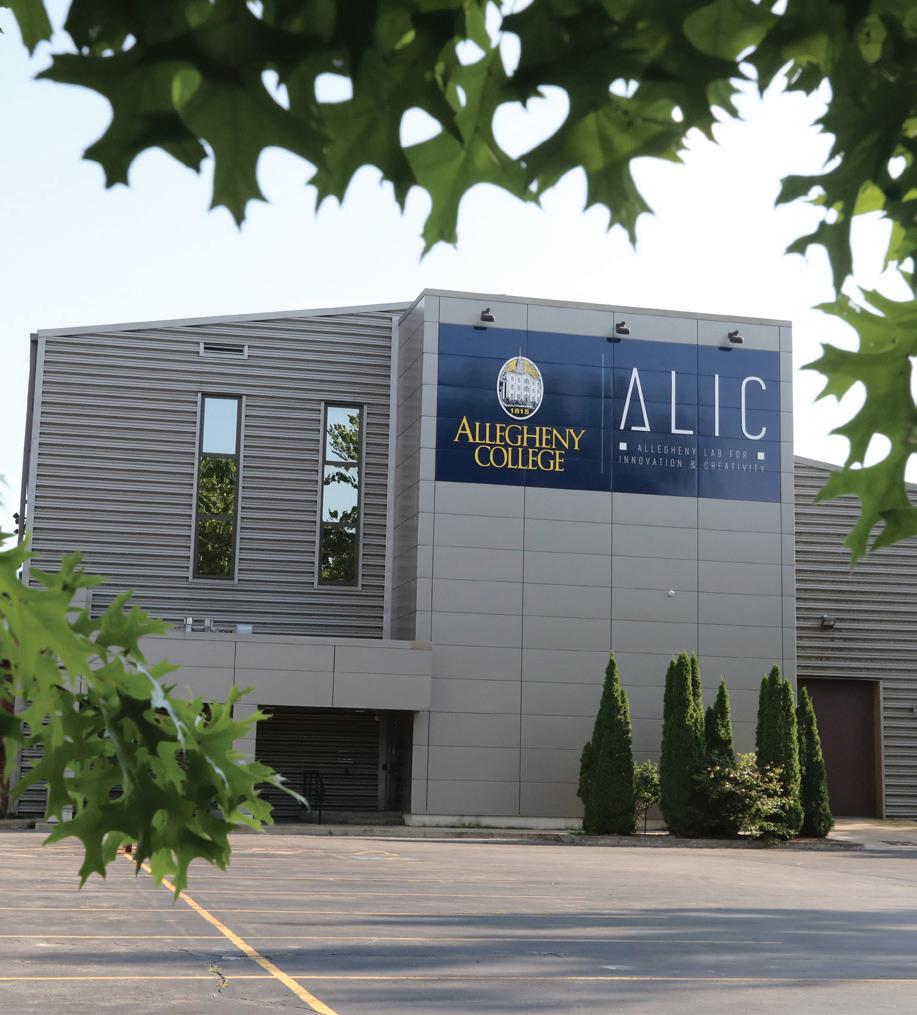
An award-winning, nationally recognized program, the Watershed Conservation Research Center (WCRC) is co-directed by Associate Professor of Environmental Science & Sustainability Casey BradshawWilson, Ph.D., and Assistant Professor of Environmental Science & Sustainability Kelly Pearce, Ph.D., and has had a lasting impact on the area. The WCRC was established in 2021 through a generous grant of $1,250,000 from the Richard King Mellon Foundation, and its work has been further sustained and supported by an additional grant from the foundation, in the amount of nearly $935,000, in December 2024.
This meaningful program engages Allegheny undergraduates in conservation-based research projects where they gain fieldbased skills training that helps prepare them for graduate school or conservation-related careers. Students are trained to become stewards of water resources with the goal of producing graduates who will protect watersheds not only in western Pennsylvania, but around the world.
Pearce says, “Students who work with the WCRC have opportunities to present at regional and national conferences, learn techniques and skills that relate directly to working in the field of conservation, and interact with WCRC community partners and landowners. What our graduates do with the education, hands-on training, experiences, and knowledge they gain through the WCRC has far-reaching implications.”
Located on Allegheny’s campus, the WCRC engages in strategic conservation activities and trains future watershed stewards to protect, restore, and enhance our land and water resources for future generations in the upper Allegheny River basin, focusing on the French Creek Watershed.
WCRC is essential to the French Creek Watershed, celebrated as Pennsylvania’s most biologically diverse stream. This natural resource is home to a vast diversity of wildlife, yet there’s still much to learn about the species that call it home.
Research gaps remain when it comes to tracking population trends, understanding the impacts of invasive species and land use changes, and evaluating the success of restoration efforts. The WCRC is working to fill these gaps through strategic conservation research that deepens our understanding of both land and water organisms.
The program supports student-faculty projects and initiatives that:
• Advance knowledge to aid in the protection of aquatic and terrestrial wildlife species and/or habitats with the French Creek Watershed
• Educate or create awareness of the ecological, economic, or intrinsic importance of the French Creek Watershed
• Aim to better understand the cultural, political, economic, and/or ecological value of the French Creek Watershed for regional communities/economies
“By collaborating with local partners, we not only share knowledge and resources but also take meaningful action to protect and restore French Creek’s habitats. For example, our stream restoration projects improve water quality and create healthier environments for native species to thrive.” says Pearce. Through science-driven conservation and community partnerships, WCRC is ensuring a future where French Creek remains a stronghold of biodiversity and a healthy watershed for those living and recreating in the French Creek watershed.
Key partners in this program include: Brian Pilarcik, Crawford County Conservation District; Brenda Baker Costa ’94, French Creek Valley Conservancy; Annie Maloney, Foundation for Sustainable Forests; and Matt Kaunert ’11, Clean Water Institute, Lycoming College.
Through science-driven conservation and community partnerships, WCRC is ensuring a future where French Creek remains a stronghold of biodiversity and a healthy watershed for those living and recreating in the French Creek watershed.

By collaborating with local partners, we not only share knowledge and resources but also take meaningful action to protect and restore French Creek’s habitats. For example, our stream restoration projects improve water quality and create healthier environments for native species to thrive.
KellyPearce, Ph.D.
Assistant
Professor of Environmental Science & Sustainability
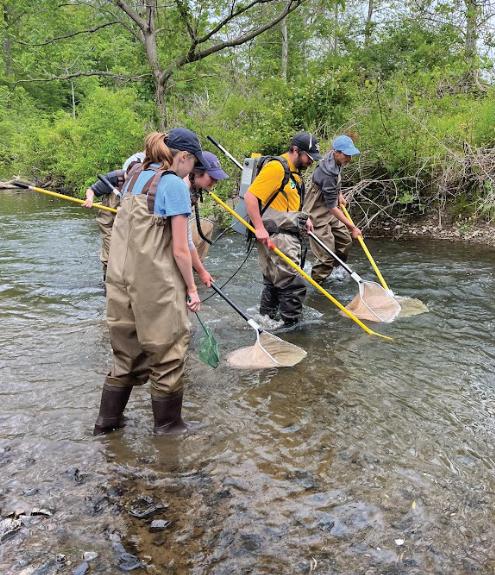
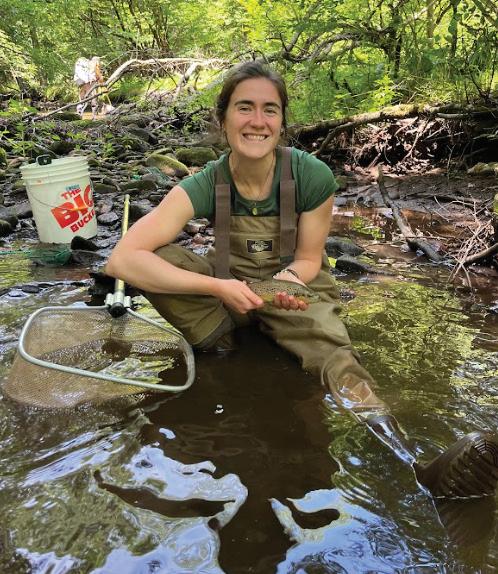

Like organisms in a mutualistic relationship that evolve together, Allegheny and Meadville will always adapt to the ever-changing environment – in every sense of that word – and grow in a way that benefits both.
Bees to flowers, nectar to pollen, we will continue to grow with the region. President Cole notes, “Demonstrating that higher ed is part of economic development can foster a paradigm shift in how a college or university is perceived, dismantling the ivory tower. There are mutual benefits to our college and the town, such as helping to attract new students and employees with a vibrant community while providing high-impact practices and career readiness for students.”
We understand that when our community flourishes, so does Allegheny College. Improving the quality of life in Meadville also improves the quality of life for our students, faculty, and staff. As goes Meadville, so goes Allegheny College.

What started as a call for dancers in a 1943 ad for a new modern dance club in The Campus newspaper has grown into a thriving performance-based dance company with more than 100 members each year.
Orchesis, a student-run organization that welcomes anyone to dance, holds yearly shows in the fall where all dancers, choreographers, and lighting and sound technicians are recognized for their hard work and creativity. The group contributes each year to an inclusive and vibrant campus. Every aspect of the show is student-designed, with productions showcasing multiple dance pieces and a variety of dance styles
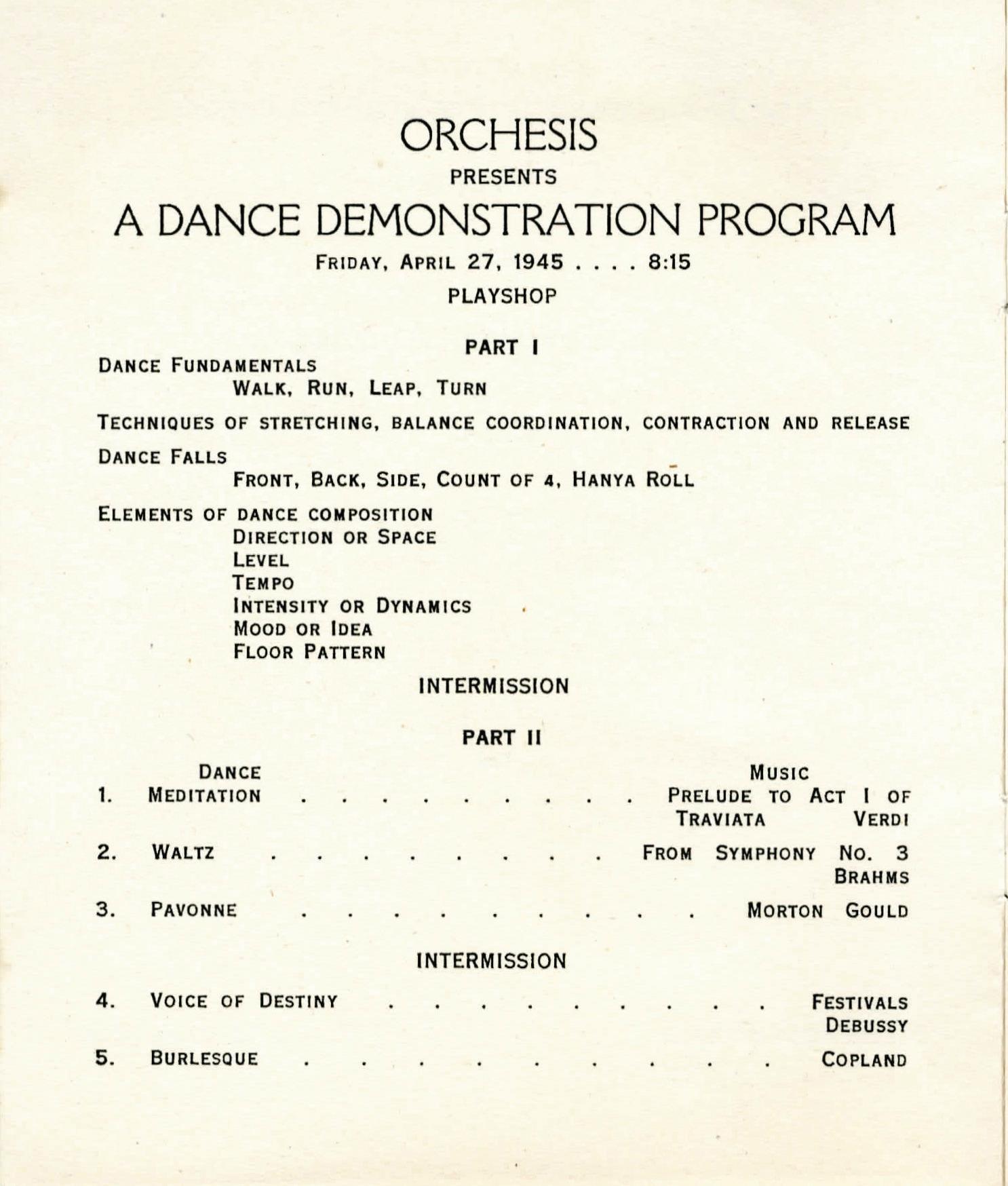
that have evolved through the years, including ballet, contemporary, lyrical, modern, hip hop, jazz, and tap. Also evolving are the dance numbers, which have ranged from one of the group’s first numbers, “Peter and the Wolf” by Sergei Prokofiev, to “Tiny Dancer” by Elton John and “What About Us” by P!nk.
Many past and current participants agree that Orchesis gave them more than an opportunity to dance, citing the ability to learn about collaboration and leadership, to make new friends, and to grow their confidence. Here, past and current members share their favorite Orchesis memories through the years.
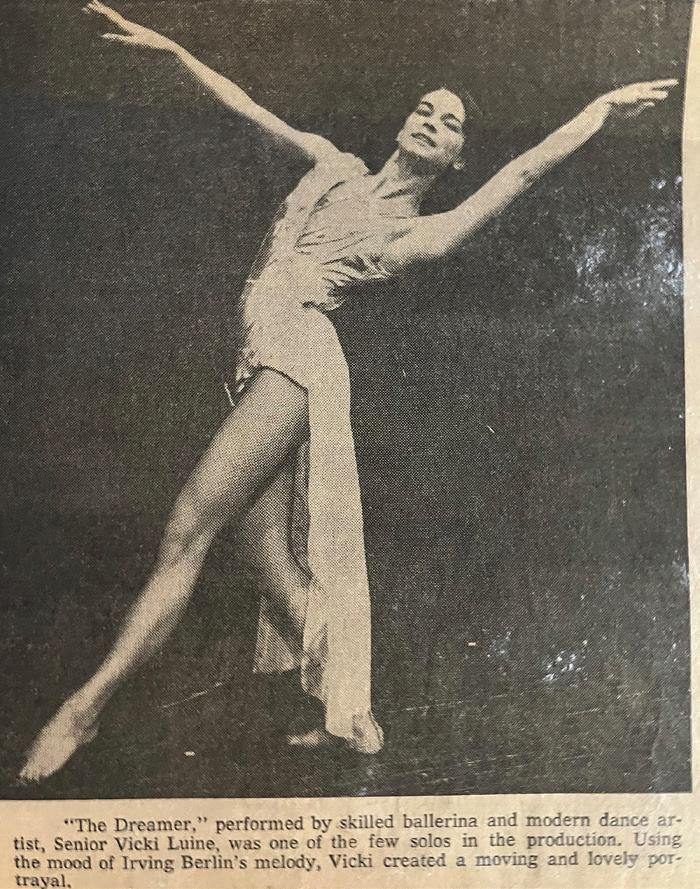
“The
“My roommate (Christine Herbst ’68) and I danced a duet senior year. In September 1964, during my first term as a freshman, I took a modern dance class from Elinor McGrath. Working with her became a passion, and I continued to audit the class, although only one course was required. I didn’t make my first competition but was encouraged to try again and made it. Unfortunately, Miss McGrath had to leave due to illness midyear and never finished our recital choreography. I remember the fragments of our finale to this day. Orchesis was a highlight of my college years, and I still work out in the tights (leggings) from those years!”
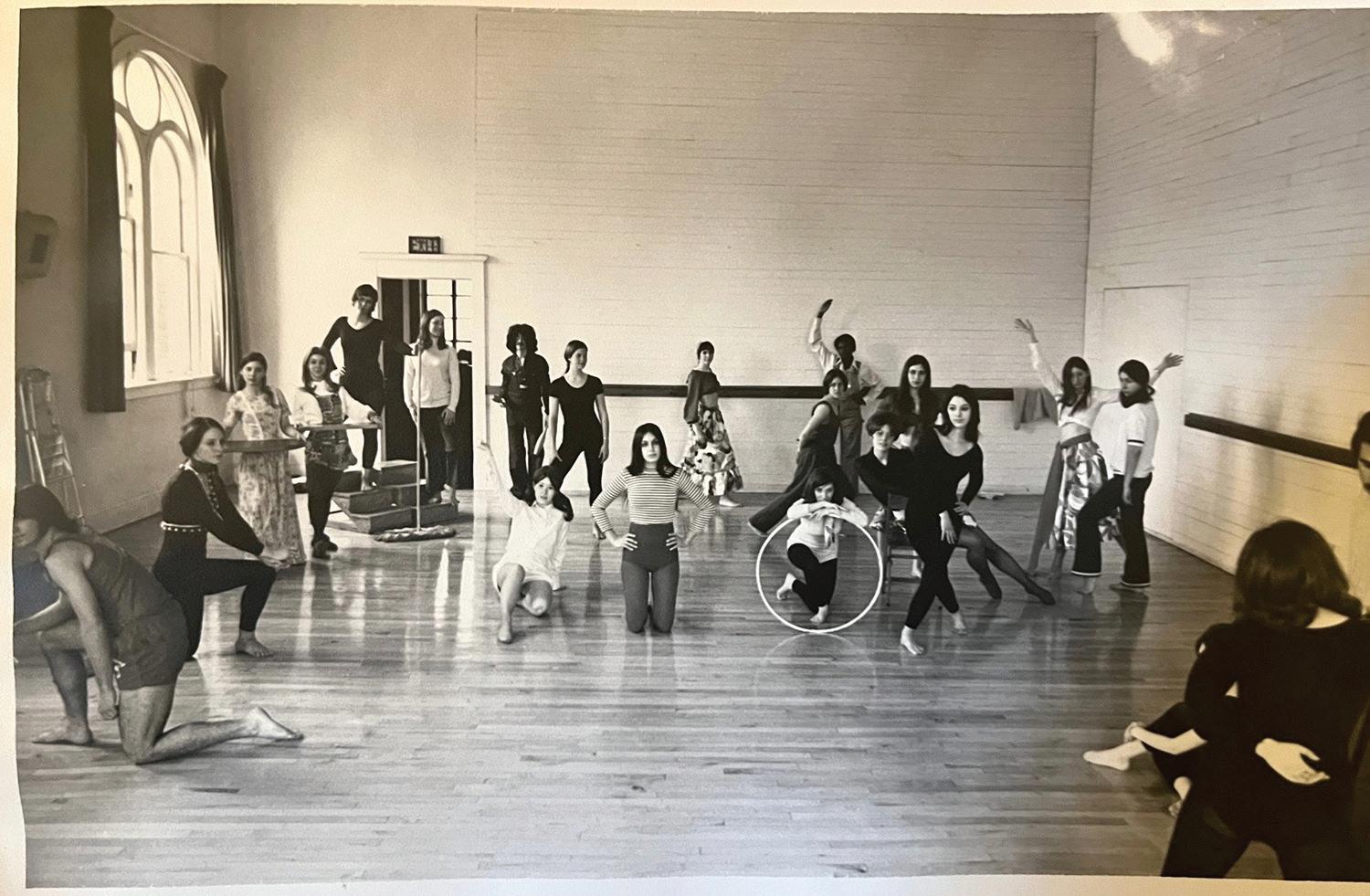
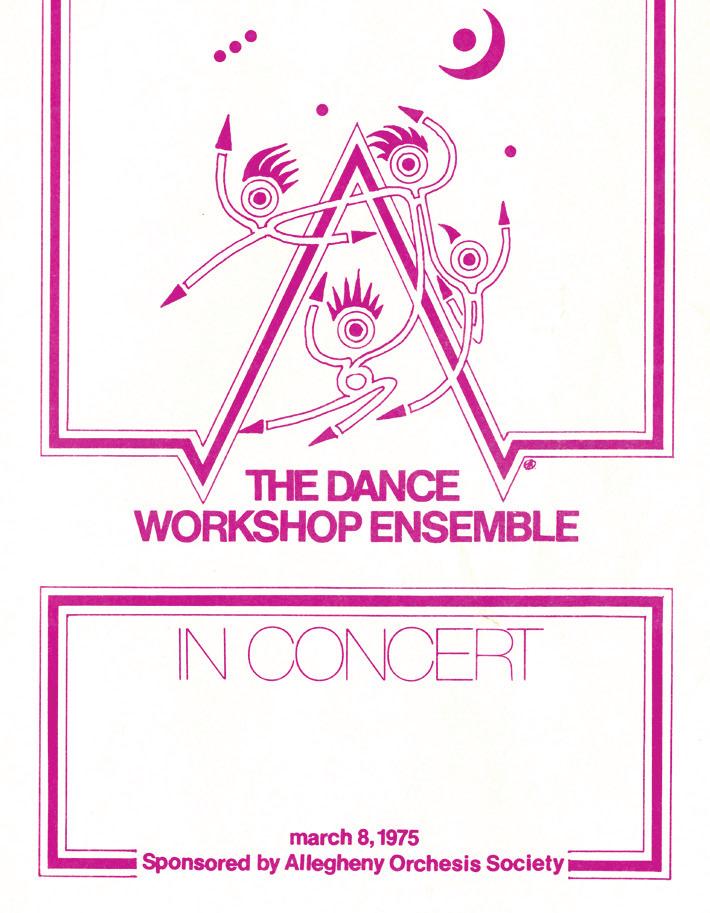
“I was part of Orchesis during all four of my undergraduate years at Allegheny (1967-1971), serving as president during the 1969-1970 school year. Orchesis and dancing played a significant role in helping me get through those four years! And, I still continue to dance to this day, currently taking seven hours of ballet, tap, jazz, and modern classes each week. I will once again perform in The Silver City Dance Center's recital this June, which also means I will once again own costumes no woman my age should be caught dead in.”
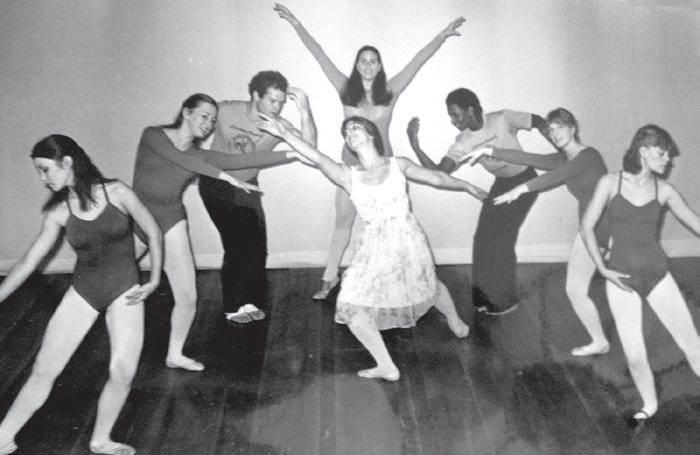
“Orchesis allowed me to reconnect with my experience as a professional ballet dancer while immersed in the world of academia. Music, movement, and people made this community the best place to spend time outside of class.”
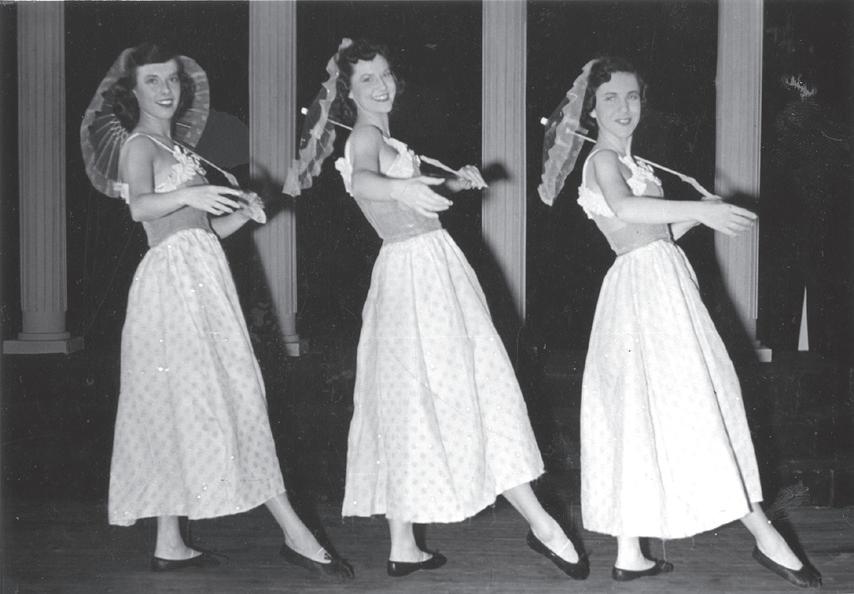
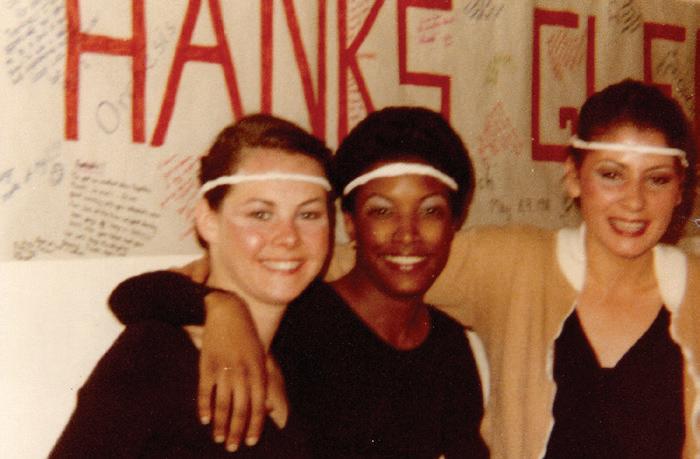
Memorable song: “Sultans of Swing” by Dire Straits
“Orchesis gave students an opportunity to dance and perform. Our class was lucky to have Glenn Ford Good ’81 as our artistic muse and most gifted dancer. I remember his senior concert featuring the music of Dire Straits. The auditorium was alive with joy and movement! After graduation, Glenn went on to dance professionally in NYC. Sadly, we lost Glenn before we were 30. His memory lives on in all who knew him and had the chance to dance with and for him!” 1949
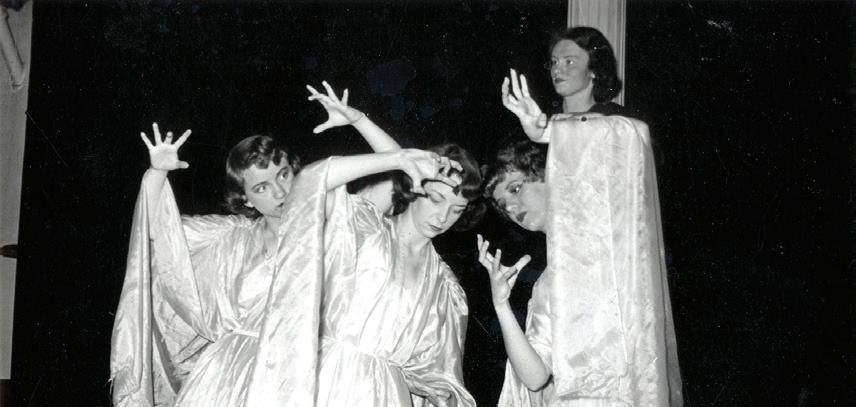
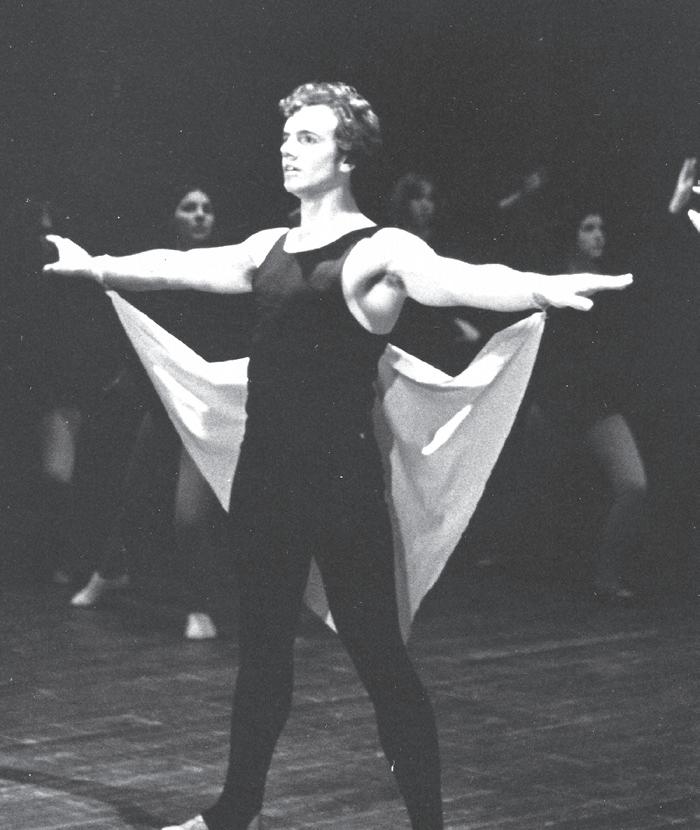
Michael McStraw in a rehearsal for “Jonathan Livingston Seagull.”
Memorable song: “Anything” by Ronnie Laws (My dance partner and dear friend, Marjie Najac ’78, opened my heart to his music.)
“There remains for me one Orchesis memory that captures that singular moment when I knew dance would fill my life. In the fall of 1977, I was cast as Fletcher in a production of ‘Jonathan Livingston Seagull,’ alongside Don Delach ’79 in the titular role. My first entrance as Fletcher was a full, powerful, low-to-the-earth run that took me across the Campus Center stage in an arc from the upstage right wing to stand next to my best friend, Jonathan, downstage left. That burst onto stage, which lasted no more than two seconds, was soaring, breathtaking, majestic, and exhilarating. With that entrance, I experienced the transformational intersection of commitment, practice, purpose, and freedom that is the essence of dance. I am forever grateful for Orchesis and the treasured opportunities the organization provided.”
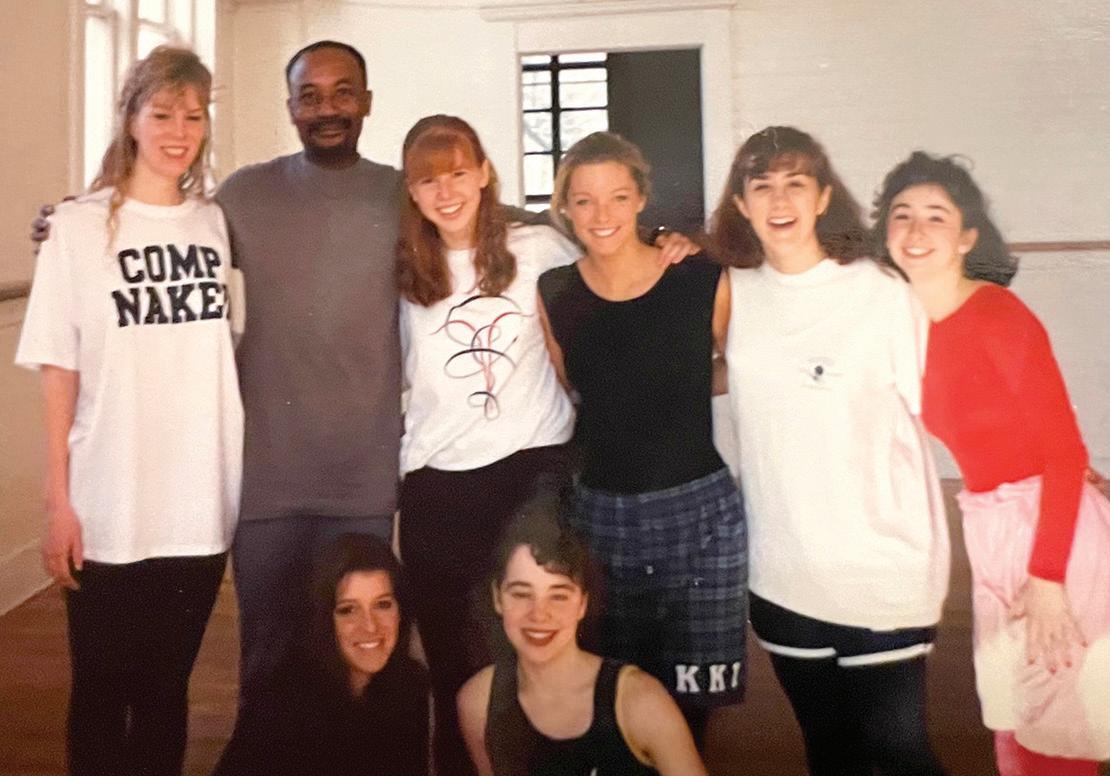
Memorable songs: “Brown Rice” by Shadowfax, “Boat on the River” by Styx, “Kashmir” by Led Zeppelin, and “Blasphemous Rumours” by Depeche Mode
“Orchesis was the only student-run dance club during my time on campus. It was a great outlet for students who wanted to perform and choreograph various styles of dance. During my time, we brought a guest artist to campus with the support of the Dance Department, CORIS, and The Black History Month Committee. Professional dancer Howard Lucas provided master classes in jazz dance and gave a lecture on the history of jazz dance. We also would combine with the International Club each fall to present the International Dance Festival. International students would teach various dance styles or traditional dances from their home countries, and we would all perform them. I enjoyed learning a traditional Pakistani wedding dance as well as belly dancing. Orchesis was a fulfilling experience for me as a dancer, performer, and choreographer. Orchesis was a great organization to be a part of and has given me many wonderful college memories. I have also had the honor of watching my daughter, Sara ’26, continue the tradition of being a dancer and choreographer for Orchesis. I am so happy to see Orchesis continue as a successful organization that provides an artistic outlet for the students.”
Memorable song: “New Kids on the Block Medley”
“Orchesis was EVERYTHING to me during my four years at Allegheny. In my opinion, there was no other organization that brought so many people together from different walks of life. Whether you had a background in dance or were trying it for the first time, you could participate. In my choreographed piece my junior year, I had a dance club scene in the background that gave ANYONE the chance to be on stage. It was so much fun seeing it all come together with the work of the amazing lighting and stage crew members! And having so many people come to watch the shows — just fantastic! Those performances were definitely the highlight of my time at Allegheny.”
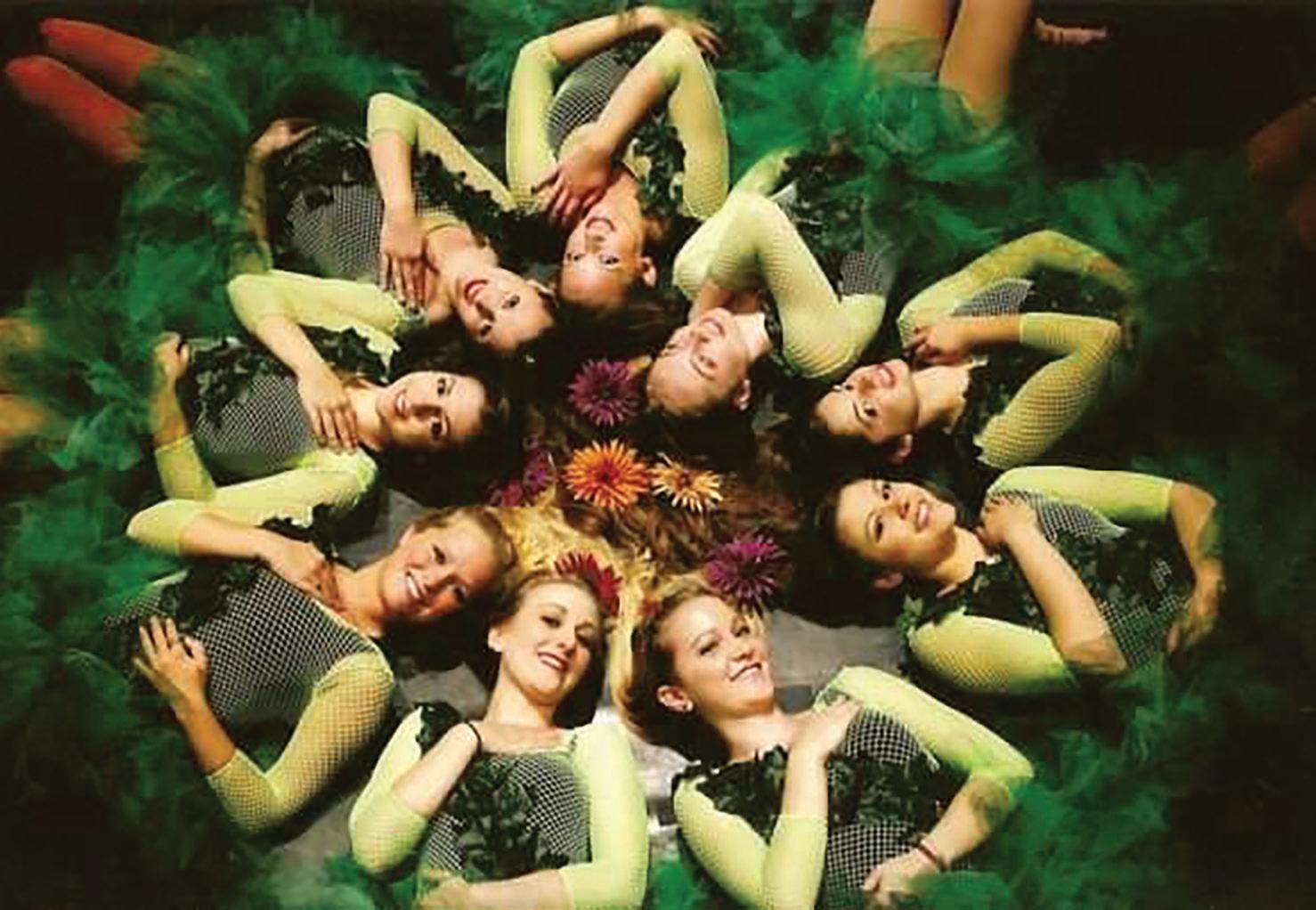
Memorable song: “I Know You Want Me (Calle
“The years I danced in Orchesis were some of the best, most stressful Novembers of my life. I served as a choreographer for three years, was on the board for two years, and was also the 2010 president. Back then, Orchesis and its legacy were larger than life. It was the main event of the first semester. From auditions in September through opening night in November, the buildup and camaraderie were unmatched. Looking back, our shows and the talent within them were quite impressive for being an entirely student-run organization at a school with only a dance minor. More than anything, Orchesis helped me become more versatile as a dancer and refined my leadership skills. From hip hop to lyrical, to ballroom, to tap (in straight jackets!), we did it all. After graduation, I went on to become a professional dancer for a decade in NYC and Vegas and was also the dance captain for Norwegian Cruise Lines; I like to think that Orchesis had a small part in that. To the hundreds of dancers I ever shared a stage with over my four years in Orchesis, I see you, love you, and hope you are absolutely killing it in life, just like you did on stage. Xoxo!”

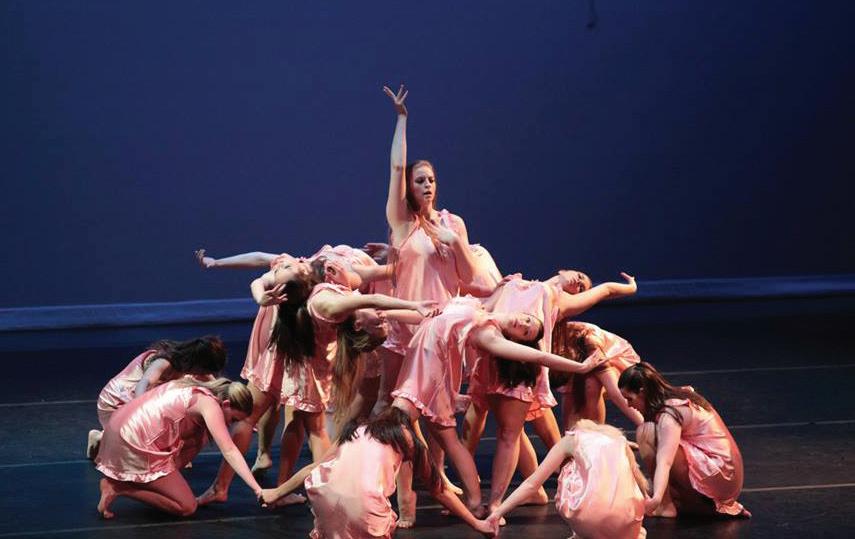
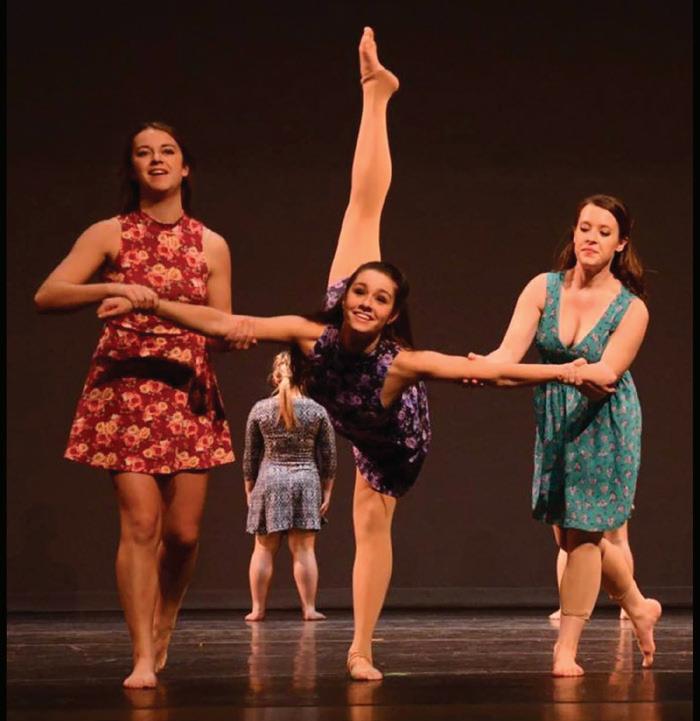
song: “Cell Block Tango” of “Chicago”
“I think for a lot of dancers, you give it your all through high school, and then, when you graduate, there can very suddenly be a halt to all things dance. Studios aren’t really built for adult dancers, and teaching doesn’t provide the same outlets to perform the way dancers are used to. Orchesis was the perfect outlet for those of us who still loved to dance, couldn’t imagine life without it, and wanted to extend that creative outlet beyond high school. Working with your peers to create a performance was so special, and Orchesis instantly became a family of passionate folks who still loved to dance. It was one of the most special spaces at Allegheny for me.”
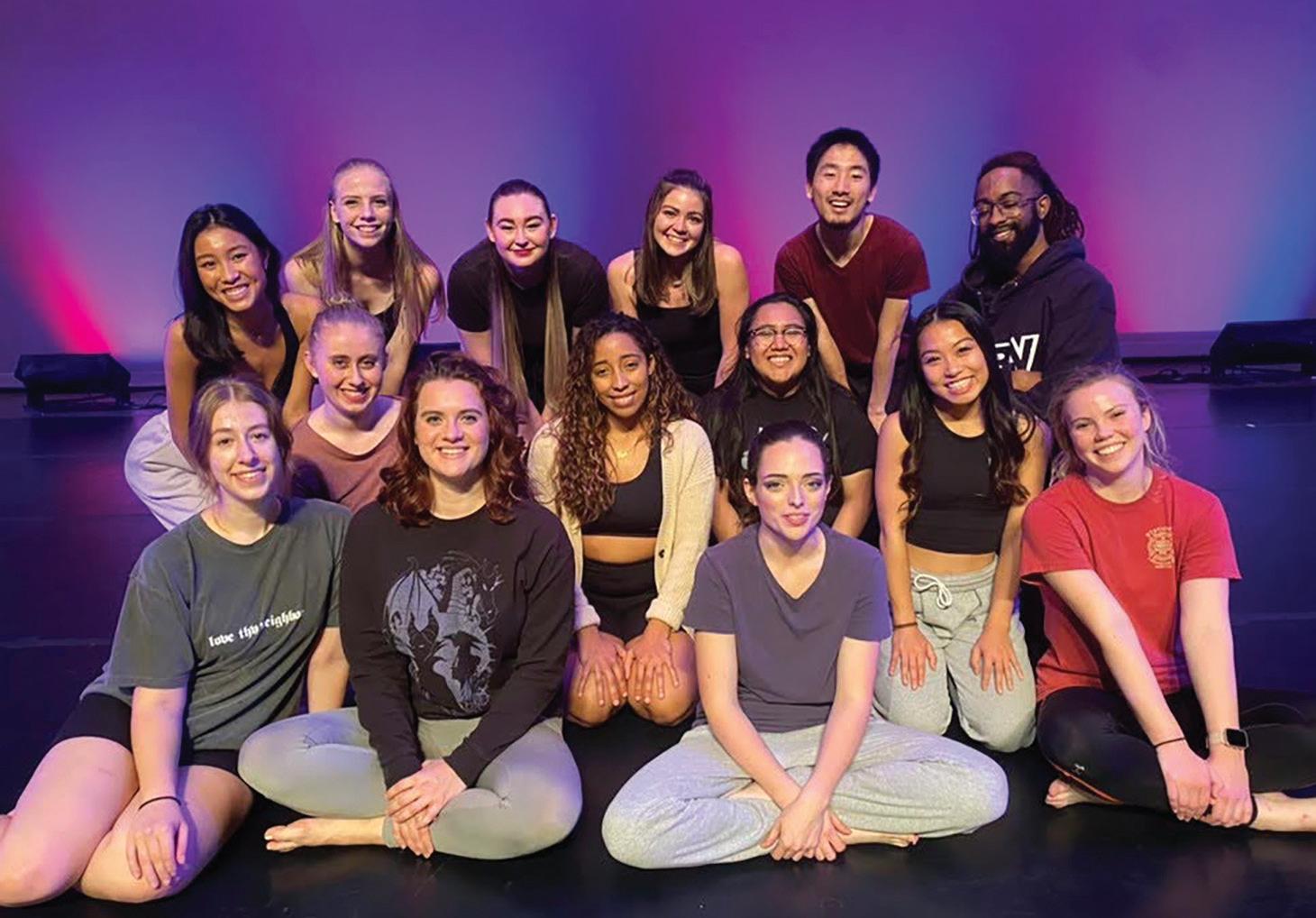
Memorable songs: “River” by Bishop Briggs, “Havana” by Camila Cabello, “Don’t You Cry For Me” by Cobi, and “Ribs” by Lorde
“I loved being in the company as a dancer for four years and on the board (recording secretary for 2021 and 2022) of Orchesis, as well as a choreographer in 2022 with my co-choreographer Lirona Wainer Yaffe ’24. Each year, I dipped my toes into different styles and gained a plethora of friendships through dance! I wouldn’t have changed a thing. I love dancing and have continued it post-college, but I wish I could be back on Shafer Stage with my fellow classmates and alumni! I’m so proud of the company for being amazing year after year, with creative and talented dances performed.”


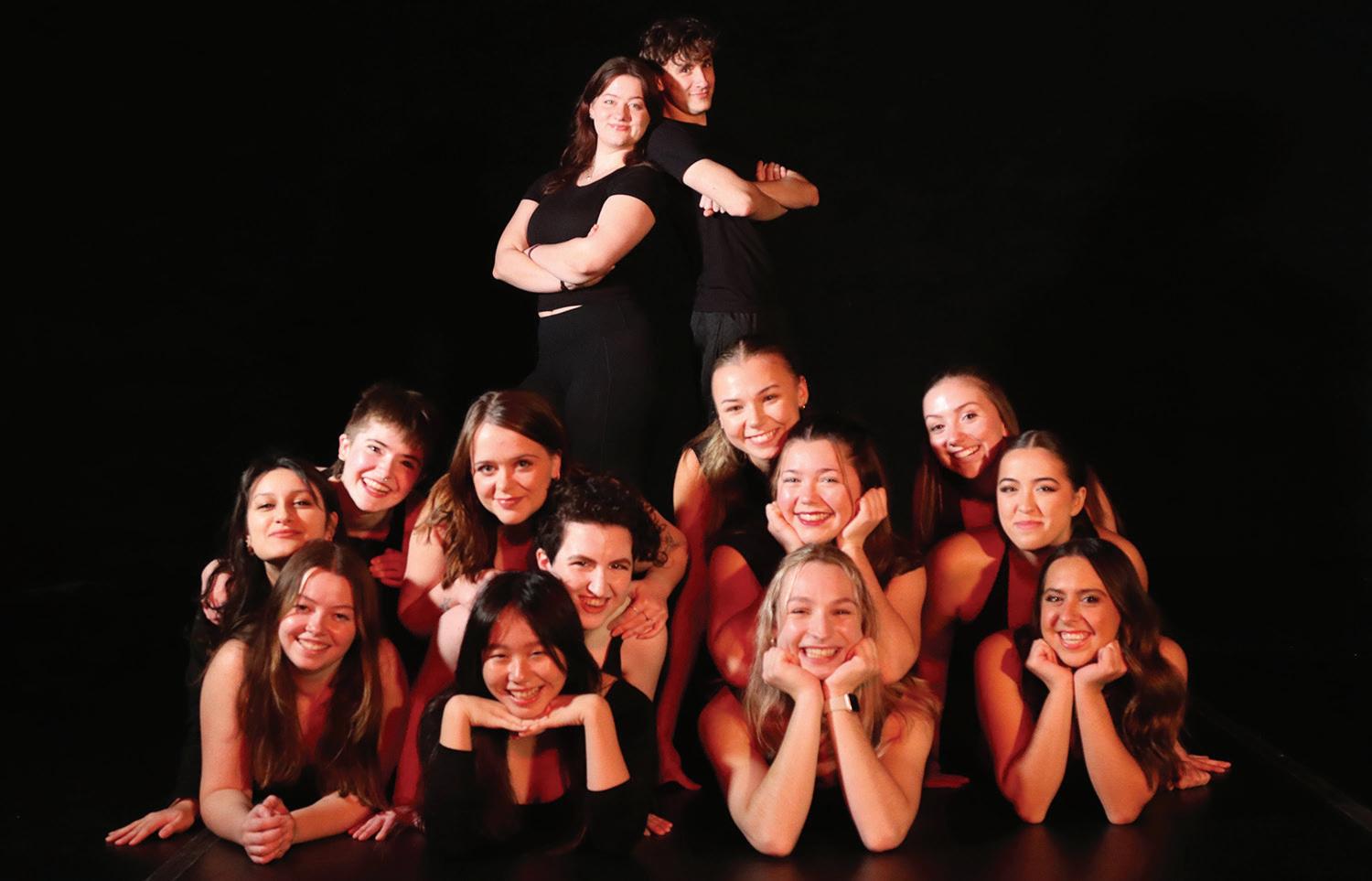
song:
“For me, my favorite Orchesis memories are all the tech weeks I’ve been a part of, especially the last two years when I got to experience them as a choreographer. The tech weeks can be long, but I love how, during tech week, you can really see the show come together — from separate pieces to a fully formed production and community. I can’t imagine my Allegheny experience without Orchesis. It has not only provided me with an artistic outlet but has also helped me believe in myself, my dance ability, and encouraged me to help others do the same.”
by Travis
On September 27, the Allegheny College Department of Athletics held its annual celebration in Schultz Banquet Hall to induct the latest group of Gators into the Allegheny Athletics Hall of Fame.
Inducted as part of the Class of 2024 were Abby Bodenlos '08 (softball), Jessica Kankoski Goeller '04 (women's basketball), Kevin Pool '05 (men's cross country/track and field), Eric Sloan '08 (men's soccer), Erin Ham Steehler '09 (women's swimming

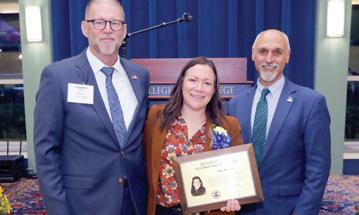
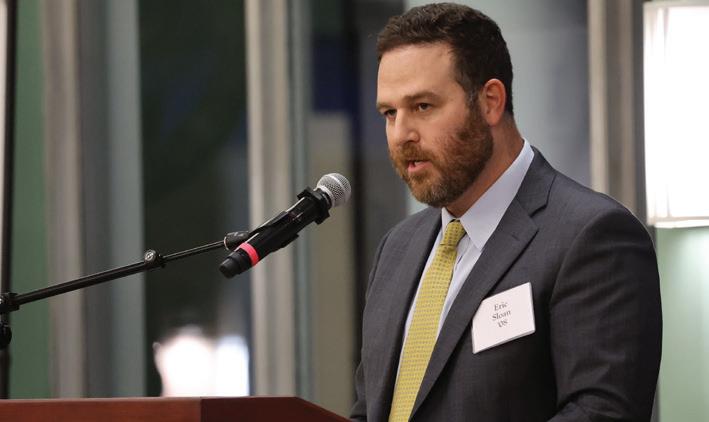
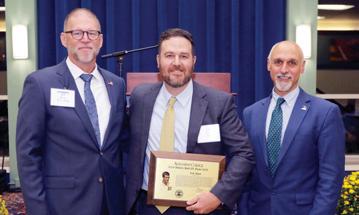
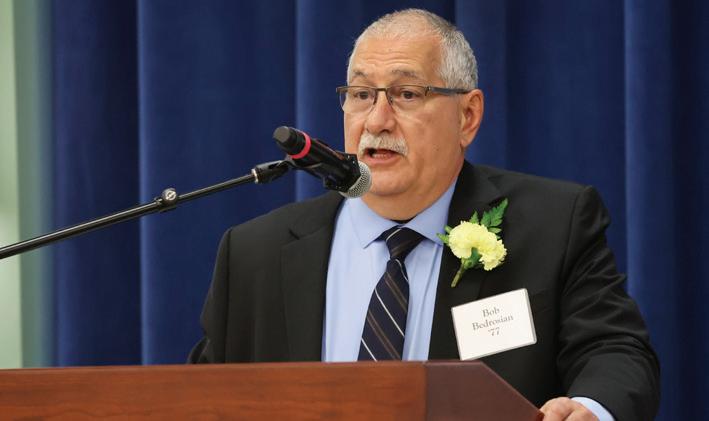
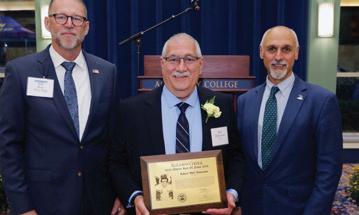
and diving), Jim Swanson '92 (men's golf), and the 1974-75 men's basketball team, led by Head Coach and former Athletic Director Norm Sundstrom (HOF '92).
Robert Bedrosian '77 (baseball), who was selected for the Hall of Fame Class of 2023 but could not attend last year's ceremony, was also recognized with this year's inductees.
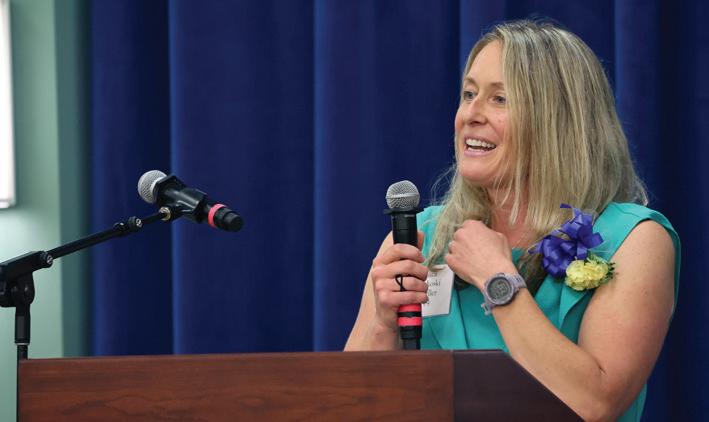
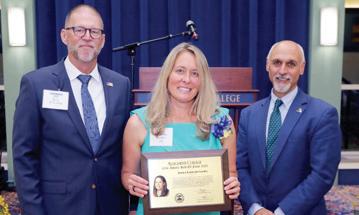

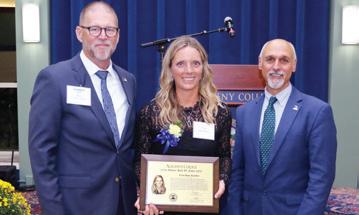
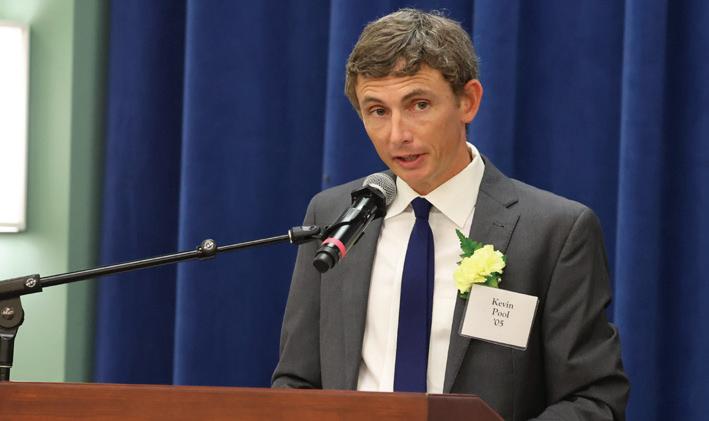
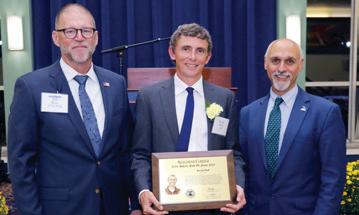



by Travis Larner
The Gators enjoyed another successful season in fall 2024 by winning three Presidents’ Athletic Conference (PAC) championships, the most of any PAC member institution. The women’s tennis and cross country programs returned to the top of the PAC, as both teams won their second conference title in three seasons, while the volleyball team won its first conference championship in over three decades.
Women's tennis was the first team to hoist the trophy, as the Gators came from behind to defeat Franciscan University with a nail-biting 4-3 victory. The deciding point was earned by Emiliia Grydnieva ’27, who battled Franciscan’s Claire Cardie in an exciting three-set showdown in the No. 1 singles match under the lights at the Robertson Athletic Complex.
Women’s cross country cruised to the top of the podium with three top-10 finishers and six total All-PAC performances. Chloe Bonson ’26, who qualified for the NCAA Division III Championships, and Marrin Crist ’25 led the way for the Gators at the PAC Championships by placing fourth and fifth, respectively.
For the first time since 1991, the Allegheny volleyball team was crowned conference champion. The Gators were a perfect 10-0 against PAC opponents in the regular season before sweeping Westminster College in the semifinals and Saint Vincent College in the title match inside the David V. Wise Center.
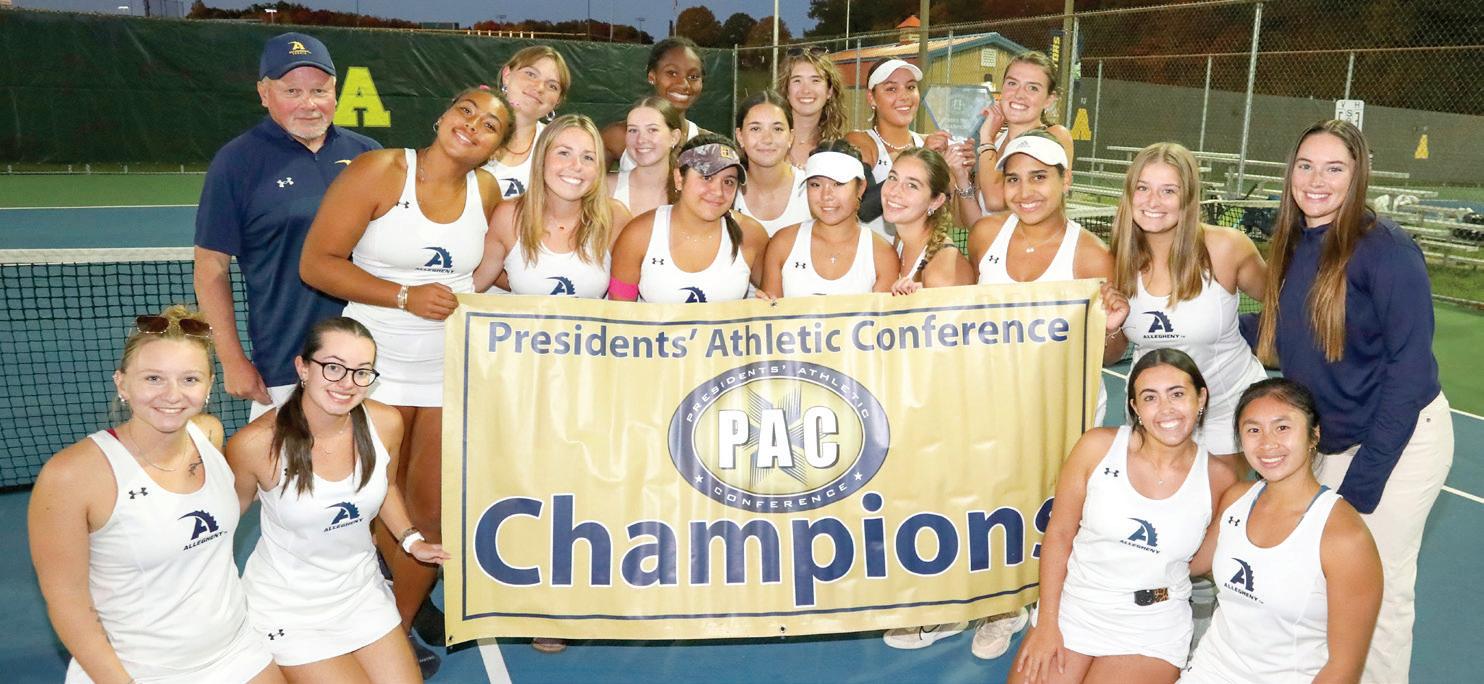
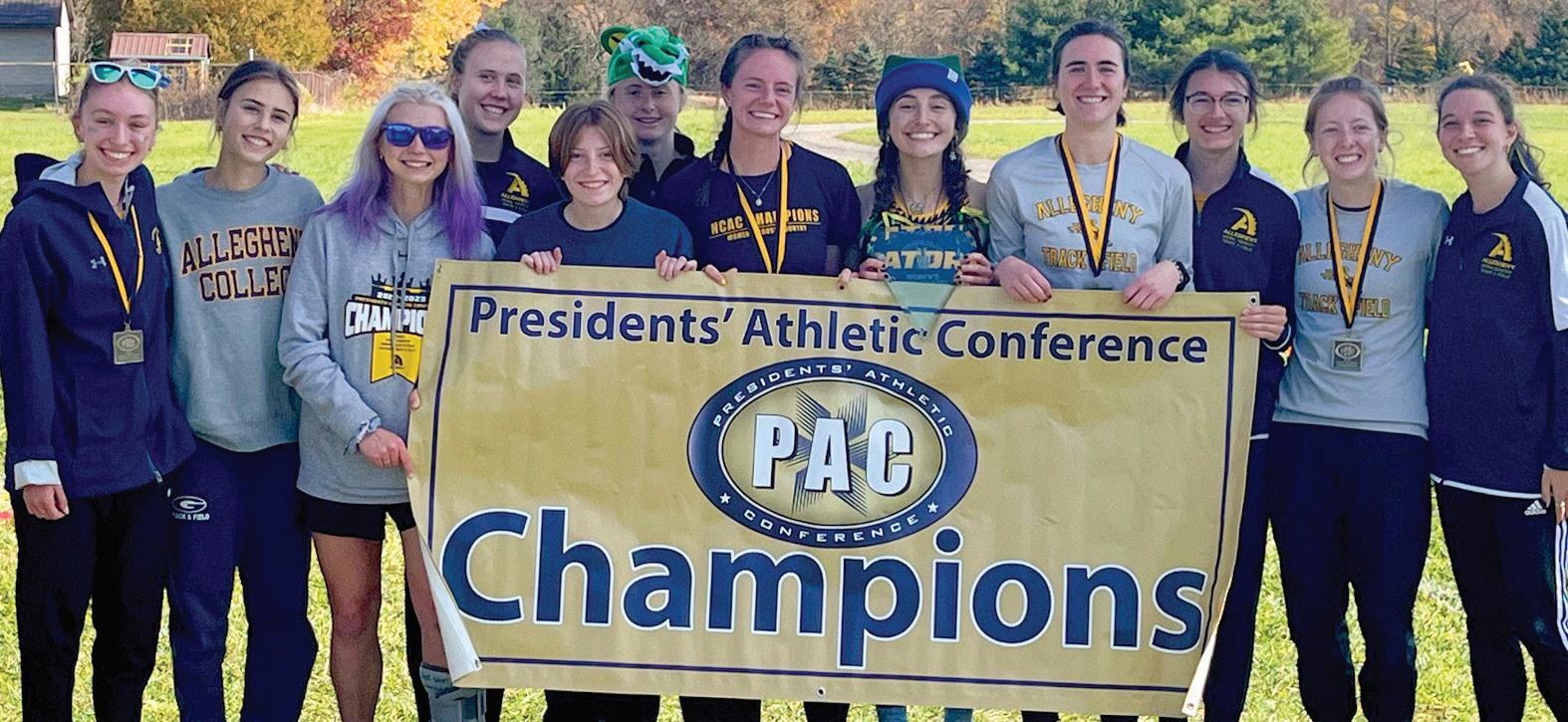
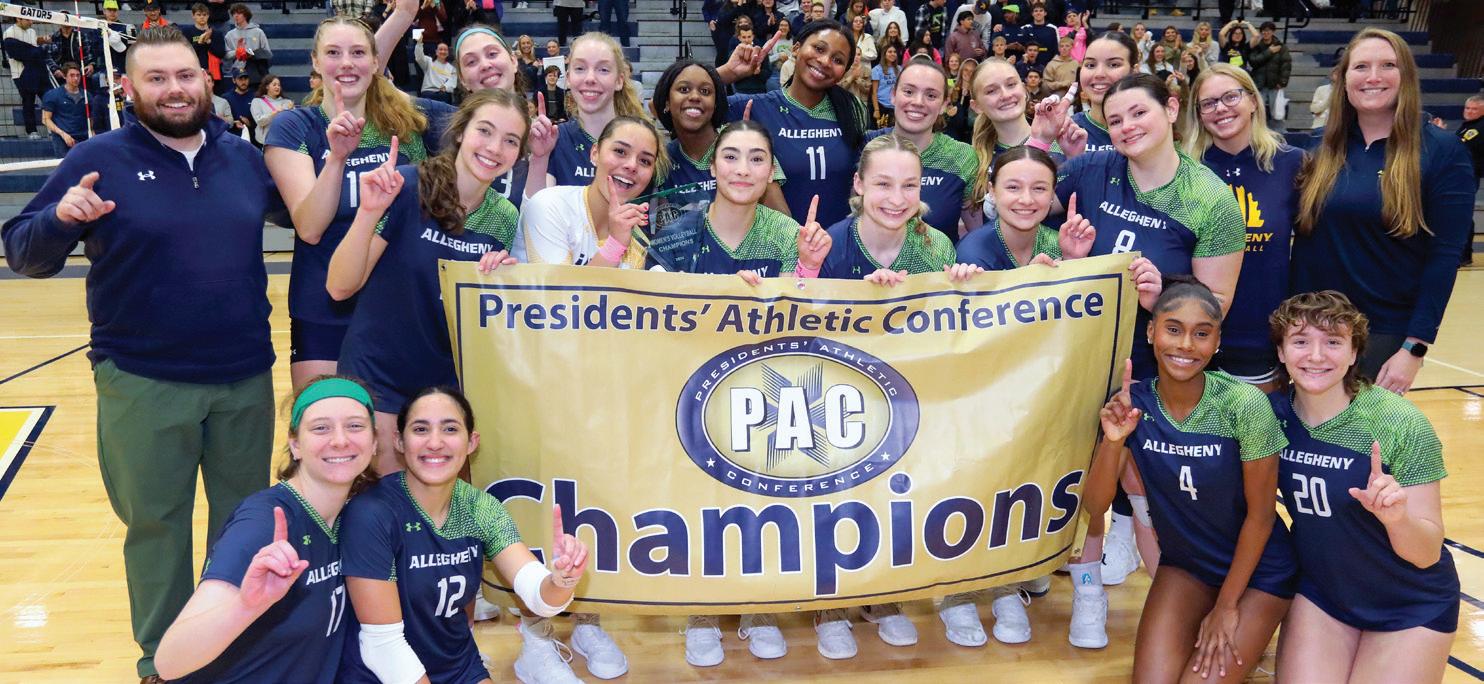

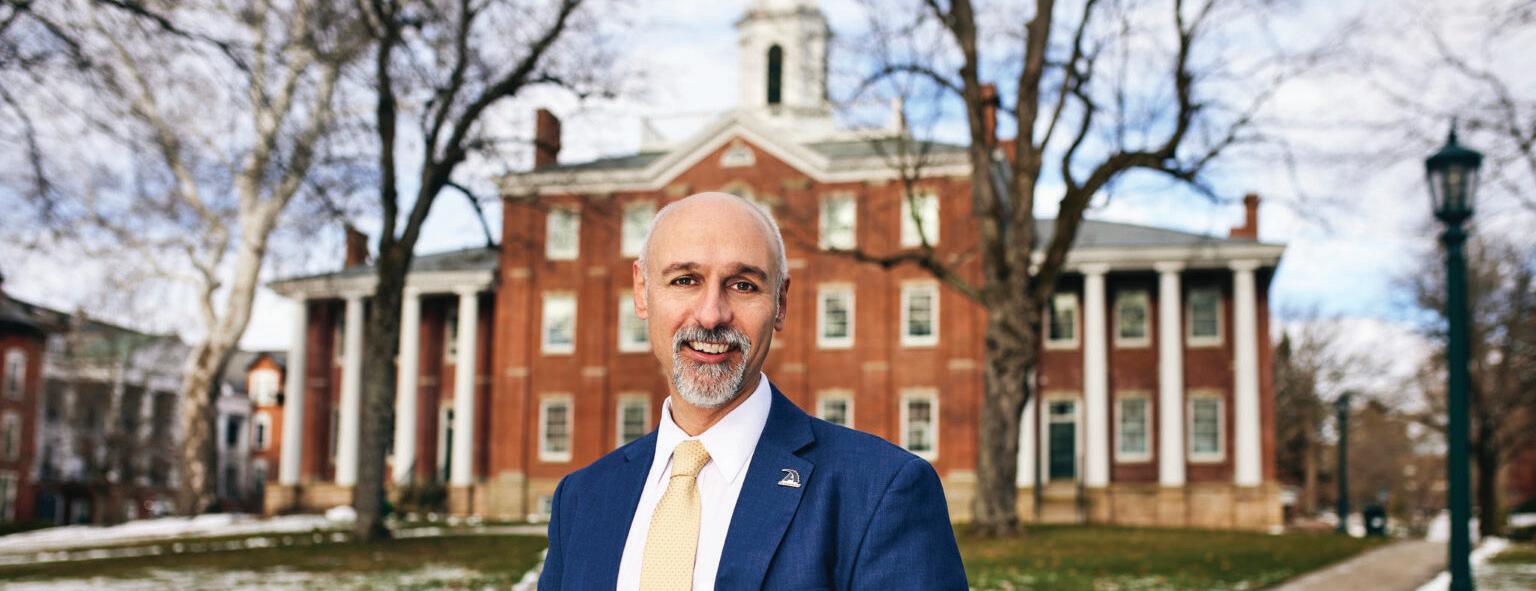
Allegheny President Dr. Ron Cole ’87 was named board chair of Project Pericles, a national consortium of colleges and universities committed to including participatory citizenship and social responsibility as essential elements of their educational programs.
“It’s an honor to serve with such a dedicated board and talented leadership team for Project Pericles to put us at the forefront of promoting civic leadership through our national consortium of colleges and universities,” said President Cole.
Founded by educational philanthropist Eugene M. Lang in 2001, Project Pericles is at the forefront of promoting civic engagement in areas including faculty and curriculum development, research into best practices, and student engagement. Working in the classroom, on the campus, and in the community, Project Pericles and its member institutions have a wealth of experience in developing programs that integrate civil dialogue, civic engagement, and community-based learning across the college experience, most importantly, in the curriculum.
Dr. Debra L. Fitzsimons has joined Allegheny as chief financial officer. She began her role on February 12.
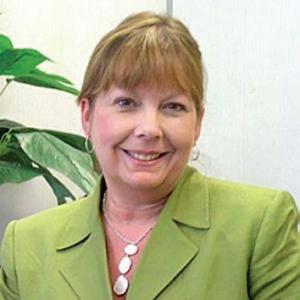
Fitzsimons brings nearly three decades of distinguished leadership in higher education finance and administration, coupled with a steadfast commitment to academic excellence and student success.
“We are excited to welcome Dr. Fitzsimons to Allegheny College,” said President Dr. Ron Cole ’87. “Her deep expertise, visionary leadership, and passion for higher education will undoubtedly play a key role in advancing our Strategic Pathway and ensuring a bright future for Allegheny.”
Fitzsimons earned a doctorate in public policy, planning, and evaluation with a focus on educational finance and policy from the University of Pittsburgh. Her extensive career spans 29 years in senior
executive roles, including vice chancellor for business services at South Orange County Community College District, vice chancellor of administrative affairs at the University of Hawaii at Hilo, and most recently as vice president for administration and finance at Indiana University of Pennsylvania.
Throughout her career, Fitzsimons has managed complex budgets, led strategic planning initiatives, and implemented transformative operational improvements. While at South Orange County Community College District, she oversaw a budget exceeding $750 million for a district serving more than 43,000 students. Her collaborative and innovative approach to financial management has garnered numerous accolades, including recognition for her dedication to shared governance and advancing student success.
Fitzsimons succeeds Linda Wetsell, who has served Allegheny with dedication for more than 20 years.
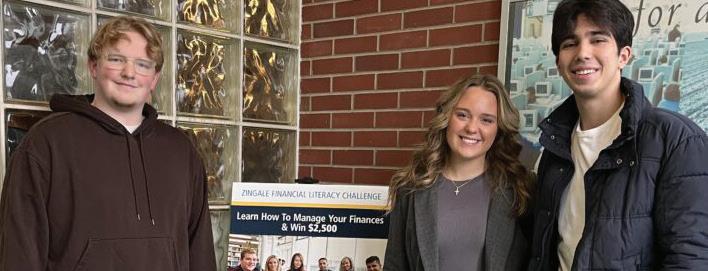
In December, 10 students were selected to participate in the 2024 Zingale Financial Literacy Challenge finals with their personal finance budget and investing plan for life after graduation. Students were evaluated according to the Certified Financial Analyst criteria, and winners were awarded prizes totaling $5,000.
The annual event is sponsored by Allegheny Trustee Lance Zingale ’77 and Karen Zingale.
“The reason we created our financial literacy program, including a four-credit class, our Adulting 101 seminar series, and the Zingale Financial Literacy Challenge, was to give our students the ability to properly manage their personal finances when they leave Allegheny,” said Chris Allison ’83, entrepreneur in residence and co-director of the Bruce R. Thompson Center for Business & Economics.
The challenge is open to all Allegheny students but is mandatory for those taking the course ECON 010. Winners of the 2024 Zingale Financial Literacy Challenge were:
We are proud to share that in November, Allegheny magazine received a silver Niagara Award from the Northwestern Pennsylvania chapter of the Public Relations Society of America (PRSA), the professional organization that brings together public relations, communications, and marketing practitioners throughout Erie, Pennsylvania. The PRSA Niagara Awards recognize complete public relations or marketing communications programs and projects incorporating sound research, planning, execution, and evaluation. Winning entries must meet the highest standards of performance in the profession.
• 1st Place: Gabriel Salvatore Xavier Saccoccio ’27
• 2nd Place: Emma Conti-Windle ’27
• 3rd Place: Karl Fuchs ’25
“My favorite aspect of the challenge was working with real-world scenarios to build a personalized financial plan. From calculating expenses and investments to strategizing how to pay off debt, every step felt practical and hands-on,” says Saccoccio. “I especially appreciated researching my future job market and salary expectations, as it helped me visualize life after graduation and plan for it effectively. This experience gave me newfound confidence, knowing I’m better equipped to make informed financial decisions and achieve my goals.”
For more information about the Zingale Financial Literacy Challenge, including the criteria and past winners, scan the QR code.

$15 million
Source that wishes to remain anonymous
Allegheny received a grant from a source that wishes to remain anonymous to support the Community Impact Hub (the Hub). The Hub supports collaborations between Allegheny and organizations in our community to make Meadville and the surrounding region a healthier, more prosperous place and to provide an applied liberal arts experience for students. The grant includes an endowment of nearly $14 million to ensure the sustainability of the Hub.
Nearly $2 million
Richard King Mellon Foundation
Allegheny received two grants from the Richard King Mellon Foundation. One grant supports the Meadville Community Revitalization Corporation, an independent entity focused on improving downtown vibrancy and accessibility to workforce development and entrepreneurship opportunities. The second grant supports the Watershed Conservation Research Center, which engages in strategic conservation activities and trains future watershed stewards to protect, restore, and enhance our land and water resources in the upper Allegheny River basin, focusing on the French Creek Watershed.
$150,000
Allegheny received a grant from the George I. Alden Trust to support the purchase of additive manufacturing technologies for the Allegheny Lab for Innovation and Creativity (ALIC)
@ Bessemer, a collaborative learning, research, and fabrication lab where undergraduate students engage in highimpact educational experiences alongside community members and industry partners. The new equipment will help to enhance Allegheny’s curricular offerings as a liberal arts college while contributing to our region's workforce and economic development efforts.
Inviting Gators is what Lauren '08 does!
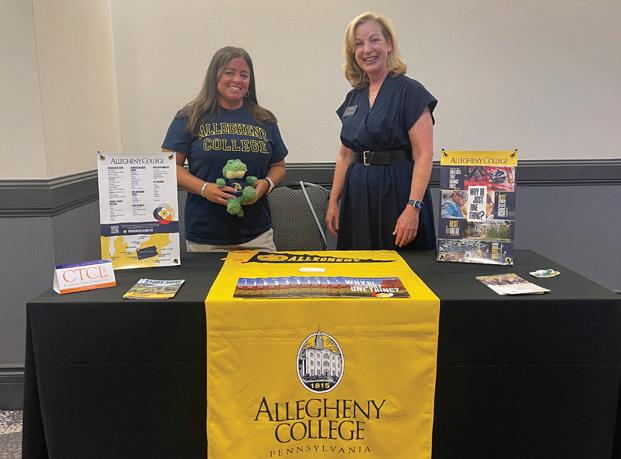
Lauren Paladino '08 was crushing it at a College Fair in Seattle. Thanks for inviting students to think about becoming a Gator, Lauren!
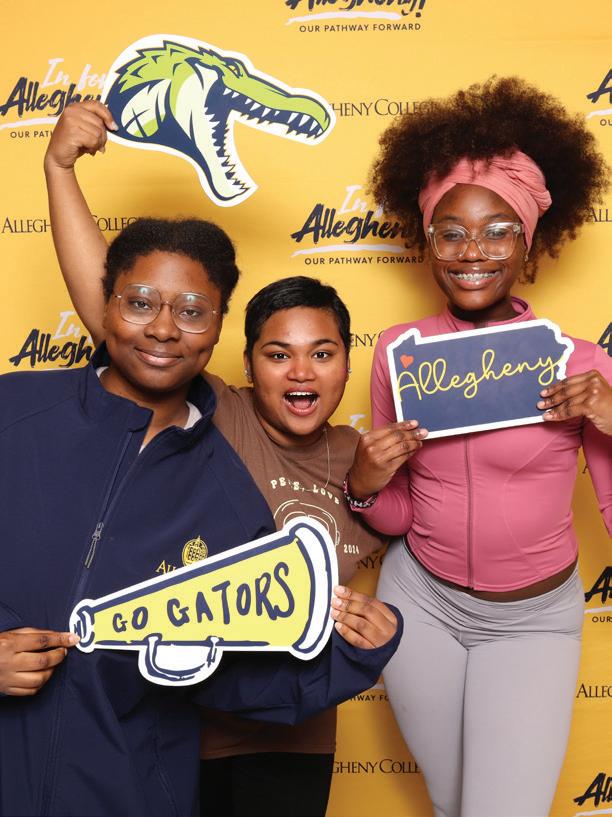
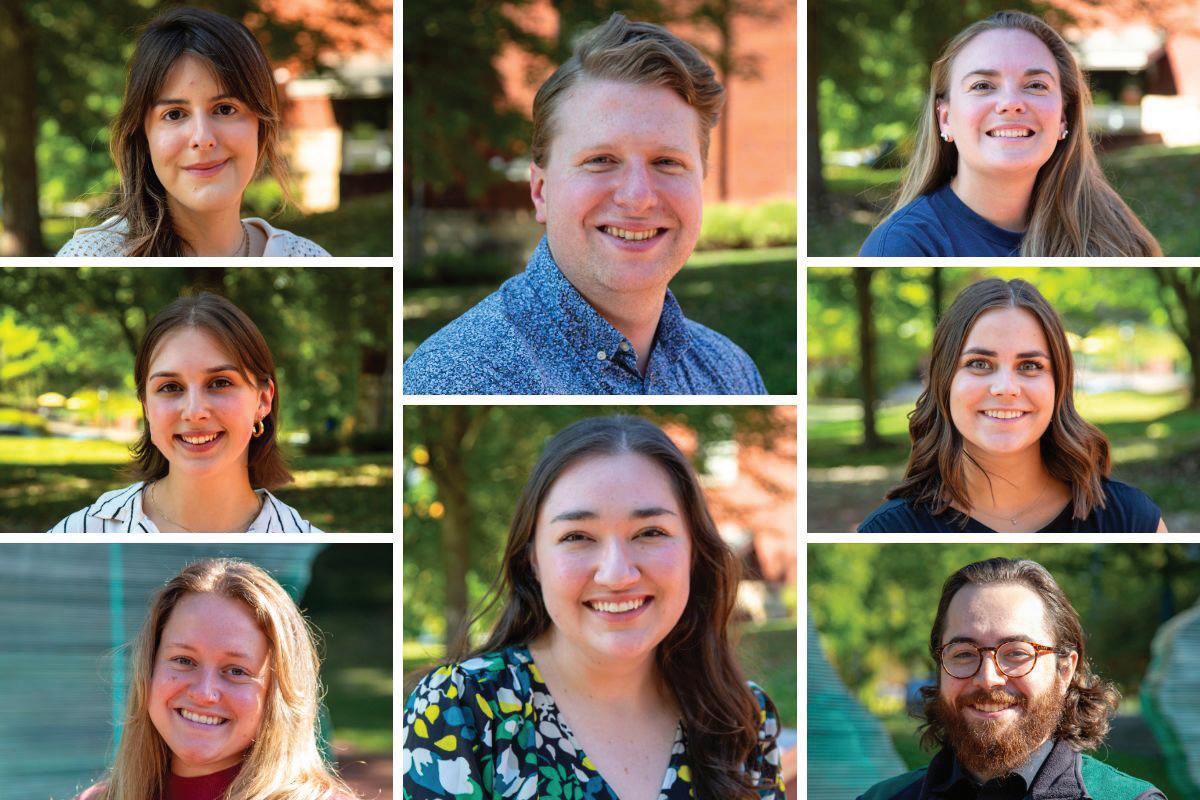
Grace, Freddy, Royse, Renna, Cate, Lottie, Madeline, and Ken... In for Allegheny!
Grace Proper '22, Freddy Smith '20, Royse Bachtel '18, Renna Wrubleski '21, Cate Hovey '18, Lottie Mateyak '23, Madeline Ackley '20, and Ken Kutzer '18 returned to campus to talk about career pathways AND shared their stories to help Allegheny spotlight the value of a Gator education. Thanks Gators!
Thank you Gators for representing your employer at a Gator2Gator Career Fair!

At Blue & Gold Weekend, we were grateful to have 25+ alumni represent their employers at a Career Fair that 250+ students attended. Some of these alumni included Katie Beisler '16, Kayla Eyer '12, Blake Gendron '22, Jack Goodman '19, Jake Gordon '16, Desmond Hargrove '22, Dylan Holland '23, Dibyo Mukherjee '14, Molly Shelton '16, and Christie Sutton '97. Thank you to all of our Gators who participated!
The Board of Trustees says, we're IN!
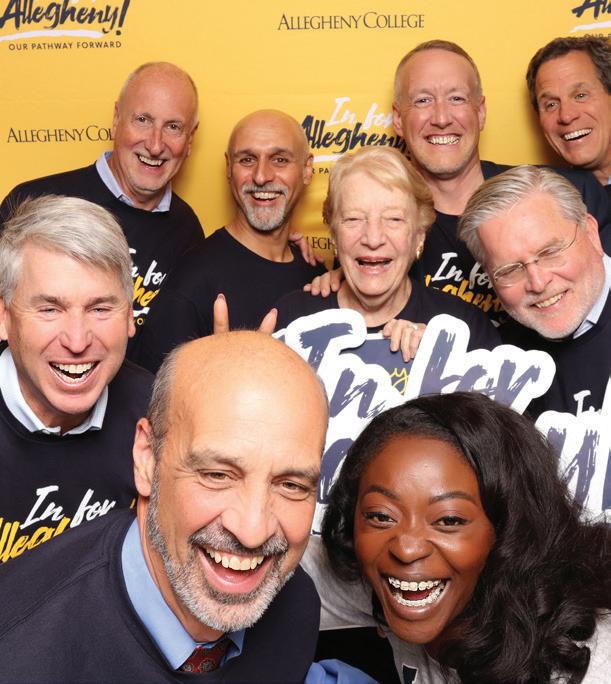

Write notes to admitted students? 97 Gators said YES to being a Gator Greetings Volunteer for the first time!
201 alumni signed up to write Gator Greeting Notes to admitted students throughout the 2024-2025 academic year - Simon Jones '24, Joplin Osgood '22, Stephanie O'Shea '10, Jonathan Cherry '97, Robert Hunsicker '93, Meredith Preble '90 and 91 others for the first time! Thanks Gators!

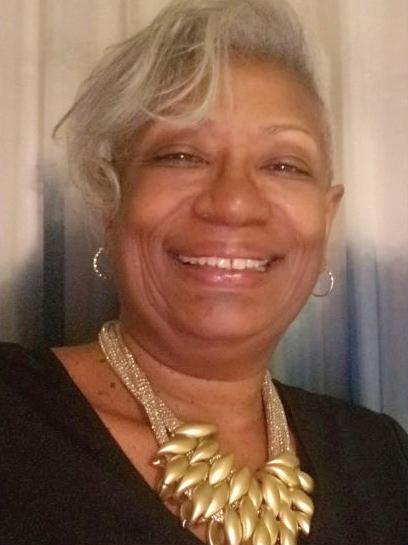
We crossed the $160 million mark in investments!
Thank you Gators… let's keep it going!
Sylvia Stewart-Lumpkin '75: Thanks for sharing your story!
Sylvia credits Allegheny College for enabling her to analyze literature through an interdisciplinary lens of art, culture, history, economics, philosphy, and psychology. Thanks for inviting students to consider Allegheny, Sylvia
THERE IS A PLACE FOR EVERYONE IN OUR PATHWAY FORWARD
In October, Allegheny launched its most ambitious campaign ever: In For Allegheny: Our Pathway Forward. This campaign reflects our bold vision for the future, as outlined in our Strategic Pathway, and empowers our alumni, families, employees, students, and friends to participate in meaningful ways by inviting future students to become Gators, inspiring students with strong outcomes — starting with career connections — and, together, investing $250 million in the future of our College.
Let’s propel Allegheny into the 21st century! With this campaign, we’re rallying all Gators to be In for Allegheny, ensuring that future generations have this life-changing experience we call Allegheny College. Visit inforallegheny.com to learn more and join the growing number of early supporters who are already In for Allegheny.
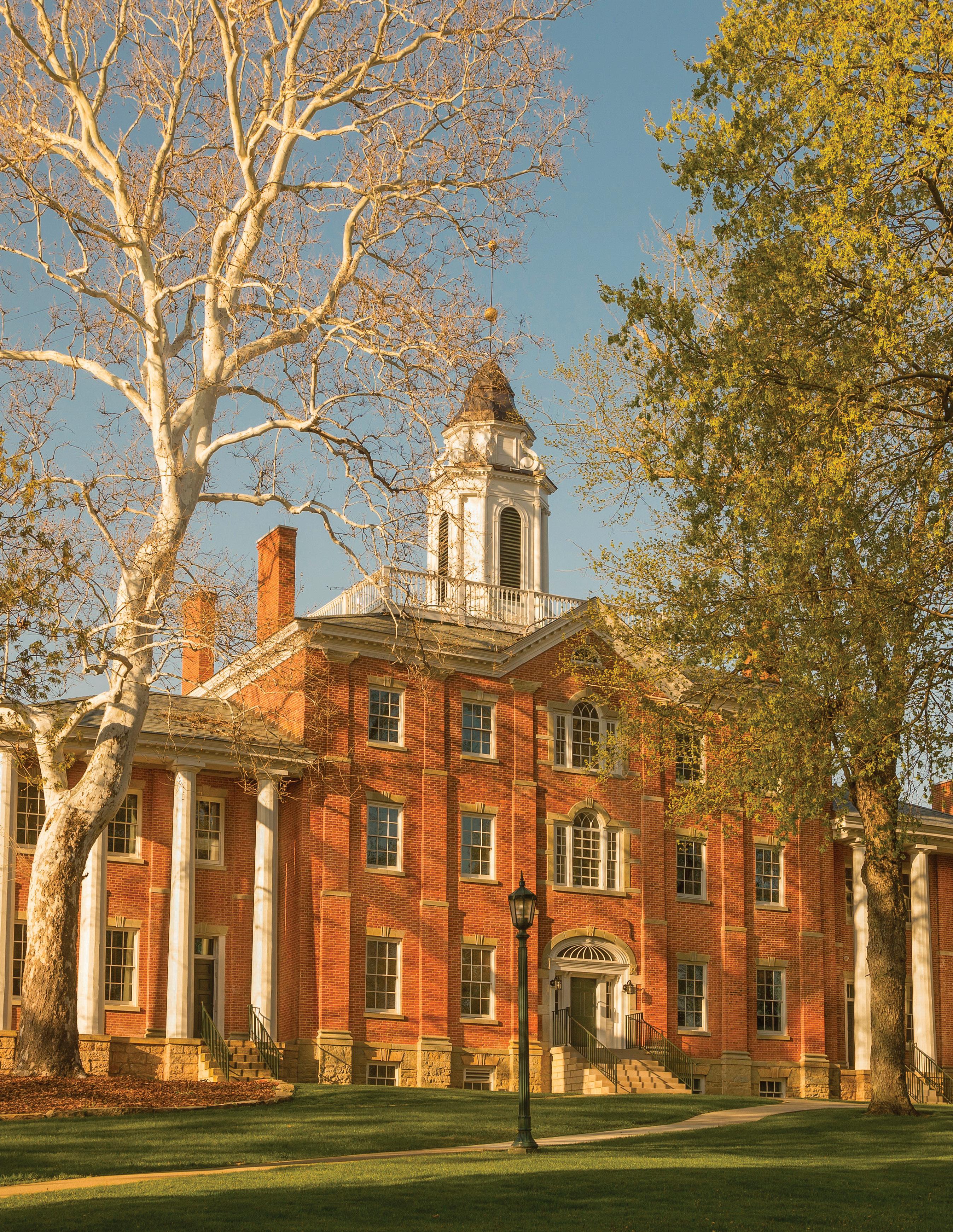
by
I have two questions for alumni and friends after enjoying this edition of the Allegheny magazine — what unites us, and what do we stand for? I’ll answer in two words: Allegheny College.
Why? Because Allegheny College enriches our lives, and this historic College continues to change the lives of students who put their trust in us to empower them through education.
How do we do this? Alumni have told me that the power of an Allegheny education includes a mix of these ingredients:
• personalized mentoring by faculty and staff,
• learning how to learn while applying critical-thinking skills across disciplines,
• developing excellent communication skills, and
• the opportunity to explore different perspectives and interests in and out of the classroom to appreciate the fullness of life.
I extend that these ingredients lead to an engaged and prosperous citizenry and are in the strands of Allegheny College’s DNA uniting us to our earliest years. For example:
• In 1829, just 14 years after our founding, the Allegheny catalogue states: “The Faculty will endeavor to habituate the mind to the investigation and acquirement of truth; to teach it how to think, to invent, and to apply all its acquisitions to some useful purpose.”
• From the 1854 catalogue: “The object of Collegiate Instruction is to bring out every power of the mind to its fullest and fairest proportions.”
• From 1936: “Allegheny believes that the finest vocational training any school can offer is a broad understanding of our social and economic order and a thorough knowledge of the laws and the science of learning.”
• Fast forward to 2001, nearly the year our current students were born: “Among other benefits, liberal arts education develops and encourages the use of the imagination, in the creative sense and for solving problems of everyday life. It enables participants to experience and enjoy life to the fullest.”
• And on the Allegheny College website today: “As an Allegheny College student, you’ll combine your interests by selecting a major in one area and a minor in another … providing perspective from the local to the global … and learn to think critically, communicate creatively, and question everything.”
No nation has ever built up its people by tearing down its schools … and we will not be that nation. We believe higher education builds America.
Ted Mitchell President, American Council on Education
Recognize the trend here? Teaching how to think, learn, and communicate, inspiring creativity and problem solving, imparting the values of serving the greater good — alumni across generations have shared with me that these factors, embedded in their academic and co-curricular experiences, set them on a path for success in life. That’s the power of an Allegheny education ringing true through time, and that’s what we stand for.
As we celebrate 210 years of delivering life-changing education, Allegheny College stands the test of time, but higher education in America today is at a tipping point. Colleges and universities are being scrutinized, at times for some fair realities — like the opaqueness of the cost of education (but with misunderstanding about the net cost of attendance), and at other times based on broad-brush assumptions or misinformation — like indoctrination of students and weak outcomes for graduates. Some of these perceptions of higher education are fueling policy decisions. We are facing congressional legislation that, if passed, will limit financial aid for our students
and impose significant new tax burdens, potentially to the tune of millions of dollars for Allegheny. Proposals on the table include increasing the rate and lowering the threshold for the endowment tax, making student scholarships and fellowships taxable, and a risk-sharing fee as part of the College Cost Reduction Act. While not aimed specifically at Allegheny, these policies would certainly bring a negative impact on us and our students. Added to this are uncertainties at this moment about the future of federal financial aid programs with proposed changes to the federal Department of Education.
Let me be clear — I’m approaching this from the perspective of policy, not politics. My job as president is to assure the vibrancy and long-term success of Allegheny College, which includes staying in tune with government policies as they affect higher education. It would be disingenuous of me not to address threats to what we do — prepare students for futures as contributors, pioneers, and leaders. The scrutiny we face started well over a decade ago fueled, in my view, by growing negative perceptions about higher education. For example, a Gallup survey in June 2023 revealed that about one-third of Americans have little or no confidence in higher education, and only 36% have a great deal or quite a lot of confidence, down from 57% in 2015. Why is this?
Higher education bears some responsibility for this loss of confidence. We excel at educating students, but have not done as well to educate the public about how colleges and universities are woven into the fabric of American life — from advances in the arts, sciences, and technology that improve quality of life to meeting critical workforce needs in all sectors of the economy and contributing to economic growth. Without top-quality, college-level education built on critical thinking and the freedom of inquiry, research, creativity, and innovation, where would we be for advances in life-saving medicine or the preparation of health professionals, teachers, artists and musicians, writers, engineers, business and political leaders, to name just a few

areas that benefit us as a nation? Ted Mitchell, president of the American Council on Education, sums it up this way: “No nation has ever built up its people by tearing down its schools … and we will not be that nation. We believe higher education builds America.” We have work to do. Higher education needs to evolve and better show our value to individuals and society.
A Pew Research study in 2024 revealed that about half of Americans think it’s less important to have a four-year college degree today in order to get a well-paying job than it was 20 years ago. While there may be more opportunities for young adults without a college degree to earn more today than they would have 20 years ago, this study also shows greater increase in pay for individuals with a bachelor’s degree and widening of the gap in earnings between young adults with and without a four-year degree over the past decade. It’s no surprise to me though that public perception is that the cost for a college degree, when considering published price of tuition, is out of reach and may not be worth it to get a “good job.” But, the average net cost of attendance (tuition plus room and board after grants and scholarships) has been essentially flat over the past decade, according to data in a recent College Board report. We need to do better at getting this message across, and higher education needs to reform its cost structure to provide more clarity to prospective students and families.
I’ve heard pundits rail against higher education for graduating students with weak outcomes in regard to jobs, which fuels the perception of a low return on investment for a college education. This perception, when applied broadly to all of higher education, is simply misguided; policy makers cite earnings of college graduates within the first few years after graduation without taking into account
those graduates who start off by pursuing important yet less compensated shortterm outcomes such as Teach for America or social services or graduate or professional school (including medicine and law). Relatedly, earlier this year while at a higher ed conference in Washington, D.C., I listened as elected officials and congressional staffers described their concerns about college students choosing academic majors that could lead to lower-paying jobs and suggesting a sliding scale for tuition (e.g., higher tuition for a business or engineering degree and lower tuition for a degree in the humanities) and imposing a fee that colleges would pay to government for students in lower paying jobs upon graduation (i.e., the risksharing portion of the College Cost Reduction Act).
… the Class of 2024 had a 98.4% placement rate in jobs, graduate or professional school (including medical and law school), or compensated service within six months of graduation. This is among the best placement rates in the country.
value of a college degree solely to earnings in a first job is a misguided commodification of education.
Nevertheless, any number of studies, including that of Pew Research cited above and data reported by the U.S Bureau of Labor and Statistics, show that graduates with a college degree have higher earnings than those without a degree, especially over a lifetime.
Furthermore, as described in a 2024 article in Forbes, the financial value of a college education goes beyond base salary and includes additional compensation through benefits and long-term financial stability. Importantly, beyond financial value, the article reports research that shows broader benefits of higher education, including better health, greater civic engagement, and overall higher quality of life.
President Ronald B. Cole ’87, Ph.D.
In my opinion, aside from obvious concerns of government overreach to control academic programs and pricing, the rhetoric and policy that equate the
If you’re wondering about how Allegheny fares, the Class of 2024 had a 98.4% placement rate in jobs, graduate or professional school (including medical and law school), or compensated service within six months of graduation. This is among the best placement rates in the country. Moreso, based on a recent alumni survey by the Higher Education Data Sharing Consortium, Allegheny alumni five and 10 years after graduation responded more strongly than those at peer institutions that their undergraduate education very much prepared them for their career, graduate or professional school, and social and civic involvement. I know from countless conversations with alumni that our liberal arts education across all majors prepares graduates as lifelong learners and engaged citizens who are highly successful in life (yes, even humanities majors). Allegheny College graduates have strong outcomes.
Lastly, there’s the perception that colleges and universities are indoctrinating

students with political agendas. What would we have to gain by doing so? I surmise that all of higher ed is being held accountable in some people’s minds for what they observe from a few campuses. While I can’t speak for other institutions, at Allegheny, we don’t indoctrinate; we educate. We help students learn how to think, not what to think. My view is that Allegheny must be that unstinting forum where competing perspectives are freely encountered and openly engaged, where different perspectives come to bear. Where we can debate with evidence-based reasoning and respect. Where we can disagree without being disagreeable. And it’s my expectation that we live this every day in and out of the classroom. For example, students across political ideologies should feel welcome and safe to express their points of view as part of our campus community. They should also welcome respectful challenges to their viewpoints and be able to engage in productive debate while listening to the views of others. Isn’t this an important part of learning on a college campus?
Throughout my time at Allegheny, I’ve attended panels and forums on wideranging social, political, and economic issues where participants offered clear arguments and where attendees parted ways knowing more, sometimes agreeing and, at other times, agreeing to disagree. Our academic offerings include societal topics through the ages up to the most pressing issues of the day. I've sat in on classroom discussions and guest lectures with robust and passionate debate, which I believe can lead to deep learning. An alum who graduated some years ago recently shared with me that they intentionally took classes that they knew would include topics out of their comfort zone — classes that would challenge their understanding of issues, because they believed that this was an important part of a liberal arts education. This is what
learning is all about. Not telling anyone what to think, but to go through the very joy OF thinking.
While I can’t speak for other institutions, at Allegheny, we
don’t indoctrinate; we
educate.
We help students learn how to think, not what to think. My view is that Allegheny must be that unstinting forum where competing perspectives are freely encountered and openly engaged, where different perspectives come to bear.
President Ronald B. Cole ’87,
Ph.D.
Again, higher education has work to do to regain and solidify public trust. But, rather than critics driving attacks on higher education, let’s drive solutions. I’m proud that Allegheny is leading in this work. Our Strategic Pathway, empowered by our In for Allegheny campaign, is honing our academic excellence and improving the strong outcomes of our graduates. We’re building a vibrant and inclusive campus, evaluating our pricing, and reforming our business processes to be more efficient and cost-effective while improving the quality of education. As you read in this edition of the Allegheny magazine, we are continuing our
centuries-old practice of investing in education and being a part of the community and economic development of the greater Meadville region. We are advancing and expanding the value proposition of Allegheny College for the next generations of students, which in turn, is an investment in the communities and the world they will go forth to serve in any number of productive ways. We’re doing this by building on our strengths, remaining true to our “DNA,” while evolving into the 21st century.
Higher education with free exchange of ideas and inquiry, creativity, and critical thinking has contributed significantly to the American dream and the strength of our nation. Maybe the American Council on Education (ACE) sums it up best when they describe higher education as part of building America: “Our nation faces numerous challenges, such as growing economic and military competition abroad and a rapidly evolving economy that requires new ways of learning and working. The key to unlocking America’s potential lies in strengthening and utilizing our world-leading colleges and universities.”
As I write this piece and every day going forward, now more than ever, my call to action for friends and alumni is this: To stand united for Allegheny College. Help to accelerate the momentum of our Strategic Pathway that is being empowered by our In for Allegheny campaign. Invite new students to attend Allegheny. Inspire strong outcomes for our graduates. Invest in our future financially. Be “In for Allegheny,” and be bold in telling the story of your Allegheny experience and outcomes. Promote the value of Allegheny for enriching lives. Stand united as we build momentum that is grounded in what we believe — the power of education, the power of Allegheny College.

Special recognition goes to the late George Beck ʼ46 and Sheila Beck as members of the William Bentley Legacy Society, a recognition for those who have provided for Allegheny through wills, charitable gift annuities, and/or charitable remainder trusts, or have designated the College as a beneficiary of their life insurance or retirement assets.
Special recognition goes to J. Curtis Fee '63 and Mary Carol Fee; Howard Kessler ʼ65 and Anne Van Meter; Susan Vaiano Koster ʼ66 and Curtis Koster; and John Orchard ʼ66, who became members of the President’s Society. The President’s Society honors donors who have lifetime cash giving of $100,000 or more to Allegheny College.
Douglas Anchor ʼ68 has joined the William Bentley Legacy Society, a recognition for those who have provided for Allegheny through wills, charitable gift annuities, and/or charitable remainder trusts, or have designated the College as a beneficiary of their life insurance or retirement assets.
the late Barbara Webb Robinson '48’s novella.
Special recognition goes to William Barr ʼ70 and Rhoda Barr and Thomas Dudeck ʼ75 and Bobbi Dudeck who became members of the President’s Society. The President’s Society honors donors who have lifetime cash giving of $100,000 or more to Allegheny College.
Barbara Geiger Toohill ʼ72 has joined the William Bentley Legacy Society, a recognition for those who have provided for Allegheny through wills, charitable gift annuities, and/or charitable remainder trusts, or have designated the College as a beneficiary of their life insurance or retirement assets.
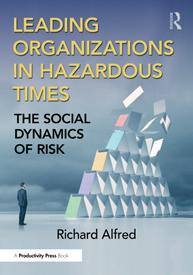
Dr. Dick Alfred has a new book in print, "Leading Organizations in Hazardous Times: The Social Dynamics of Risk," which is part of a trilogy of books on organizational leadership. The first book in the trilogy, "Catastrophic Risk: Business Strategy for Managing Turbulence in a World at Risk," was published in 2021. The third book, "From Turbulence to Upheaval: Leading in Times of Deep Change," will be published in 2026.
Dave Olson shared that "The Best Christmas Pageant Ever," a movie that was released in November, was based on
Roger Lewis spent two weeks in retirement at the start of 2019 before beginning to work for SAIC. He says, “I remain active with the firm as a fulltime employee supporting clients with their technology analysis and program management needs. I also maintain an online bookstore (groundzerobooksltd. com) with over 65,000 active titles in the areas of war, peace, and politics. I am the grandfather of three potential Alleghanians (currently aged 16, grandson) and 10 and 8 (granddaughters). While I maintain contact with a number of alumni/friends from Meadville, I would enjoy getting back in touch with those I have fallen out of touch with. I can be reached at rogeralewis@aol.com.”
Barb Reber Morse moved from New Hampshire to Walnut Creek, California, in 2023 to be close to her son, David, his wife, and two, soon to be three, grandsons. “Much time is spent with family and grandkids!” Retired from technical project management positions, she also enjoys weaving, both cloth and tapestry, knitting, spinning fiber, and exploring new places on the West Coast.
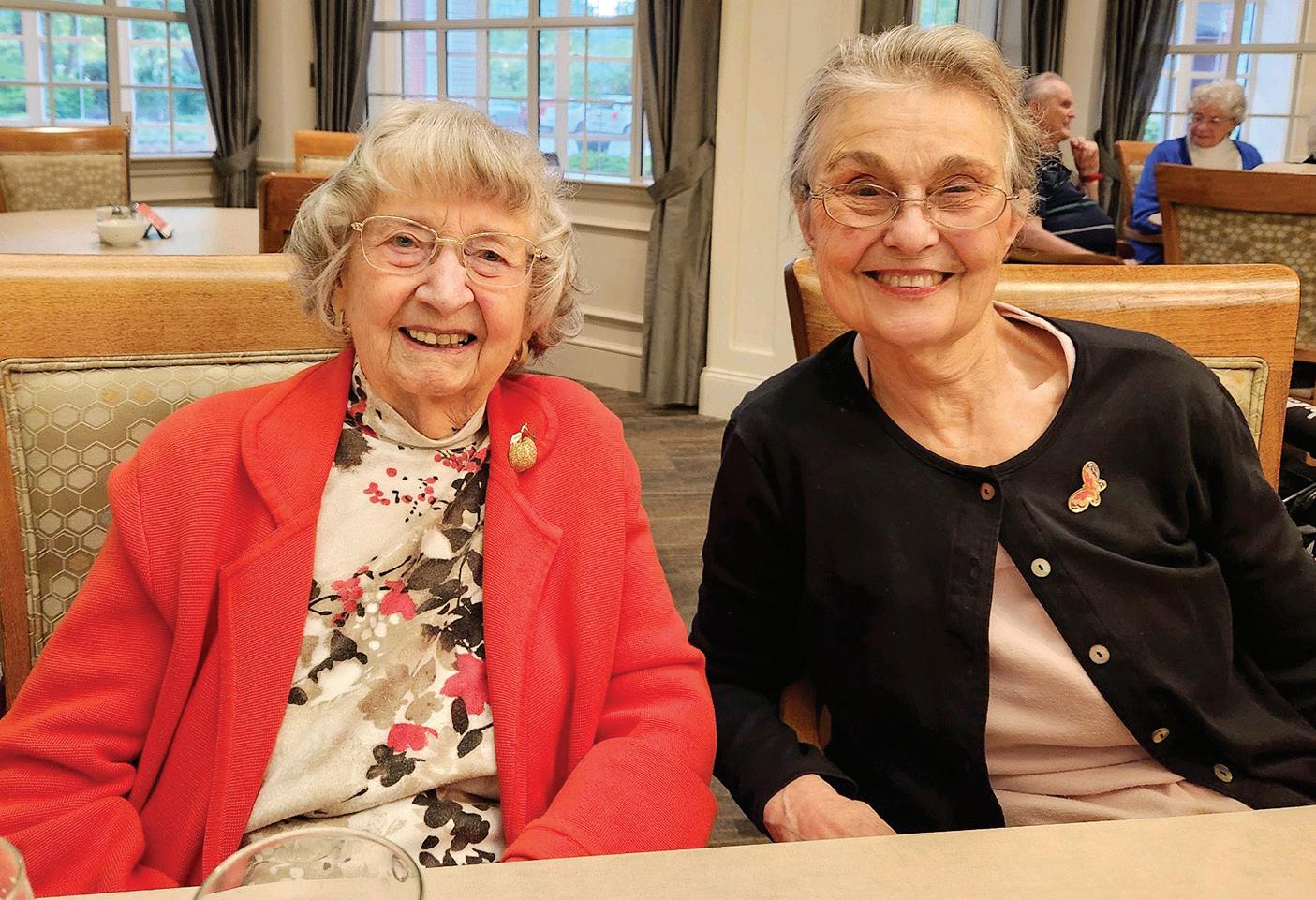
Winifred Welsh Slatery ’60 moved to Longwood at Oakmont retirement community and became friends with another Alleghenian, Hope Hunter Horst '47.
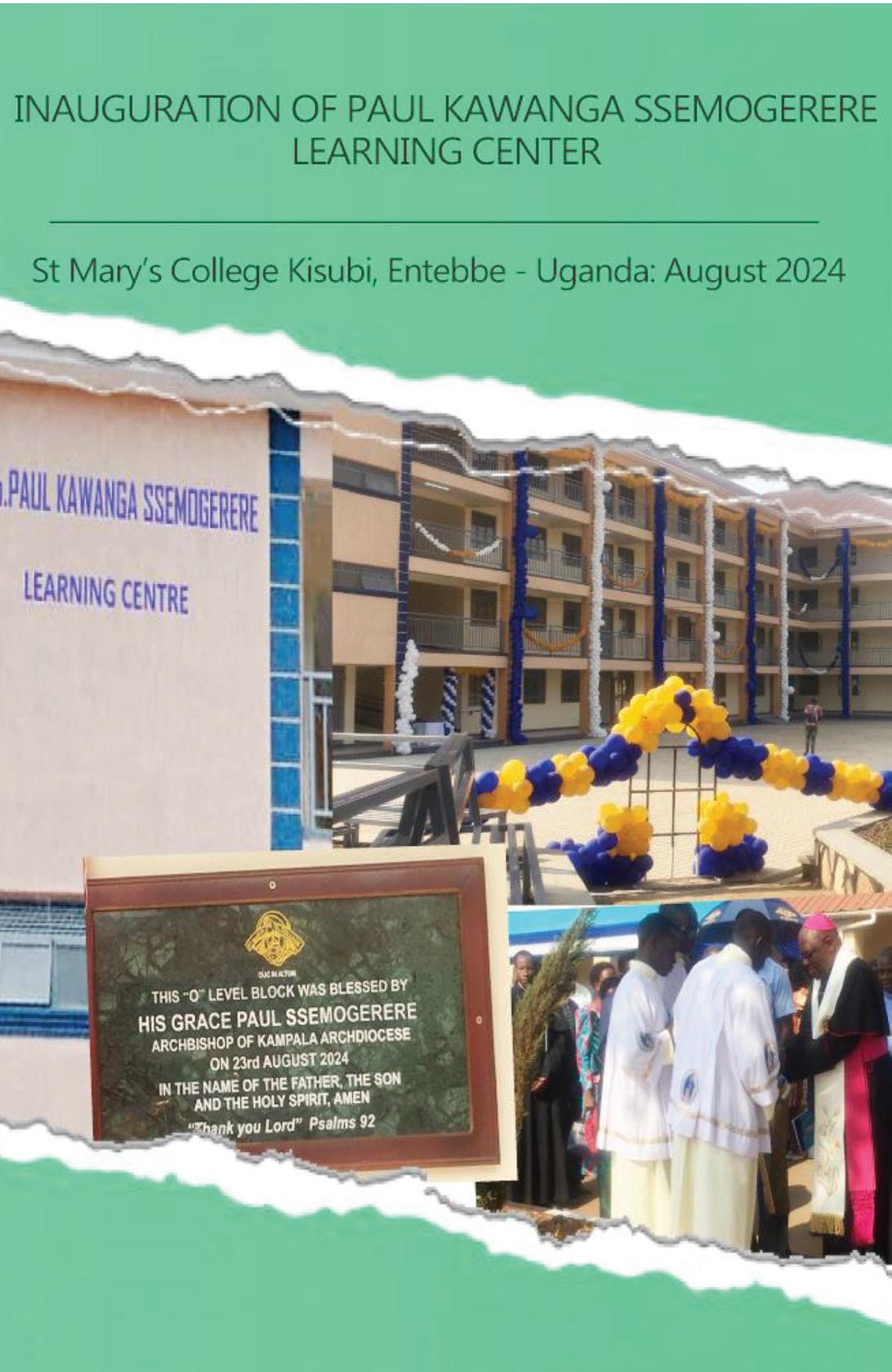
On August 23, 2024, St. Mary's College Kisubi, one of the five oldest high schools in Uganda (which the late Hon. Paul Kawanga Ssemogerere ’61 attended between 1947 and 1952) dedicated a new learning center in his memory. More information about Ssemogerere can be found at pkslegacy.org.

“Three generations representing four Gators”: Sheri Rose Dowden ’92 had a graduation party for her daughter, Neve Dowden ’28. Pictured from left to right are Neve, Sheri (holding a picture of her mother, Alice Hall Rose ’62), and Grant Dowden ’26. “Alice passed in 2010 but would be ecstatic of the legacy she began,” Sheri says.
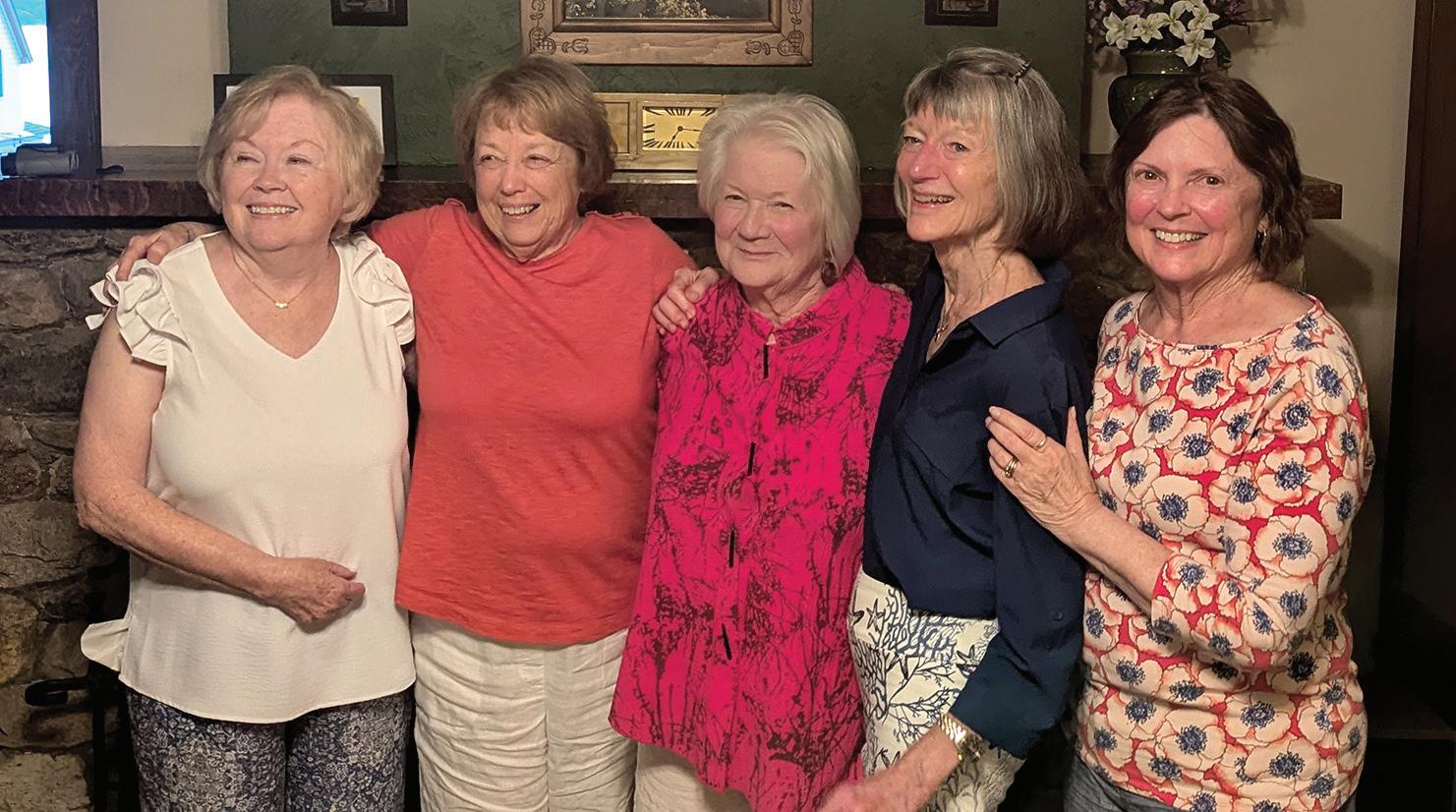
A group of Allegheny friends – all from the Class of ’67 – gathered at Chautauqua in July 2024. Pictured are Janet Fee, Sara Ridgeway Dassance, Isabelle Crabb Moss, Dr. Ann Holmes Areson, and Becky Friedt Perez
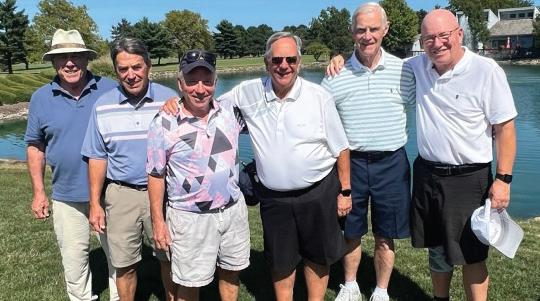
Six members of the Allegheny Classes of '70–'73 gathered in Sandusky, Ohio, for their second annual Phi Delta Theta Golf Tournament & Reunion. From left to right: Steve “the Horse” Boaz '70, Dr. Rick “Two Beer” Tully '71, Jim “Mr. D” Johnston '71, Dan “Garcon” Cacchione '70, John “Panda” Pinter '71, and Barry “the Baron” Dietsch '71. Missing in the photo was Greg “Petey” Peterson '73. The question of the week was, "How could a music major whip these other power players?” “Come join us next year, brothers.”

Baseball Senior Day, May 2024: Six of “Garby’s Gators” are pictured with President Dr. Ron Cole ’87. Left to right: Dr. Dale Hahn ’72, Chris Bell ’73, Siggy Pehel ’75, Paul Pudloski ’72, George Falkenstern ’71, Cole, and Ron Levea ’72
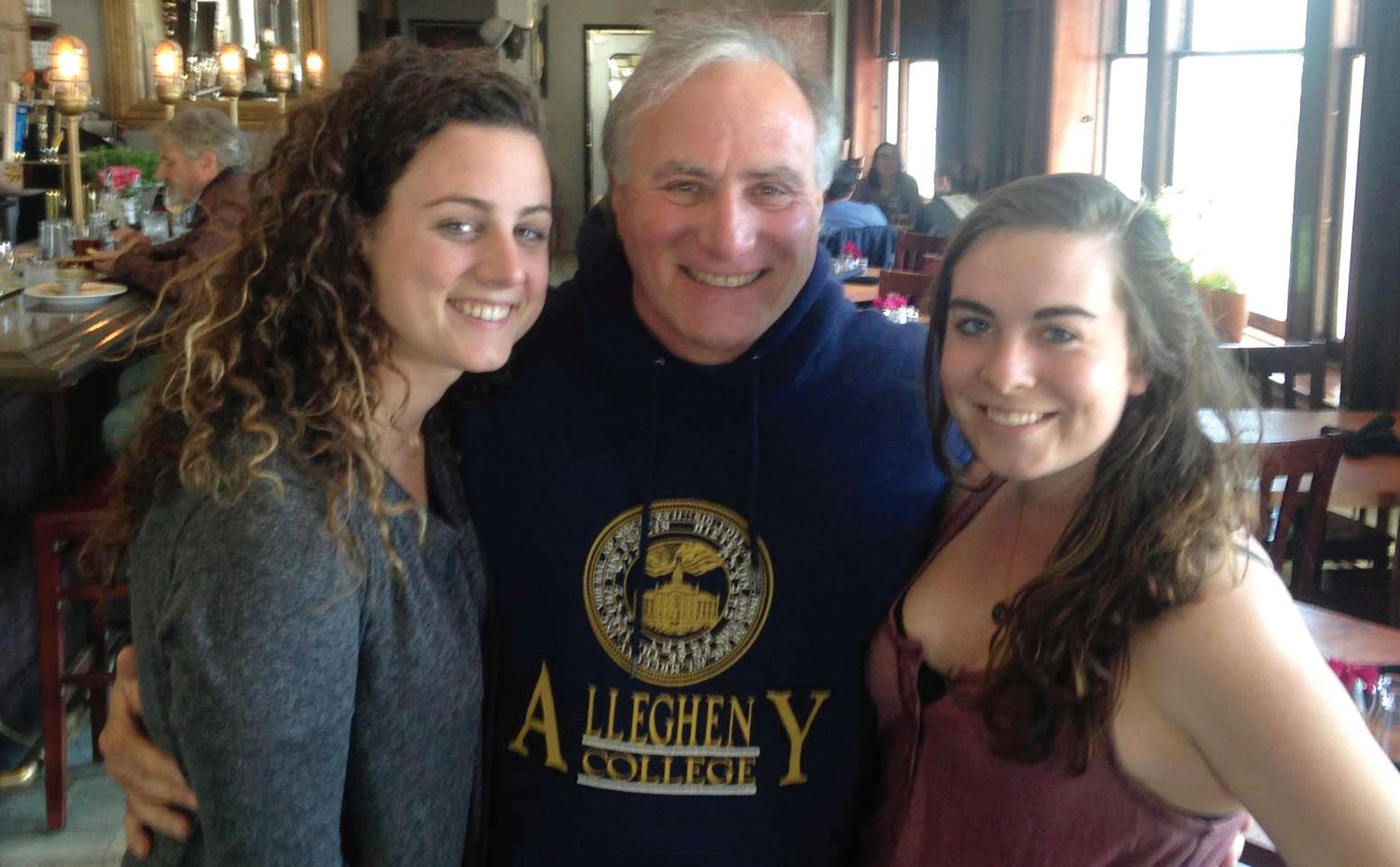
Dr. Tony Magistrale ’74 is pictured with two students from his Gothic literature seminar at the University of Vermont. Magistrale modeled the current version of his English class after the one he took from Allegheny professor Fred Frank exactly 50 years ago!

Barbara Turner ’74 says, “What a joy to return to Allegheny for my 50th reunion and catch up with so many friends from that time.” Left to right: Mark Pirozzi ’72, Dr. Wendy Born McConnell ’72, Ira Staley ’72, Deb Johnson Staley ’74, Barbara Holbein Sullivan ’74, Dr. Sue Piper ’74, Jeff Poole ’73, Sharon Carter Poole ’74, Robbie Lynch Terpstra ’74, Dr. Dee Diloreto Pirozzi ’73, and Turner.

Left to right: Siggy Pehel ’75, Jim Stranahan ’72, and Ross Cardas ’72, all Alpha Chi Rho brothers, stand beside the Super Pool Plaque on the wall at 387 Sherman St. on May 3, 2024.

Joseph A. Susi, M.D., ’75 retired from the practice of medicine in 2019 after spending the last 19 years of his professional life working overseas. He says, “I spent time in Prague, Moscow, Shanghai, Chengdu, Saigon, Guam, and Lagos, Nigeria. While working in Africa I joined a travel company and have been running wildlife safaris in Kenya and Mozambique for the last few years. Would love to hear from Allegheny alums: joesusimd@gmail.com.”
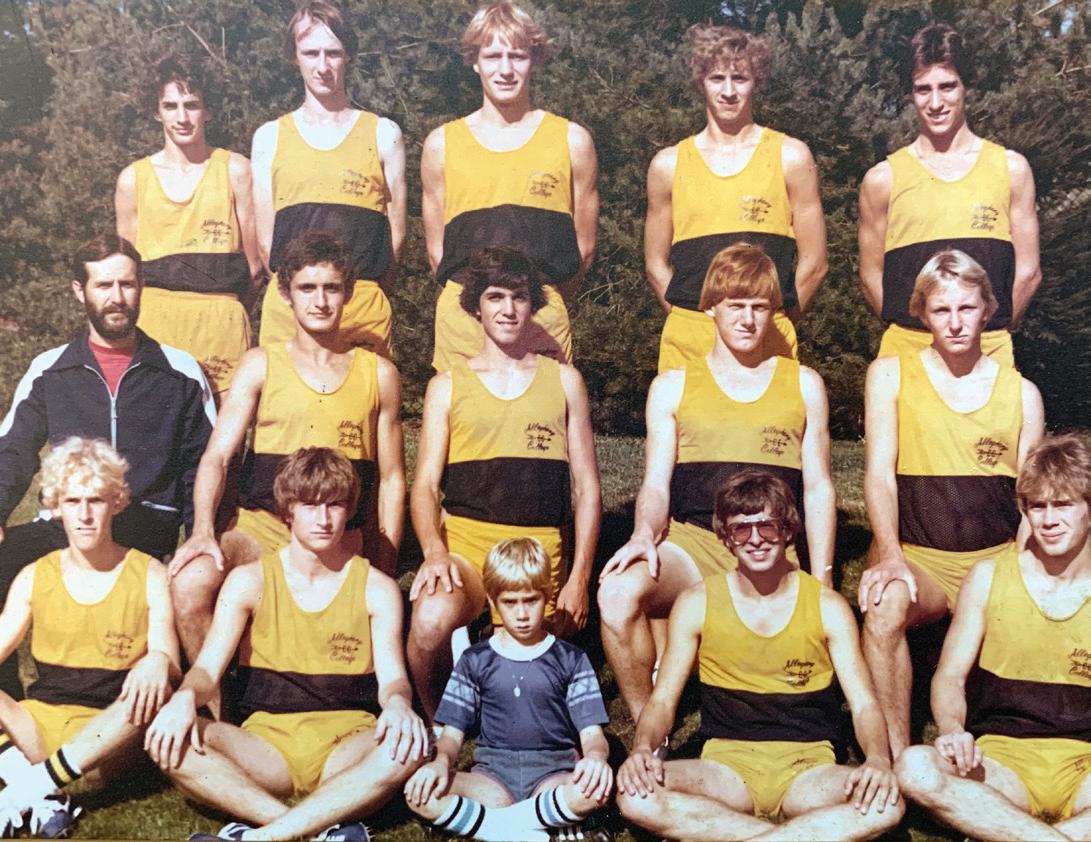
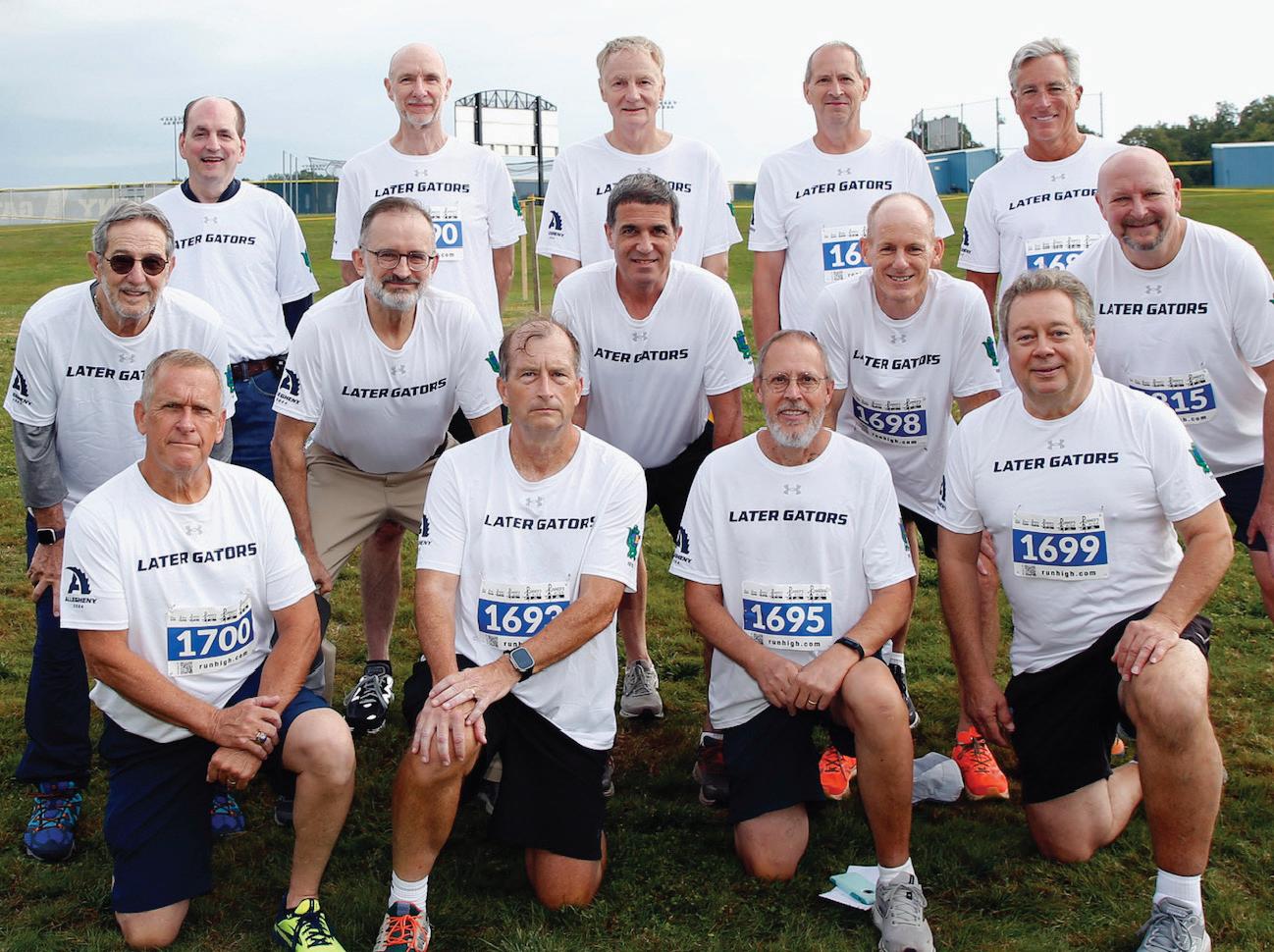
The 1979 PAC championship Men's Cross Country team reunited, identifying themselves as the "Later Gators," to participate in the 2024 Allegheny Cross Country Invitational held at Robertson Field. 1979 team members included Dr. Phil Rizzo ’83, Alistair Macdonald ’83, Dr. Brian Forbes ’81, Roger Nelson ’83, Tom Held ’83, Fiore Bergamasco (Coach), Mike Benedict ’82, Dr. John Cannon ’83, Mark Schmidt ’83, Bill Tomer ’83, Dave Stolar ’82, Kevin McKenna ’83, Dave English ’74, and Dr. Jim Schmittle ’80. Other former Gator attendees/contributors to the 2024 event included Chris Allison ’83, John Browngardt ’86, Brent Henderson ’84, Jennifer Colgrove Martin ’83, Dr. Jim Massucci ’84, John Nelson ’84, Dr. Dave Perry ’84, Joe Rog ’85, and Joe Victor ’84 Additionally, Professors Dr. James Lombardi (Senior) and Dr. Anthony Lo Bello participated in the race. The group raised $16,000 for improvements to the cross country course, which was presented to President Dr. Ron Cole ’87 and Athletic Director Bill Ross.

The following Allegheny friends reunited in Youngstown, New York, in May 2024: Dr. Bruce Fawcett ’76 and Rane Winslow ’77 from Raleigh, North Carolina; Carol Morrissey Shafer ’77 from Mercer Island, Washington; and Jeff Beich ’75 and Sue Devor Beich ’77 from Grand Island, New York.
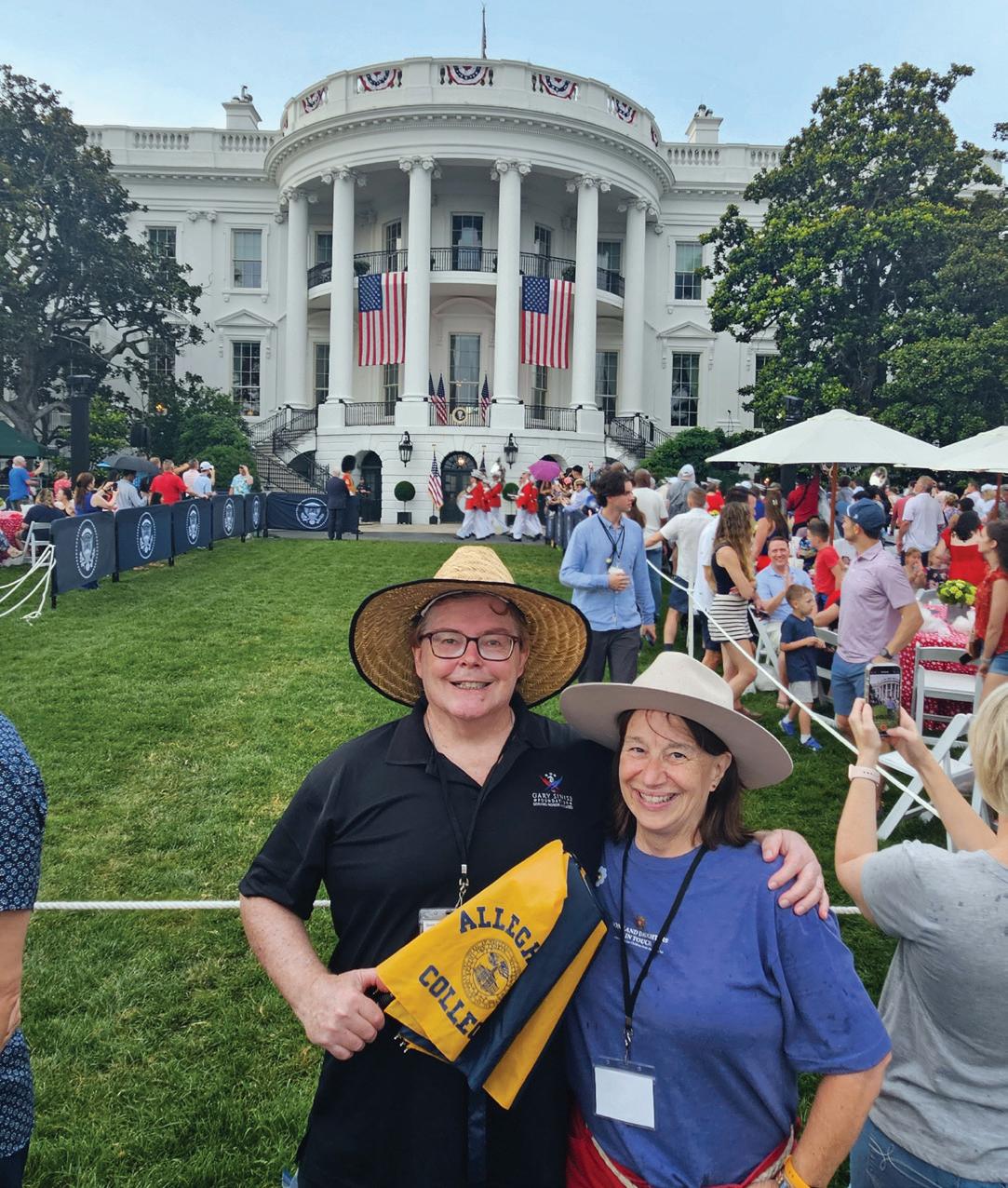
Karen Schmidt O'Connor ’78 and Terry O'Connor ’78 enjoyed July Fourth fireworks from the White House lawn, despite the rain.
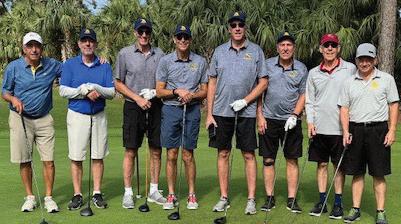
Some Allegheny Gator soccer players got together for golf on Hilton Head Island. Several of them played on the undefeated 1978 team. (Tom Traub ’80 said the only reason the team went undefeated that year was because he spent that year studying in England!) From left to right: Traub, Phil Dineen ’80, Dave Charlton ’75, Dr. Lew Zulick ’80, Jeff Wright ’81, Larry Charlton ’79, John Zulick ’79, and Marsh Jones ’80
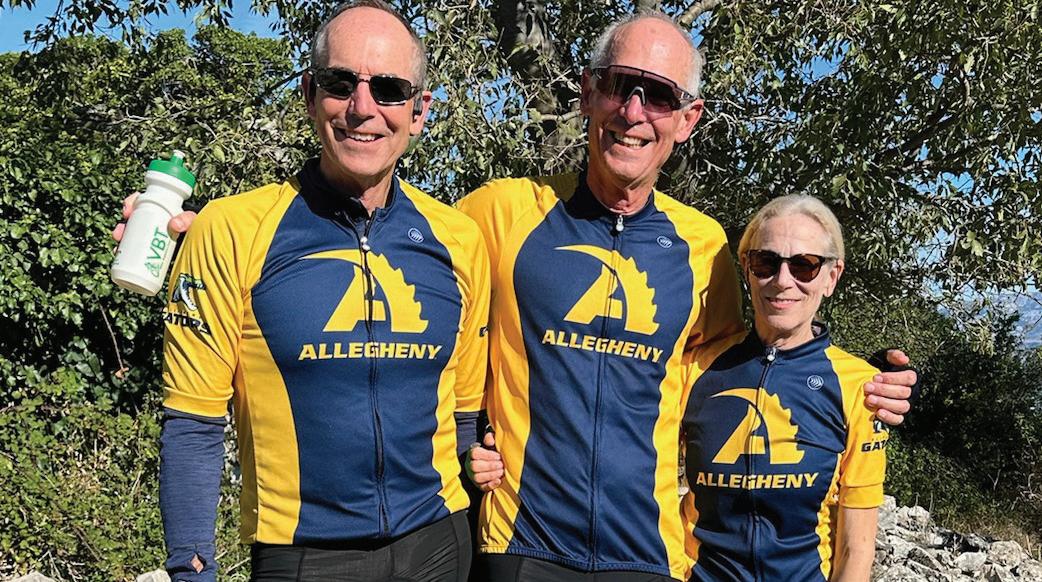
Dr. Lewis Zulick ’80, Paula Heeschen ’78, and Heeschen’s husband, Art Zulick ’76 (also Lewis’ brother), stopped for a photo during a bike trip to Croatia.
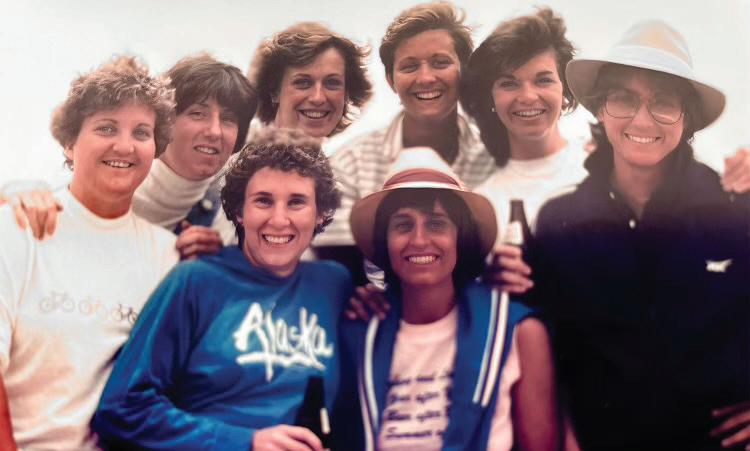
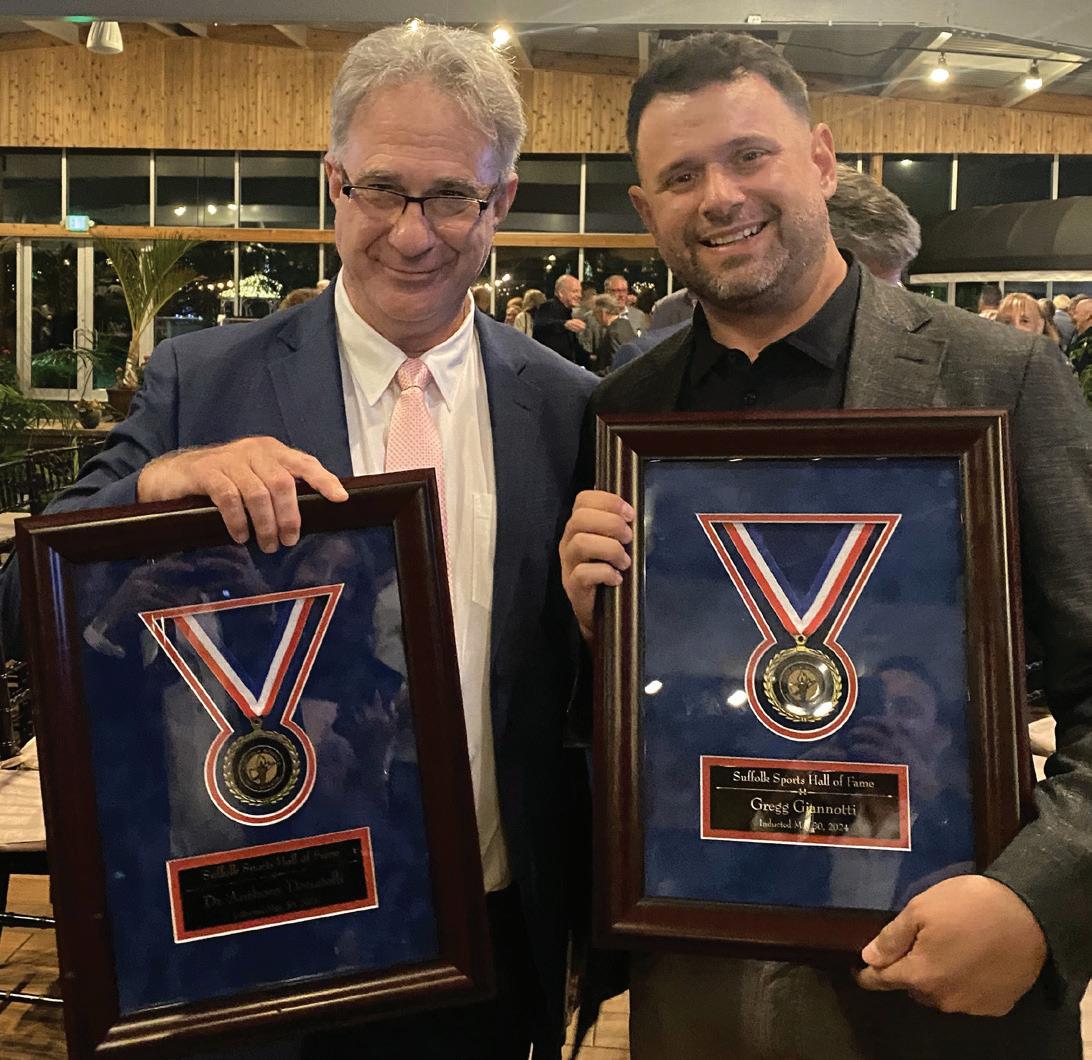
Anthony N. “Tony” Donatelli Jr., M.D., MPH, '80 was inducted into the Suffolk County Sports Hall of Fame in New York on May 25, 2024. He was previously inducted into the National Wrestling HOF in April 2019. Donatelli has been professionally serving the high school and college athletic communities in Suffolk (and Nassau) County for 37 years. “Classmate” inductees in 2024 include Keith Hernandez of the Mets, Ann Liguori of LPGA fame, NBA star Danny Green and WFAN sports talk show host of the #1 rated “Boomer and Gio Show,” Greg "Gio" Giannotti (formerly of WDKA-FM in Pittsburgh, pictured with Donatelli). Donatelli was honored for his medical attendance at over 1,350 football games, three decades of Suffolk County Wrestling tournaments, and 15 years of NYS tournaments. He serves on the Suffolk County and NYS Athletic Safety Committees. Donatelli says he and his nurse practitioner son Glenn serve as chief medical officers to 15 school districts on Long Island.
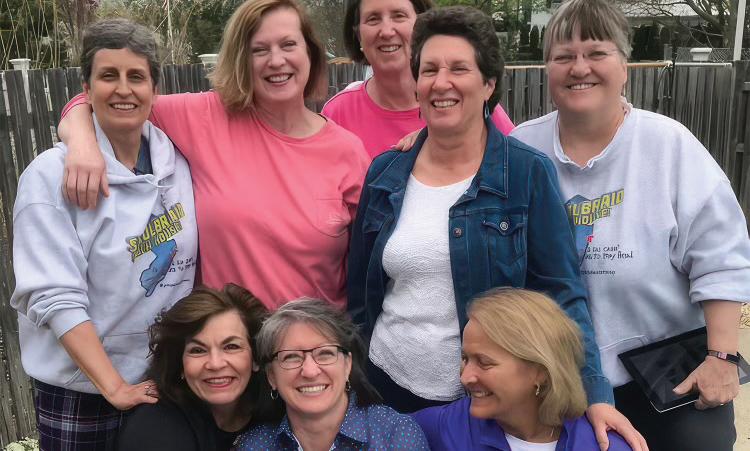
“The Few, The Proud, The Shore” reunion group began “officially” in 1979, with Allegheny women’s basketball team members Cathy Murphy ’78 and Dr. Karol Mackey ’79 taking under their wing the youngsters: Nancy Shoolbraid Griffin ’80 and Stacey Lyon ’80; Karen Smith Singer ’81 and Margaret Walters ’81; and Julie Kendall ’82. Lyon says, “We played all together only one season (197778) but that one year cemented a lifelong connection of seven AC grads and our eighth member, Mary Johnson, a true honorary Gator with us from the start. Forty-six years of loving friendship, reuniting annually through weddings, births, divorces, deaths, and the simple joy of being together at the Jersey Shore … teacher, scientist, nurse practitioner, executive director, geologist, environmentalist, naval commander. Proud to have risen, fallen, survived, always there for each other every step of the way, still united for over four decades.”
Mark D. Crantz shared a note about himself since leaving college: Crantz has worked in the health insurance industry for 40 years. His goal was to keep premiums low. According to him, he was an utter failure. He apologizes to the Class of 1974 and all the classes, before and after. Crantz is now retired and splits his time between Michigan and Southern California. In addition to crying over his wasted professional career, Crantz now writes a humor column, “Pet Peeves,” for The Laguna Beach Independent newspaper and golfs. “One pastime is fun and one is not,” he says. “Guess which one is not fun?”
Jeanne Julian's poem "Mentor," a tribute to the late Alfred Kern '48, novelist and Frederick F. Seely Professor of English at Allegheny, was published in Streetlight magazine, September 2024.
Direction in Shelburne, Vermont, in June 2024 and is now practicing as a spiritual director companion. She is grateful for her enriching school experience and is “honored to companion her directees on their spiritual journeys, including those for whom a spiritual tradition or faith style resonates, as well as for those who have no particular faith.”
Cornel Osadsa says, “Now living in Avis, Portugal, with my wife, Deborah. Rejuvenating Pego do Penedo, an abandoned 22-acre olive orchard. We had our first harvest this year: 8,001 kilograms! I’m also sculling on the Maranhão Reservoir, and coaching chess at two local schools.”
children received their respective doctoral degrees: Savannah has her doctoral degree in molecular genetics from UConn, and Ellery has his doctoral degree in mechanical engineering from UMD. Both children are applying their skills via their respective employers,” he says.
Chris Allison shared that History Buff Media announced the publication of “Hit It!: A Tech Startup Story and 7 Rules For Entrepreneurs” by Allison, former CEO of Tollgrade Communications Inc., Allegheny College Entrepreneur In Residence, and member of the Allegheny College Board of Trustees.
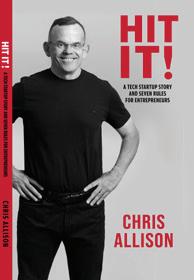
Steve Feldmann continues to enjoy retirement from his fiduciary management and nonprofit development careers, living in his hometown of York, Pennsylvania. He and his wife, Susan, have four adult children (one from his first marriage) and three grandchildren. Feldmann fought off prostate cancer with a 2023 surgery. He keeps active as a member of the Rotary Club of York, the board of the Spiritrust Lutheran Foundation, and as a member of the Investment Oversight Committee of the York County Bar Foundation. Feldmann continues his love of Civil War history and is a member of the Gettysburg Civil War Roundtable. He also plays “an astonishingly erratic game of golf.” He would love to hear from fellow Gators at SFFsstuff@icloud.com.
Martha Folley graduated from the All Souls Interfaith School of Spiritual
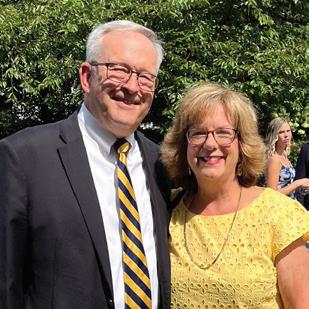
Mary Jo Meenen ʼ81 has joined the William Bentley Legacy Society, a recognition for those who have provided for Allegheny through wills, charitable gift annuities, and/or charitable remainder trusts, or have designated the College as a beneficiary of their life insurance or retirement assets.
Special recognition goes to David Love '82; Ron Cole ʼ87 and Nancy Frambes ʼ87; and Nancy Yovetich ʼ87 and Marty Kraut, who became members of the President’s Society. The President’s Society honors donors who have lifetime cash giving of $100,000 or more to Allegheny College.
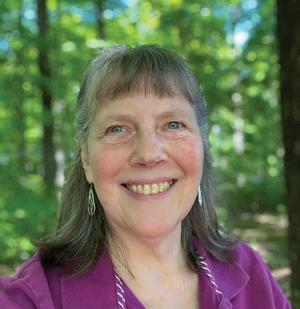
Dr. Donald Klein was hired as a senior director CMC regulatory at Axsome Therapeutics Inc. on May 1, 2023. Klein had consulted at Axsome from 4Q 2019 through 1Q 2022 on two different new drug applications. On July 1, 2024, Klein was promoted to executive director CMC regulatory. Specifically, he directs the CMC regulatory strategy of preIND and phase 1, 2 and 3 projects, as well as new drug applications and the postmarketing submissions. “In 2023, both
Tim Price moved to sunny Tucson, Arizona, and purchased a home with wonderful mountain views. “I am enjoying the beautiful desert scenery, biking, and hiking trails. I plan to spend the rest of my life without ever mowing a blade of grass or raking any leaves,” he says.
Dr. Timothy Temple has been practicing endodontics in Orlando and Lake Mary Florida since 1997. He served in the U.S. Navy and with the U.S. Marine Corps. Temple is the past president of the Dental Society of Greater Orlando and the past president of the Florida Association of Endodontists.
Missy Fovel Taylor says, “After spending 35 years chasing a corporate career in finance operations/compliance, I finally came to the realization that my purpose was something much greater. I left the corporate world two years ago to pursue my calling as a psychic intuitive and medium. As strange as that may sound it is the most fulfilled I have ever felt. My gifts are plentiful and are used in many ways to bring clarity and guidance as well as solving missing persons and homicide cold cases. My clients come from all over the world. For more info, please visit 3rd-eye-open.com. Sending you all good vibes!”
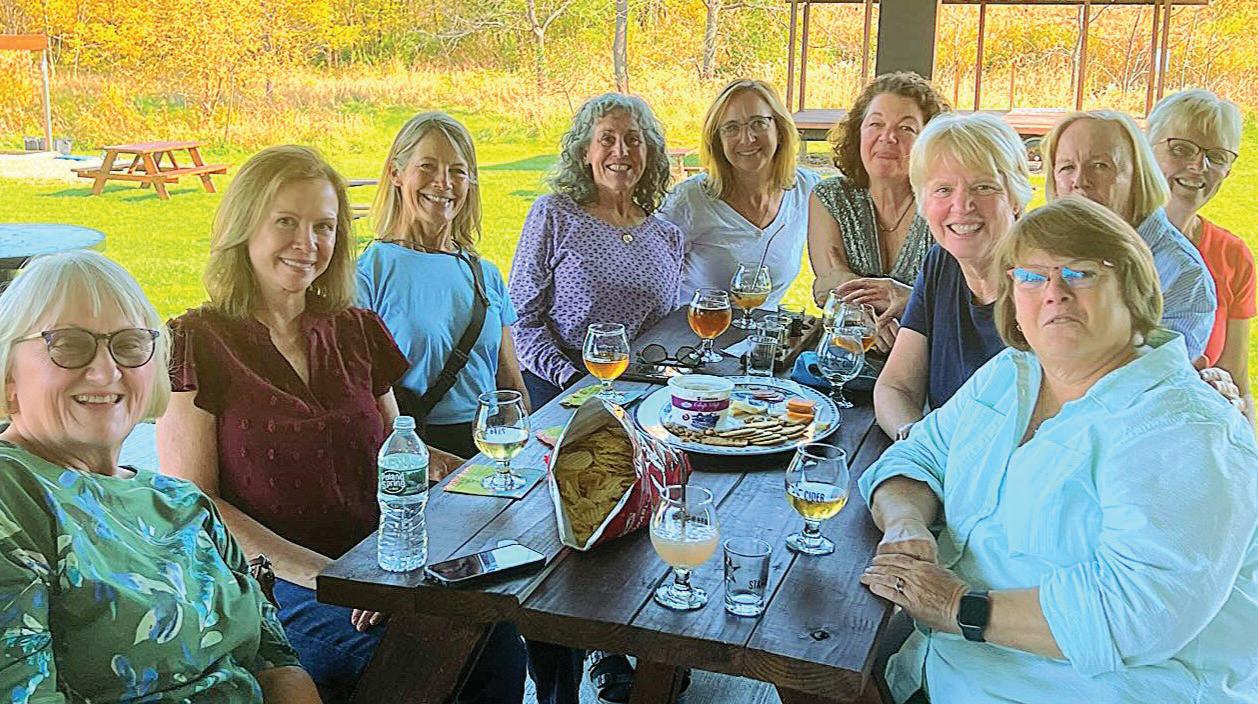
Georgianna “Gigi'' LaRocque Price '80 says, “Forty-eight years ago, 1976, this group of women all converged on Walker Annex. We were 'baptized by fire,’ so to speak, and continued to keep in touch and support each other since. For the last 10 years we have reunited each year in the Finger Lakes area of New York. We come from eight different states: north, south, east, west. We have so enjoyed these years and the bond that's only gotten stronger. Here, we're at a cidery on Canandaigua Lake enjoying the autumnal beauty of the area. From left to right, all from the Class of 1980: Susan Thompson Francisco, Colleen Slater Richardson, Susan Husted Burrows, Price, Ellen Spetrino Raines, Laurie Holding Frey, Kim Mance Blauvelt, Mary Finlay Luttman, the Rev. Sarah Daniels Roncolato, Lisa Rackliffe Goslin. Absent: Faith Lyman Ham. RIP: Peggy Brayer Findle.
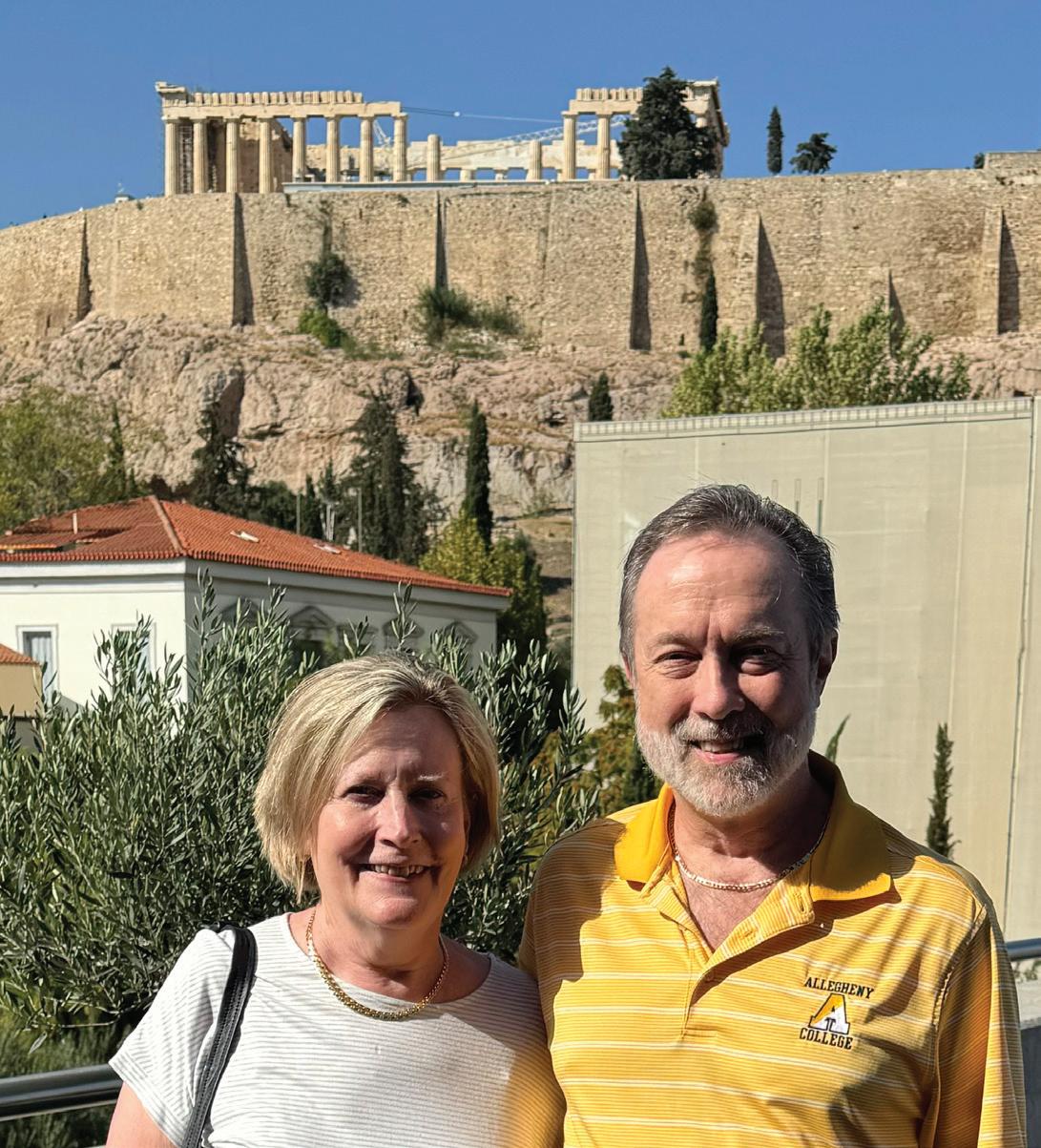
"Allegheny in Greece.” Brian Smithley ’84 and his wife, Mary Grace Kelly, took their retirement trip to Athens and the islands of Greece. Smithley was finally able to experience, first hand, some of the archeological wonders that he learned about in Dr. Samuel Edwards’ Greek archeology class in the early ’80s. “A trip of a lifetime,” he says.
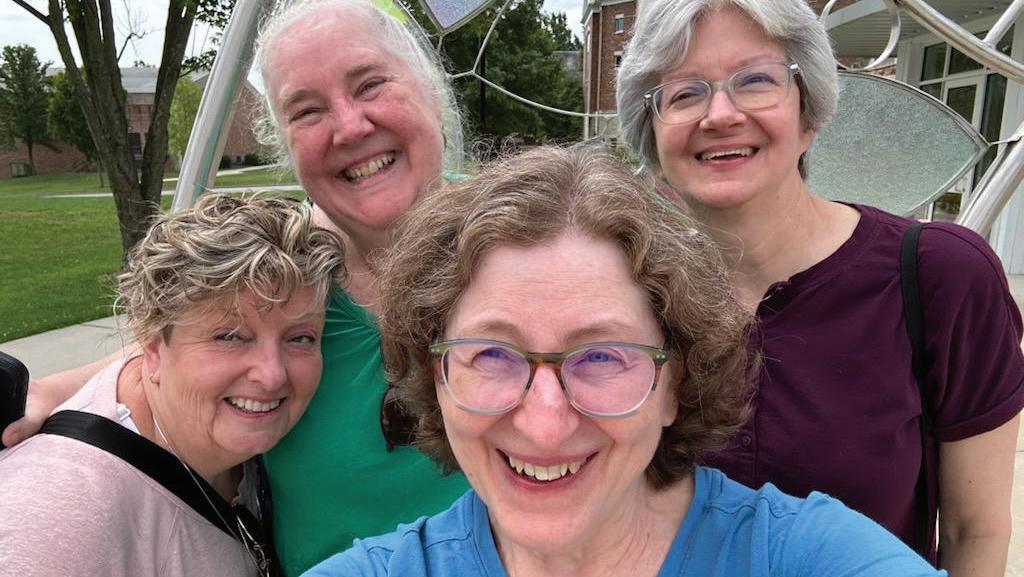
Two sets of Allegheny roommates enjoyed a getaway weekend in central Pennsylvania. Pictured left to right: Kim Coughlin Patterson '81, Melanie Cookenham Savidis '82, Dr. Beth Schmidt Porter '82, and Sue Gola '81.
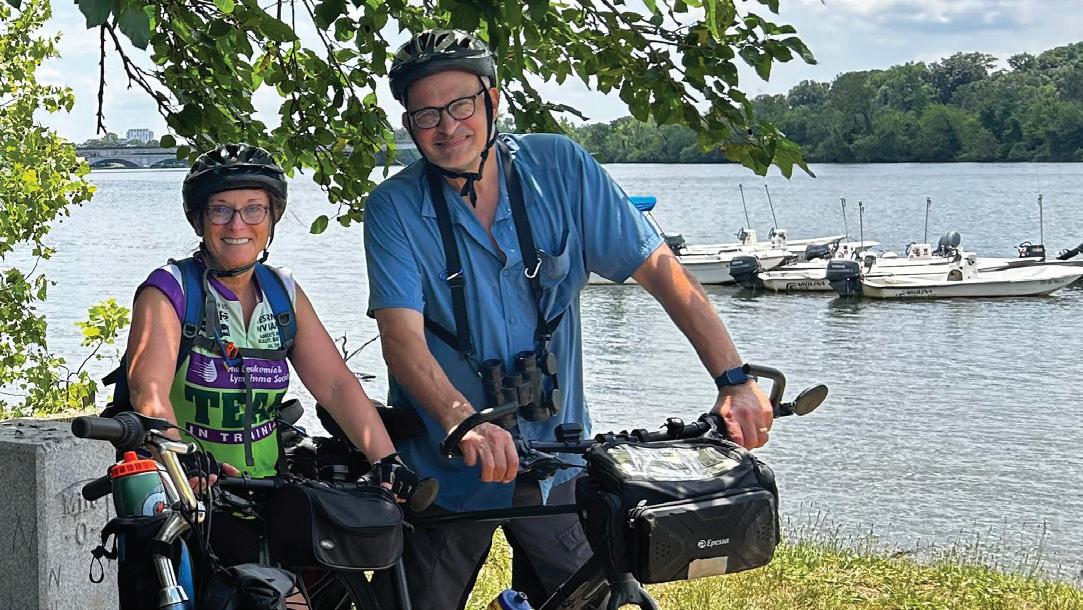
Ken Knapp ’82 and Alysia Schwartz Knapp ’83 biked from Pittsburgh to Washington, D.C., via the Gap and C&O bike trails in June 2024. This picture was at the mile marker 0 monument on the Potomac in D.C. Their ride was to commemorate Alysia's retirement in January. Ken and Alysia met at Allegheny and celebrated their 41st wedding anniversary in 2024.
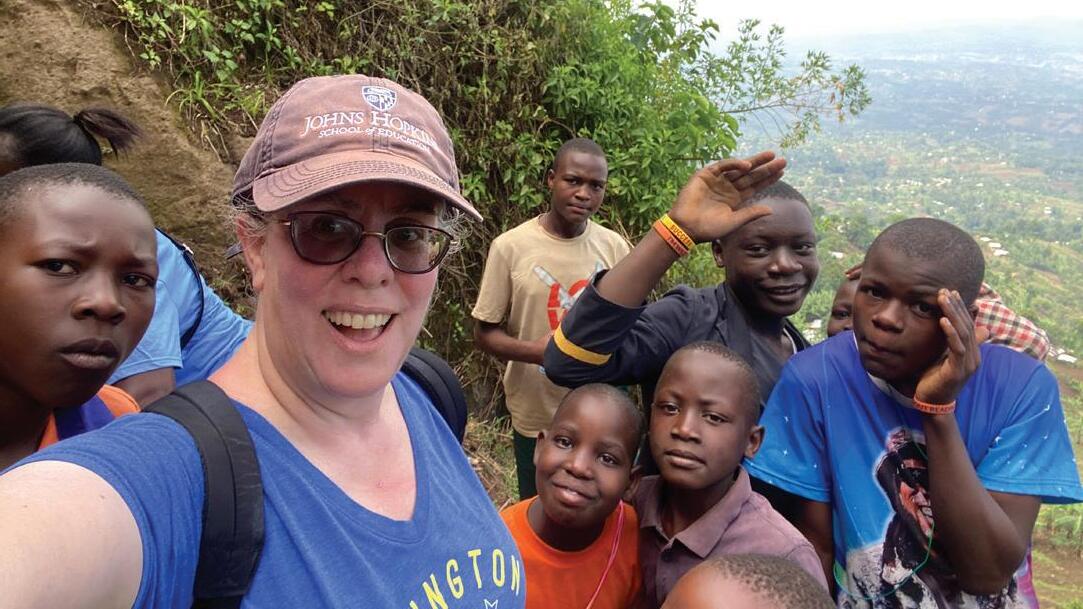
Inga Tannenbaum Schoenbrun ’89 serves as the assistant principal at Arlington Traditional School in Arlington, Virginia, and volunteers for REACH for Uganda, providing teacher professional development, supporting adolescent girls’ education, and providing access to clean water and access to healthcare services. Schoenbrun and her husband, Ben, are sponsoring both a water project and a $200,000 matching sponsorship for STEM programs at the school in Bududa District of rural Eastern Uganda.

By Jennifer Rignani
Dr. Chris Brussalis ’87 doesn’t make it to his family farm in southern Allegheny County much, but when he does, he’s reminded that in the dirt and among the animals, a person is a person. The nearly 50 head of cattle sure aren’t impressed that he was inaugurated as the ninth president of Point Park University and is the former CEO of the highly esteemed Hill Group Inc.
“I bought the farm from my parents, hoping that my kids would grow up like I did in that environment, but I’ve just been so busy I don’t get down there as much as I’d like,” says the demonstrably humble Brussalis.
It’s no wonder he doesn’t get to the farm. Brussalis is also adjunct professor of management and policy at the Heinz College of Carnegie Mellon University. He served as chairman of the economic development faculty with the Tri-State Leadership Academy, housed at West Virginia University, where he developed curriculum and lectured in strategic planning, management, leadership, and economic development on behalf of the Kellogg Foundation. He also serves on several other boards.
Among many other regional and national business leadership endeavors, he managed the New Idea Factory, the largest economic development transition of a metropolitan region in the history of the United States at the time. Brussalis is a graduate of the notable Leadership Pittsburgh, a network of regional leaders and decision makers.
Brussalis was selected as one of the “Pittsburgh Power 100,” highlighting the region’s most influential leaders. He also received a “C-Suite Award” as an outstanding executive who made an impact in his organization and the region. The Pittsburgh Business Times selected Brussalis as one of the region’s “Top 20 Changemakers” and “Fast Trackers,” and Pittsburgh Magazine recognized him among their “40 Under 40” and as one of “Pittsburgh’s 50 Finest.”
In 1998 he received a Blue Citation from Allegheny for a lifetime of outstanding service to his alma mater. Brussalis was also selected by the Secretary of the Air Force as one of 100 distinguished American leaders to attend the 47th annual National Security Forum at the Air War College at Maxwell Air Force Base.
He says the combination of his major in psychology and minor in biology at Allegheny set him up for success. “Really neuroscience, but the liberal arts education enabled me to run circles around others when I graduated.” He thinks the same about his daughter Katherine Stancil ’23, who majored in business and math and completed Allegheny’s 3-2 program with Carnegie Mellon, a program that he developed over two decades ago. Katherine was one of Brussalis’ grad students, which was a once-in-a-lifetime treat.
“The training you get from a liberal arts institution makes you a broader thinker, gives you exposure to a lot of different thoughts and ideas, and makes you maybe a little more interesting person,” says Brussalis.
Being extremely engaged on campus as a student helped boost his confidence and connections. He loved his time as a resident advisor (RA) and resident director (RD), managing a staff at such a young age.
Brussalis also counts being a three-sport varsity athlete as invaluable to learning leadership skills.
He was also a student leader in his fraternity and then, later in life, becoming president of his international fraternity, one of the largest in the world. Growing the international fraternity’s membership by 55% as well as its endowment was a key accomplishment. But it has not always been a straight path.
Going back to his time as an RA and RD, he says, “I can look back at some hard decisions. I had some successes, and I had some failures. But those were learning experiences that enabled me to make more informed decisions that I had to make when things were really on the line, when my career was on the line, or when there was a lot of money on the line. I’m very grateful for those experiences that I had at Allegheny.”
He knows that every fellow Gator is made of the same stuff, so he is mindful of investing in alumni and students when he has opportunities to fill. Brussalis says, “I’ve always employed Allegheny alumni in my company.”
Brussalis credits the acceleration of his career to an Allegheny reunion of class chairs when he was a young professional. He met George Hill ’43 at a time when the titan of business was on the verge of selling his Hill Group management consulting firm. Hill took a shine to him, liking their connection through Allegheny, and gave the 28-year-old Brussalis a huge break.
“I didn’t even know what the word vendor meant, and here I’m in a boardroom with senior executives of Rubbermaid, then Fortune magazine’s most admired corporation. That was the value of an Allegheny alumni connection,” recalls Brussalis.
Now Brussalis considers himself to be in the fourth quarter of life. He is deeply grateful to lead Point Park University and makes the most of every single day.
“I don’t know exactly where I am on the game clock. I do know that the clock’s going to run out. Tomorrow, 20 years from now, who knows? It’s all about how many people you can impact before time runs out.”
Matt Michalski has been appointed vice president of Claims Programs & Shared Services at Amerisure Insurance. Michalski brings over three decades of expertise in the property and casualty insurance sector. He has a bachelor’s degree in political science from Allegheny and a Master of Business Administration from the State University of New York at Buffalo.
Shawn D. Woodie, A.I.C, C.I.C., celebrated 25 years with Erie Insurance, where he continues to

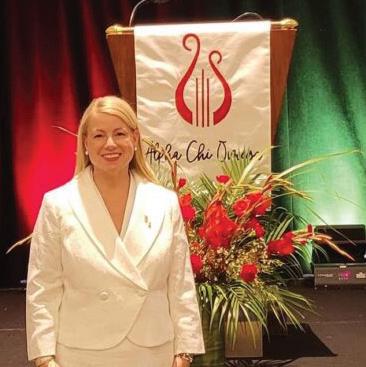
By Katheryn Frazier
manage first party litigation against the company. He co-presented at the Property & Liability Resource Bureau (PLRB)’s National Conference in April 2024 in Boston on “Appraisal: The New Normal.” Woodie and his fianceé have been traveling to Mexico, the Dominican Republic, Costa Rica, and the cold streams of Montana with friends and family.
Joy Kosiewicz was one of two individuals promoted to the newly created roles of vice president, associate general counsel at Akron Children’s. In her new position, Kosiewicz has primary responsibility for corporate transactions, health care-related matters and the day-today operations of the legal department. She joined Akron Children’s in 2017 as associate general counsel and in 2023
provided leadership as the interim chief legal officer. Kosiewicz received her bachelor’s degree from Allegheny and her Juris Doctorate from Case Western Reserve University School of Law.
Elise Radina, Ph.D., has been appointed associate provost at Miami University. Most recently, she served as associate dean for the Graduate School. She’s also a professor in the Department of Family Science and Social Work and previously held positions as associate dean for research, faculty development, and graduate education and as chair of Family Science and Social Work. After receiving a bachelor’s degree from Allegheny
continued on pg. 39
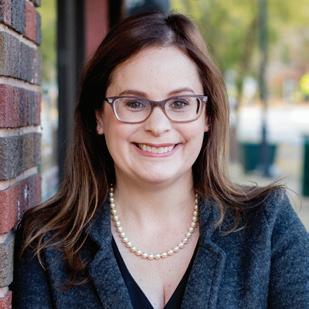
When Jennifer Daurora ’99 was invited to join the Alpha Chi Omega sorority, she never would have imagined she’d be elected as their national president one day.
Daurora is the second woman from Allegheny to become the national president of Alpha Chi Omega. The first was Charlotte Weber Seipler (class year unknown), who served from 1894 to 1896.
“It is an honor and privilege to serve Alpha Chi Omega and our members as national president. I am grateful for the generations of women who came before me and ensured that this experience was available for me. I am excited to pay it forward and ensure that Alpha Chi Omega is ready to support the next generation of women,” reflects Daurora, who majored in economics. “While volunteerism has always been important to me, giving back and being in service to something bigger than yourself was amplified by my experience at Allegheny.”
The National Council is Alpha Chi Omega’s governing board of directors. As chair of the board, Daurora will collaborate with the
chief executive officer and fellow board members to shape the strategic direction of the organization.
Originally wanting to get involved on campus, Daurora engaged with the Panhellenic Council in various vice presidential roles until she was elected president. This opportunity led her to attend regional conferences where she was exposed to volunteerism more broadly. She remained involved with Alpha Chi Omega after graduation. Daurora credits her Alpha Chi Omega experience with developing her leadership skills and building her network while giving back.
“Becoming a member of Greek Life at Allegheny is a fantastic opportunity! Not only does joining a fraternity or sorority help create a sense of community and a home away from home, but it also provides excellent leadership training and opportunities to network with alumni,” says Daurora. “While I graduated from Allegheny more than two decades ago, several of the women I met in Alpha Chi Omega remain my closest friends today. I am still connected with several of the women I joined Alpha Chi with when I was 18 years old.”
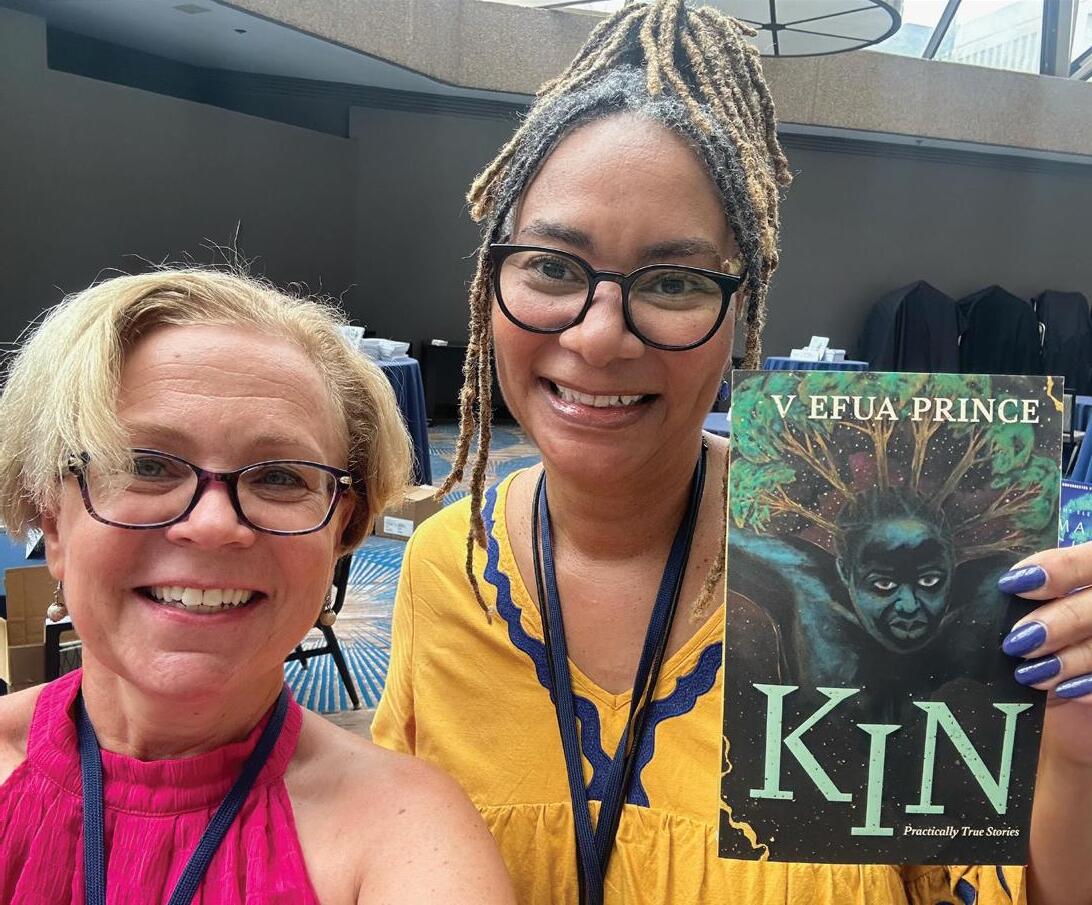
During the “New Voices New Rooms” independent booksellers conference in Arlington, Virginia, V Efua Prince, former faculty and mother of two alumni, along with Traci Cothran ’90, introduced Prince’s “Kin: Practically True Stories,” released in August from Wayne State University Press. The cover art was produced by Imani Bell Prince ’17 while a student of fine arts. “Allegheny College was well represented!” V Efua said.
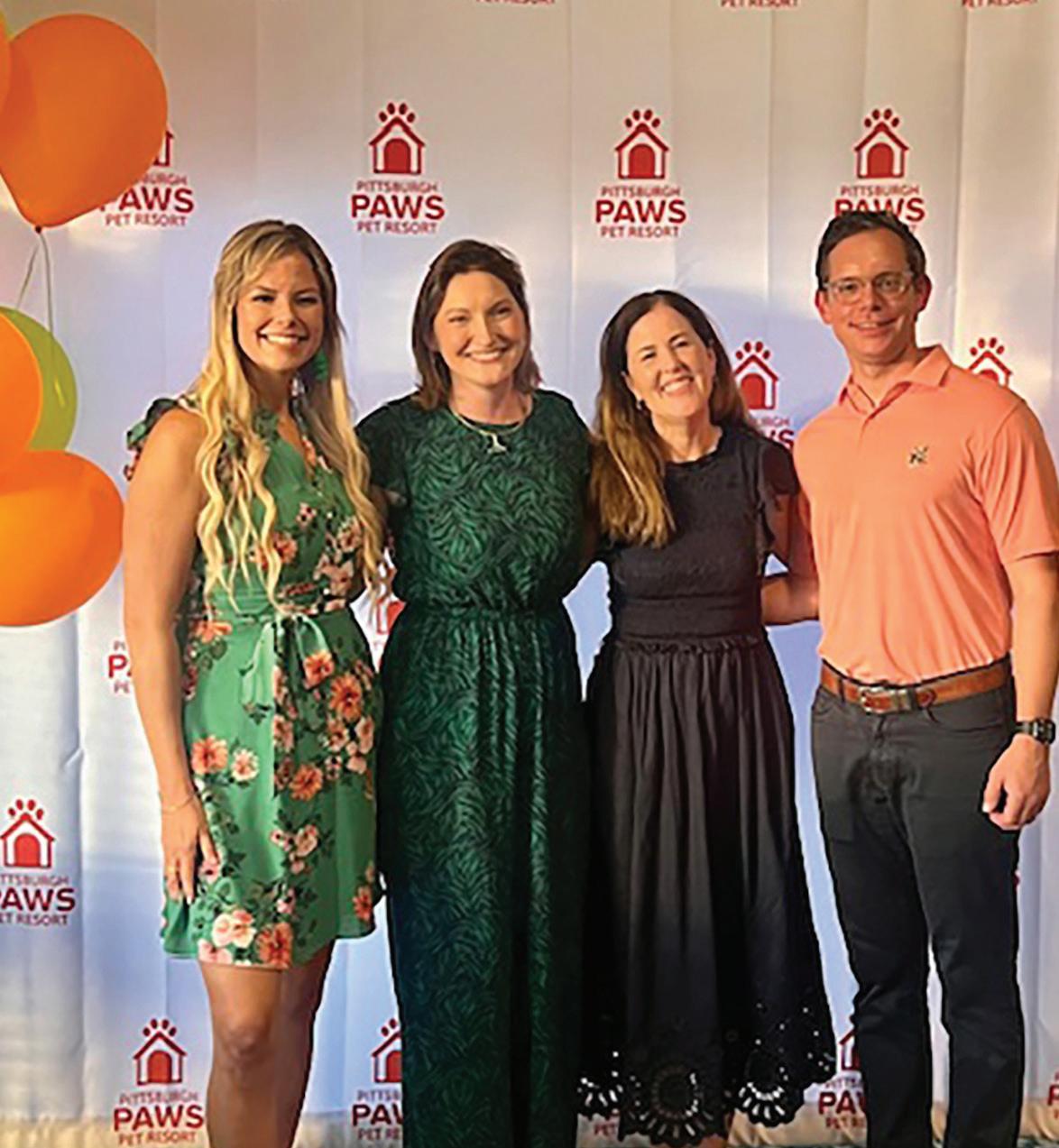
Jen DeSalvo '07, owner of Pittsburgh Paws Pet Resort, marked the 10th anniversary of her business with a celebration on June 13, 2024, attended by numerous guests, including fellow Allegheny alumni. Pictured left to right: DeSalvo, Reagan Storer DeLattre '05, Sally Barrett '92, and Jeff Weimer '05.

Several Allegheny alumni, current students, and Creek Connections employees attended the North American Association for Environmental Education conference in Pittsburgh in November. Those pictured are back row (left to right): Kaitlyn Royal Carlson ’24, Laura Branby; middle row (left to right): Laura Micco ’04, April Claus ’95, Wendy Kedzierski, Miranda Crotsley ’01, Sami Laurence Bortz ’14; and front row (left to right): Kelcy Wagner Marini ’15, Nikole Brugnoli Sheaffer ’98, Rachel Ditzenberger ’25, Laura Obergefell ’26
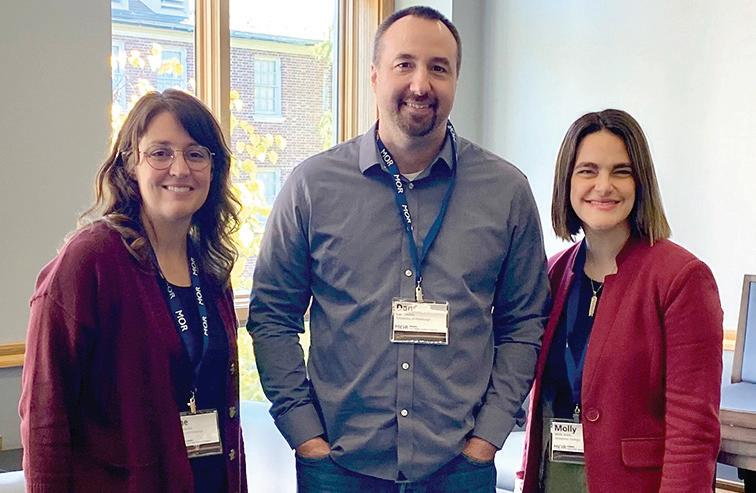
Molly Mattis Smith ’12, enterprise systems manager in Information Technology Services at Allegheny, was accepted into the 2025 KINBER MOR Leaders Program. Smith (pictured at right) joins two other Allegheny alums in her cohort, Jane Brennan Alexander '98 and Dan Ricketts '02, who both work at the University of Pittsburgh. The KINBER MOR Leaders Program, facilitated by MOR Associates, is an opportunity for Pennsylvania higher ed professionals, anchor institution leaders, and champions of digital equity to develop their workplace and leadership skills within a trusted framework. This program is designed to strengthen relationships and foster collaboration across the participating programs and organizations within the commonwealth, leading to greater statewide success in the digital equity and inclusion sphere.
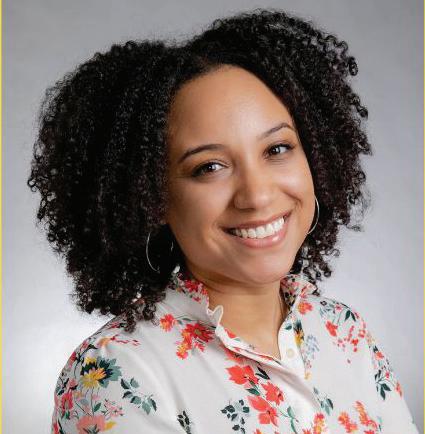
By Katheryn Frazier
Yazmin Infante Peña ’15 says that as a first-generation college graduate, Allegheny made her more versatile for her career and ultimate position at Carnegie Mellon University.
“Allegheny was a place that was so different than my upbringing … and I think that allowed me to adapt to different spaces. I honestly don’t think that if I had stayed in New York, I would have studied away,” says Infante Peña, who studied psychology with a minor in Spanish. “I had a lot of support from professors and students … it shaped where I am today and who I am as a person as well.”
After graduating with her bachelor’s degree, Infante Peña returned to New York to become a Head Start teacher. In 2017, she moved to Pittsburgh and joined nonprofits that supported underserved communities.
As a community education coordinator at the Epilepsy Association, she educated students, faculty, staff, school nurses, and first responders about epilepsy. Afterward, she joined Amachi Pittsburgh as a mentoring specialist to match students who have incarcerated familial relationships with a mentor.
She notes that her psychology background helped her work with families facing trauma, while her minor in Spanish helped her connect with bilingual families outside of work. Studying Spanish in college also deepened her identity as a Latina and helped her tap into the culture differently.
Furthermore, Infante Peña says her time as a student in service with Alpha Phi Omega, a student-led community service organization on campus, and the local Best Buddies chapter, which pairs individuals with others with developmental disabilities, influenced her decision to support nonprofits.
“I always really liked working with these communities, and Allegheny gave me that push … to be out in the community with the people of the town and work with them to create relationships,” reflects Infante Peña.
She simultaneously helped coordinate the local International Cultural Exchange Services chapter, matching international high school students with host families. Infante Peña credits Allegheny for opening up the opportunity since she studied away.
“[Studying away at Allegheny College] was a huge life-changing experience for me. That’s the biggest thing with Allegheny that I’m grateful for,” says Infante Peña. “I went to Seville, Spain, and I was there for the spring semester … it sparked my love of travel and learning about other cultures.”
Eventually, her experience working in study abroad services led to her role as a document manager for the Office of International Education at Carnegie Mellon University, where she now issues documents for international students and faculty to obtain their visas. Infante Peña also co-leads the Latine Faculty and Staff Alliance, a resource group that educates and plans social events.
“It’s really rewarding to be the person that helps give students an opportunity to study in the United States … and meet them in person when they finally arrive after having all that communication.”
Infante Peña continues to be involved in the Association of Latino Professionals of America (ALPFA) – Pittsburgh and the Pittsburgh Metropolitan Area Hispanic Chamber of Commerce. She also is a public speaker under “The Recovering No Sabo Kid” brand.
Join Allegheny’s Archivist Chris Anderson on Wednesdays at 3 p.m. Eastern for his weekly radio show, “The Allegheny Vault,” on WARC. The show features a mix of tunes alongside stories and tales from the Merrick Archives about the 200+ year history of Allegheny College.
and master’s from Miami University of Ohio, Radina earned her Ph.D. in human development and family studies from the University of Missouri, where she did her post-doctoral fellowship.
Scott Davis has joined Alliant Insurance Services as senior vice president within its Alliant Americas division. With more than two decades of experience in the insurance industry, Davis has been instrumental in developing risk management solutions that effectively mitigate client risks. Prior to joining Alliant, he served as vice president at a global insurance brokerage firm. He has a bachelor’s degree in economics from Allegheny and a master’s degree in insurance and finance from the University of Hartford.
Emily MacKinnon Dittman has been named director of the Syracuse University Art Museum, following 17 years of service. She previously served as the museum’s interim director for two years, leading operations, financial and strategic planning, alumni relations, fundraising, and communications and marketing, and managing a staff of six full-time and 14 part-time employees. Additionally, she directed the collections care team, overseeing cataloging, storage, environmentals, and the design and function of the collection database. Dittman earned a master’s degree in museum studies and a master’s in library and information science from Syracuse University and a bachelor’s degree in history from Allegheny.
Angela G. DiSanti has joined Goldberg Segalla’s Workers’ Compensation practice group in Pennsylvania. DiSanti has dedicated her practice to workers’ compensation law for more than 10 years, counseling and defending employers, insurance carriers, and third-party administrators across Pennsylvania, from Pittsburgh to Philadelphia. She received her bachelor’s degree from Allegheny and
her Juris Doctor from the University of Pittsburgh School of Law.
Marty Spieler became the head football coach at South Fayette High School (Pennsylvania). After playing at Allegheny, he coached at Georgia Southern, Allegheny, University of Cincinnati, Buffalo, Florida A&M, and Missouri State before returning to western Pennsylvania.
Carrie Lonsinger Mann, Esq., CLTP, was elected the 2024–2025 president of Pennsylvania Land Title Association. The association consists of title insurance professionals across the commonwealth. It works to create educational and networking opportunities for its members, promotes the importance of the industry, and pursues its legislative objectives. She is an underwriter for Old Republic National Title Insurance Company and lives outside of Philadelphia with her husband and their two boys.
Brendan O'Leary, Ph.D., a postdoctoral trainee in Wayne State University's Center for Leadership in Environmental Awareness and Research (CLEAR – Award #P42ES030991), has been awarded a prestigious K.C. Donnelly Externship from the National Institute of Environmental Health Sciences (NIEHS) of the National Institutes of Health Superfund Research Program (SRP). O'Leary's research focuses on the fate and transport of contaminants in groundwater, air, and soil, with particular emphasis on human health and exposure risks in urban environments. He received a dual Ph.D. in civil engineering and urban sustainability at Wayne State, a master's in geology at Wayne State University, and an undergraduate degree in geology and environmental science from Allegheny.
Dr. Katherine M. Bowser graduated with a Ph.D. in education, with a concentration in education policy and a secondary emphasis in econometrics/
quasi-experimental methodology, from George Mason University in fall 2024. Her research examines state and district school policies, teacher effectiveness, and K-12 educator labor markets. Upon completing her degree, Bowser accepted a position as a researcher for the National Council on Teacher Quality (NCTQ) where she will continue her research on policies that support educators and promote equitable access to high-quality teachers. This follows more than a decade of experience in higher education administration, edtech, and K-12 policy research.
Kate Holquist Flickinger has been selected as one of three NASA-funded Translational Research Institute for Space Health's (TRISH) 2024 postdoctoral fellows. The fellowship is a space health program intended to launch the careers of a new generation of researchers tackling various challenges involved with human space exploration. TRISH’s postdoctoral fellowship program supports early-career scientists pursuing research with the potential to reduce the health risks associated with spaceflight. Her two-year fellowship will focus on metabolic measurement, manipulation, and countermeasure strategies in healthy and clinical populations.
’19

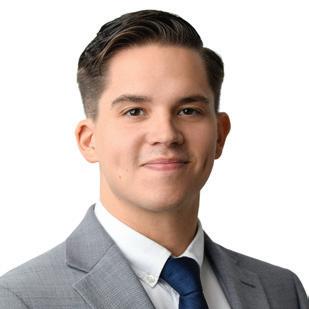
Attorney Colton M. Johnson Taylor has joined the civil rights team of Romanucci & Blandin LLC, a national personal injury firm primarily based in Chicago. He received his law degree from the Loyola University Chicago School of Law and his undergraduate degrees in political science and history from Allegheny.
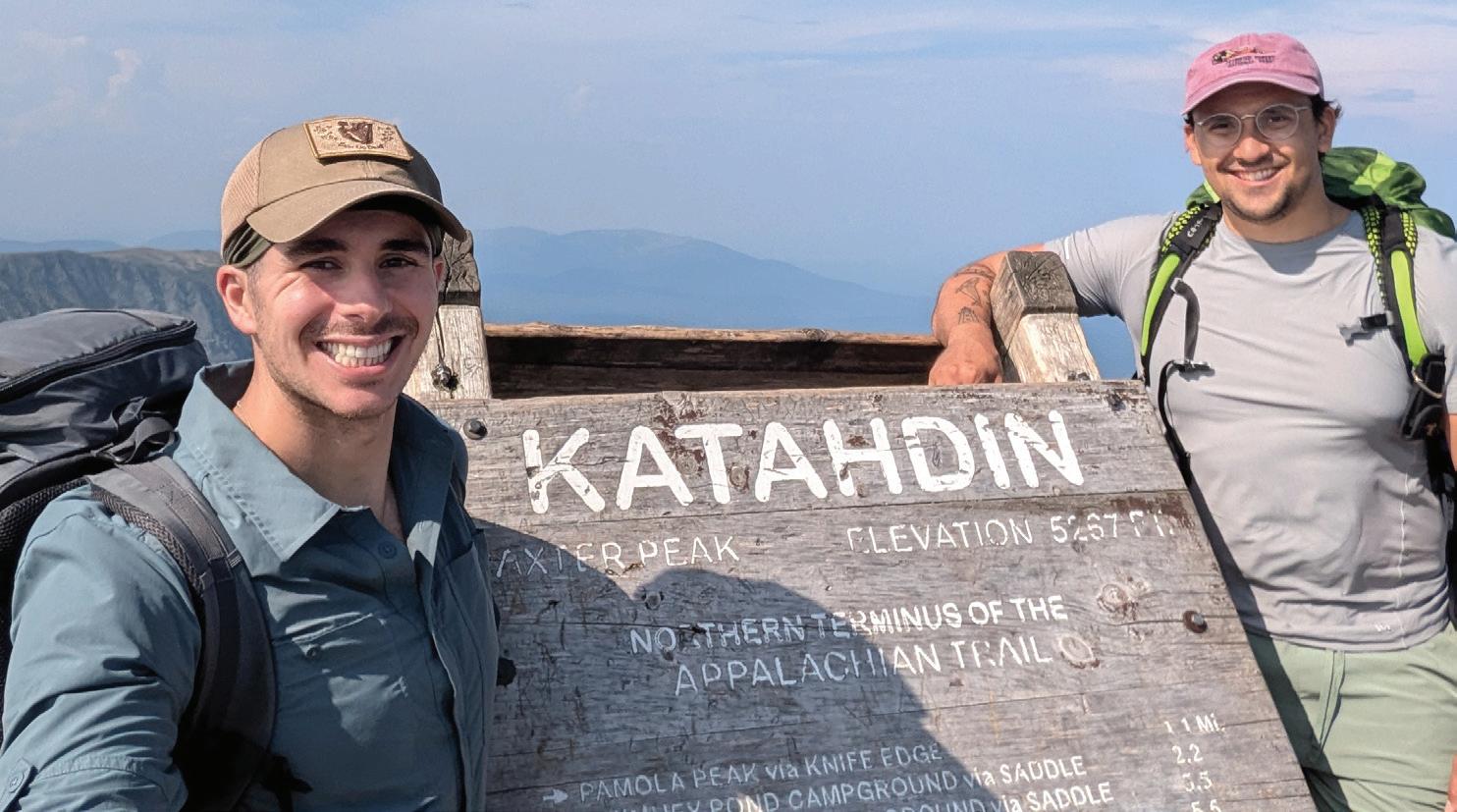
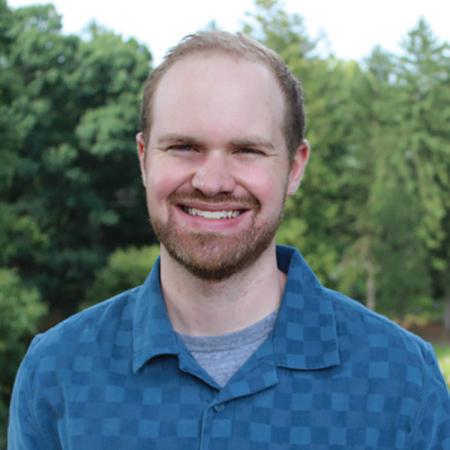
By Katheryn Frazier
This summer Race Mahoney '18 (pictured left) and Anastasios Mihalopoulos '19 (pictured right) climbed to the northern terminus of the Appalachian Trail, Mount Katahdin (5,267 ft). “Although we now live thousands of miles apart, Anastasios in New Brunswick, Canada, and myself in Florida, our friendship has remained strong since our time at Allegheny and has afforded us the opportunity to overcome remarkable challenges together,” Mahoney said.
When government and sustainability intersect, tremendous change can happen. Ethan Woodfill ’22 is part of this change as the glass program coordinator at the Pennsylvania Resources Council, where he oversees their award-winning statewide glass program.
After graduating with his bachelor’s degree from Allegheny, Woodfill spent a year working on a sustainability project at Oberlin College. Today he connects with glass manufacturers, processors, waste haulers, and municipalities, which have collected 20 million pounds of glass for recycling.
“My professors, courses, and peers consistently pushed me to think about real-world problems. The connections I made between classes and majors are so relevant to the real world. Allegheny prepared me to collaborate with others and to identify key stakeholders and changemakers in the community,” says Woodfill, who majored in environmental science and sustainability and political science.
The glass program has earned the Governor’s Award for Environmental Excellence and supports the 12,000 jobs in Pennsylvania’s glass industry.
“It is so interesting, and recycling and waste is something that affects everyone. Every day is different. I get to teach people how
to make more sustainable choices and see how recycling works in action,” says Woodfill. “I also never thought I’d be tasked with ordering 25-yard dumpsters!”
Not only did Allegheny enable Woodfill’s drive toward a more sustainable future, but it supported his passion for writing. He reflects that his time as editor-in-chief of The Campus developed his leadership skills and made him unafraid to ask difficult questions.
Woodfill continues to freelance as an environment and health reporter for NEXT Pittsburgh. In 2024, the Pittsburgh Black Media Federation awarded Woodfill first place in the Health/Medical/ Science/Environment category for non-daily newspapers and news services at the Robert L. Vann Media Awards.
Woodfill notes, “Freelancing, for me, is an outlet to use my journalistic skills to learn more about the cool things happening in Pittsburgh. It’s also a great way to network and learn about other people’s careers.”
In his free time, Woodfill is a board member for Communitopia, a Pittsburgh-based environmental nonprofit that provides climate change education. Furthermore, he plans to attend the University of Pittsburgh to pursue a master’s in public administration with a focus on energy and the environment.
Matthew Dugan worked at the Ohio Star Theater (Sugarcreek, Ohio) in their Sight and Sound production of “Ruth.” Dugan played Elimelech and understudied the male lead role of Boaz. The show ran through November 9, 2024.
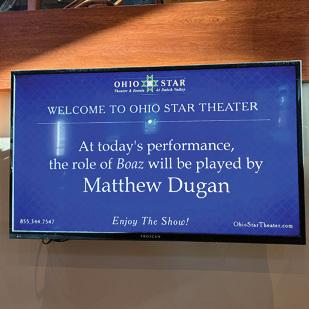
London Dejarnette was selected for the Congressional Hunger Center’s Alumni Council, which supports the Hunger Center's mission to develop, inspire, and connect leaders in the movement to end hunger, and to advocate for public policies that create a food-secure world. Dejarnette was the food programs coordinator at Oberlin Community Services in Oberlin, Ohio, where they oversaw food pantry programming for over 400 families a week. They started a
new role as communication and outreach manager at FamilyCook Productions in New York City. Dejarnette received their bachelor’s degree in environmental science and sustainability from Allegheny.
Abby Collier ’03 married Luke McAllister in Atlanta, Georgia, on June 29, 2024. They live in Pittsburgh, Pennsylvania, where Abby is editorial director of the University of Pittsburgh Press.
Elijah Dennis ’16 and Alexandria Holmes Dennis ’17 got married in Pittsburgh on September 21, 2024. In attendance were fellow Gator alumni: Dan Kerschner ’17, Cari Koerner ’17, Ashley Mulryan ’17, Kayla Boleratz ’17, Kurt Holmes ’88, Gina Lucas Holmes ’91, Kristen Migliozzi ’17, Matthew Bocchi ’13, Alyssa Lisle ’17, Jackie Verrecchia ’17, and John Dennis.

Tim Courson ’09 and Emily Doherty Courson ’11 welcomed their son, Charles, in June 2024.

Hillary Wilson Santel ’12 and George Santel welcomed their son Ezra on February 3, 2024. The Santel family lives in Pittsburgh, Pennsylvania.
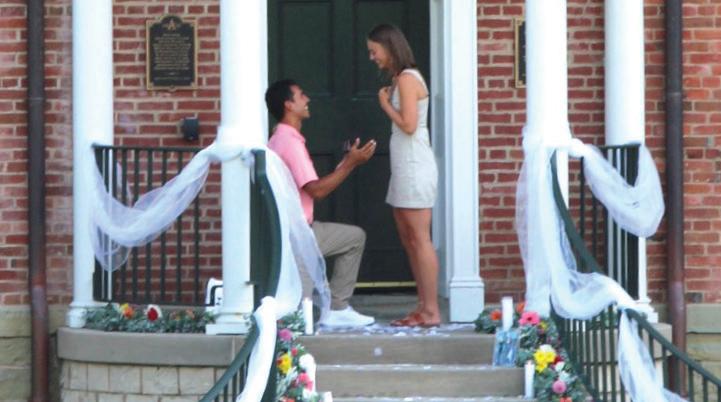
Brendon Urso ’20 and Jordan Mehalko ’22 were engaged on August 2, 2024, at the steps of Bentley Hall.
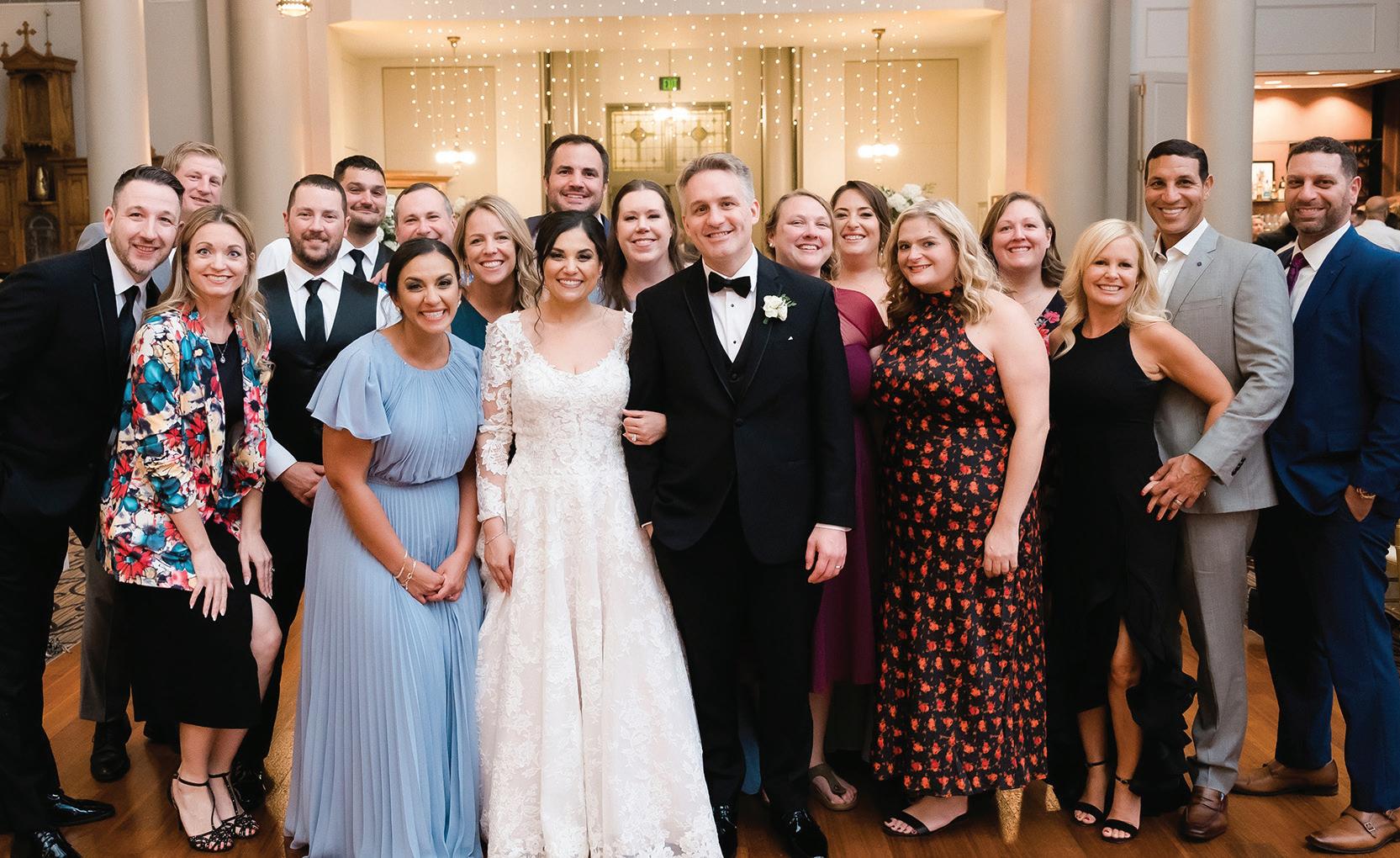
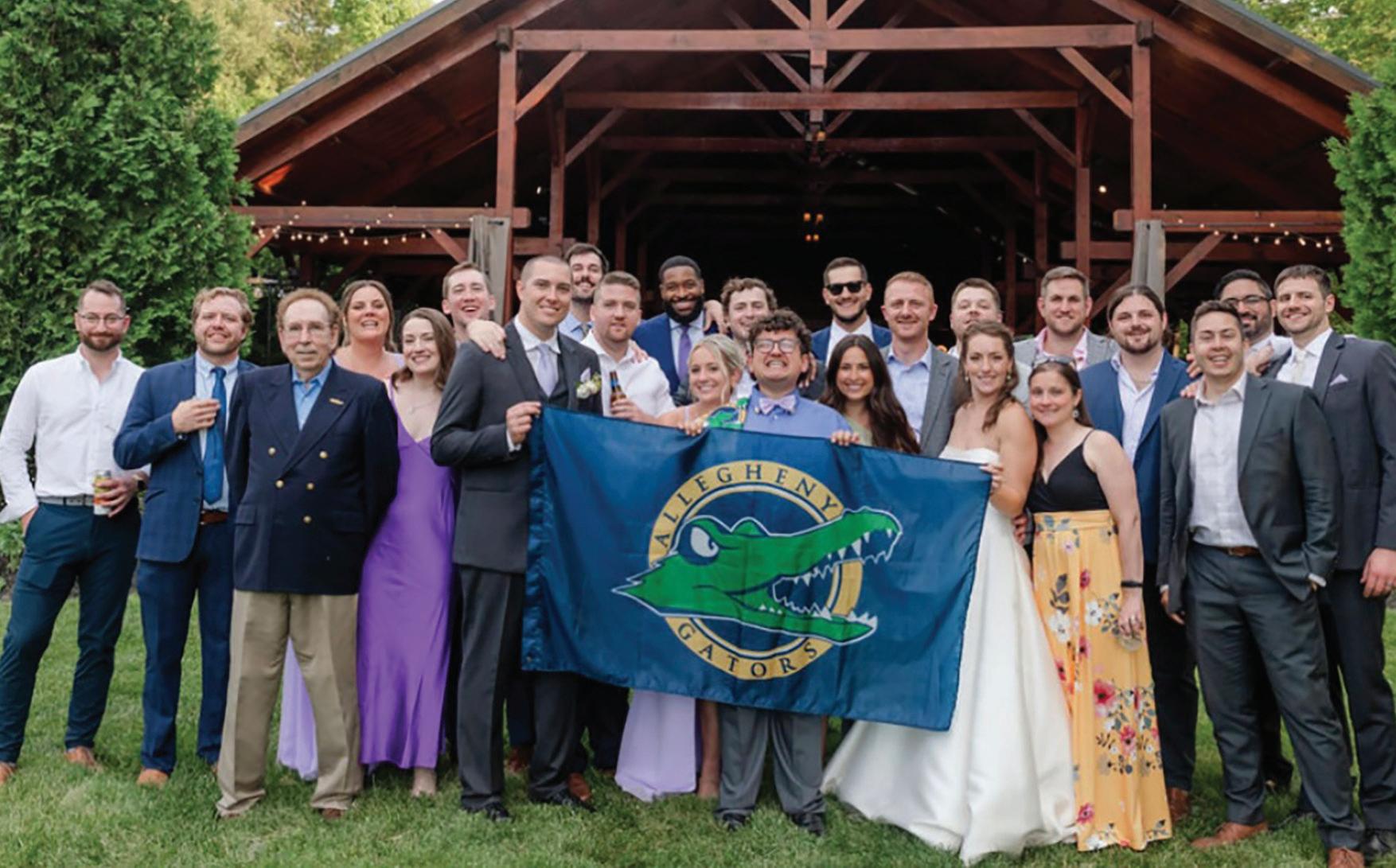
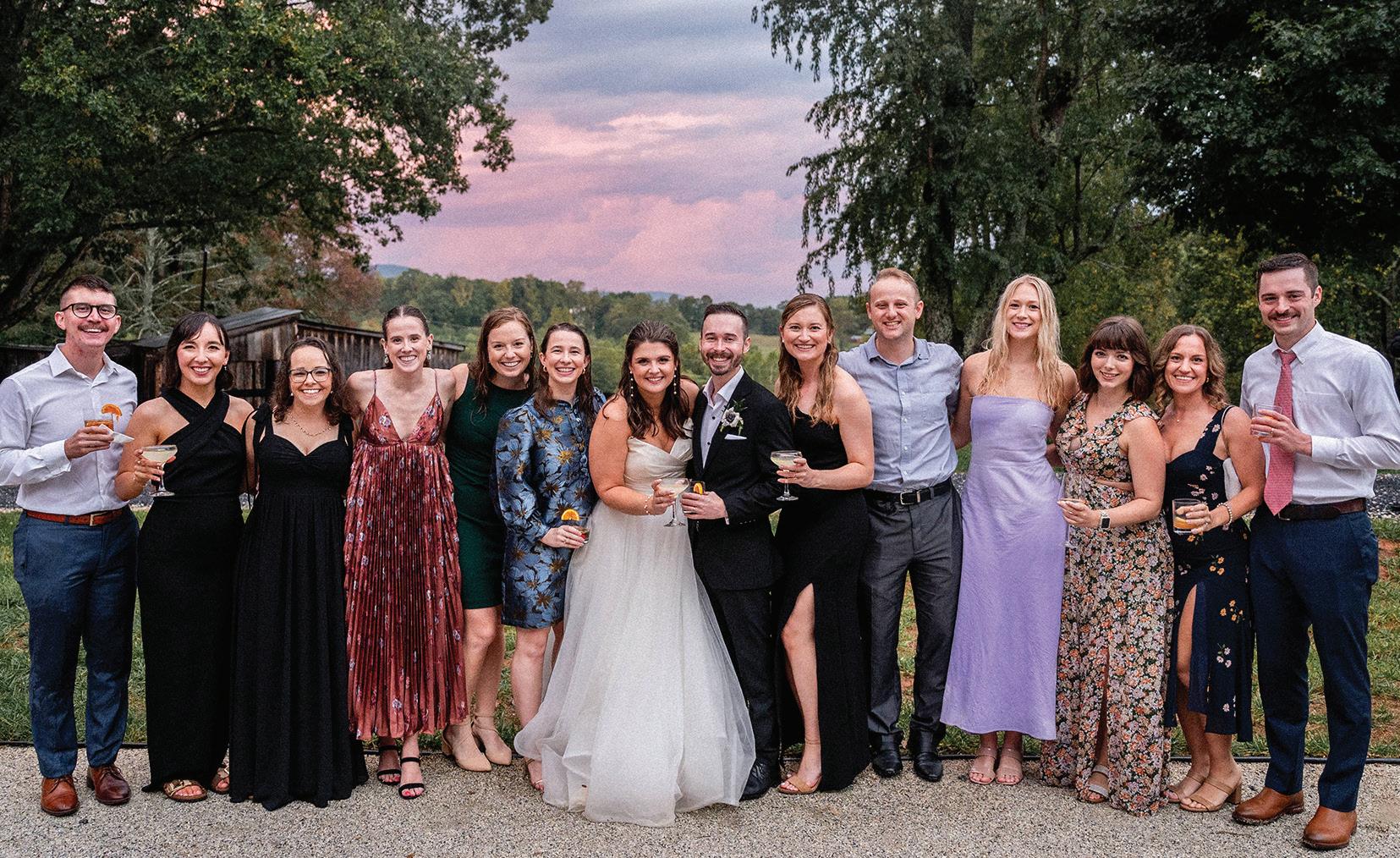
Andrew James Bosh ’06 and Marina Rezk Bosh ’09 were married on September 14, 2024, in Pittsburgh, Pennsylvania. Many other Allegheny alumni were in attendance, including Dr. Monica Rezk Hudson ’11, Aubrey Crognale ’09, Betsy Whitman Fredell ’09, Abby McDonald Seeley ’09, Ashley Steckel ’08, Rebecca Sorenson Van Tassel ’09, Leland Meyers ’09, Grant Rozich ’09, Katie Kump ’09, Brandon Perpich ’06, Kristen Page Perpich ’06, Matt Rodenbaugh ’06, Carey Zehnder ’07, Chip Moon ’07, Dr. Mark Matta ’99, Dr. Andrew Matta ’00, and Jill Cooper Matta ’01.
Robert Theiss ’14 and Maggie Zimmerman ’17 were married on May 25, 2024. This picture has 25 Gator alumni spanning over several decades!
Amasa Smith Andes '17 and Don Andes celebrated their marriage in September 2024 at Lovingston Winery in Virginia surrounded by friends, family, and Gators! Alumni in attendance included (pictured left to right): Dr. Shawn Kennemuth '16, Emily Lunz Kennemuth '17, Haley Marblestone '16, Margo Birol '18, Elizabeth Schafer '17, Dr. Chloe Lattin '17, Dr. Hannah Fischer-DiBucci '18, Nick DiBucci '18, Dr. Veronica Schuver '17, Maddie Meehan '17, Emily Dodge Klodowski '16, and Dr. David Klodowski '16.
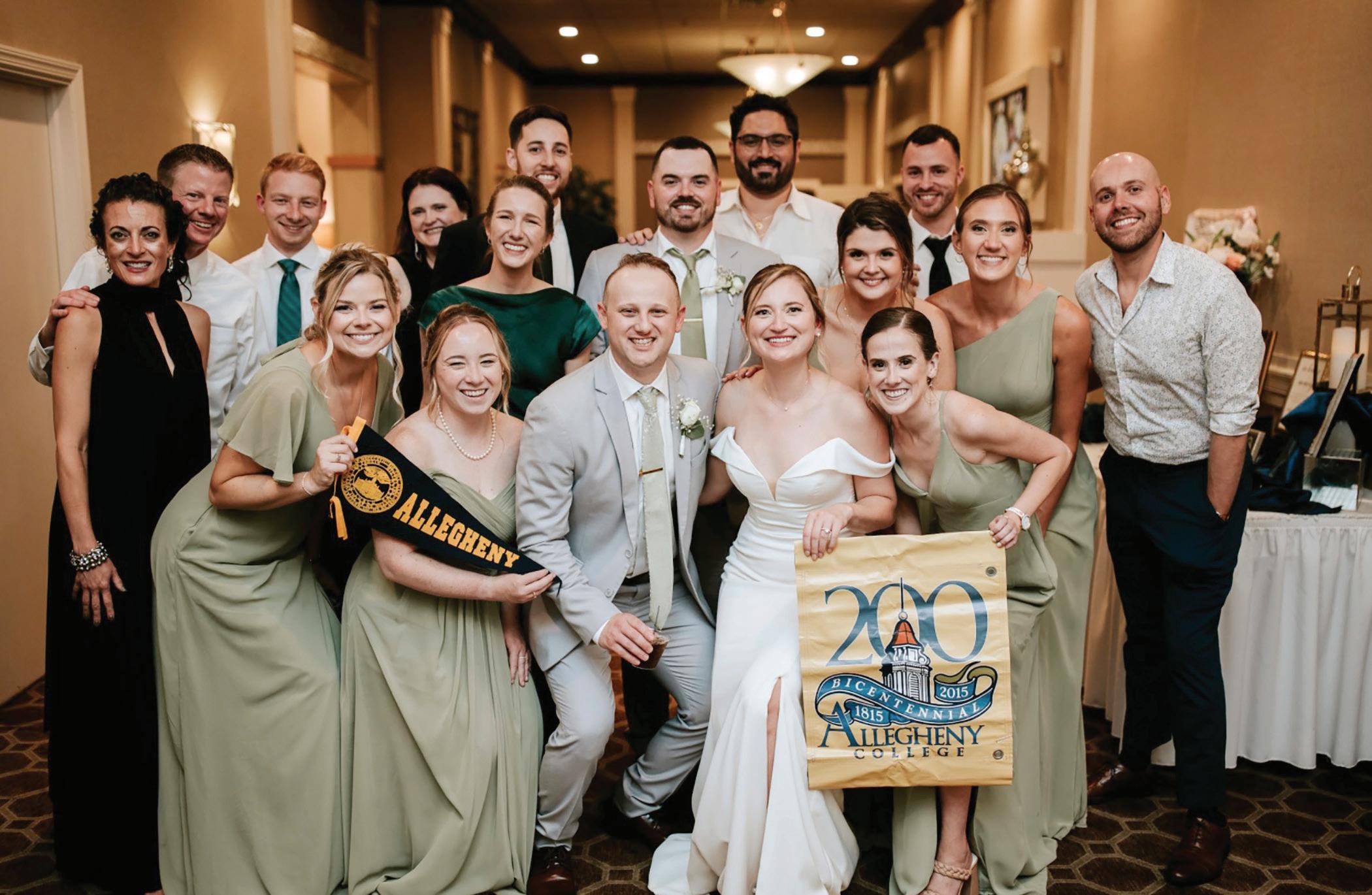
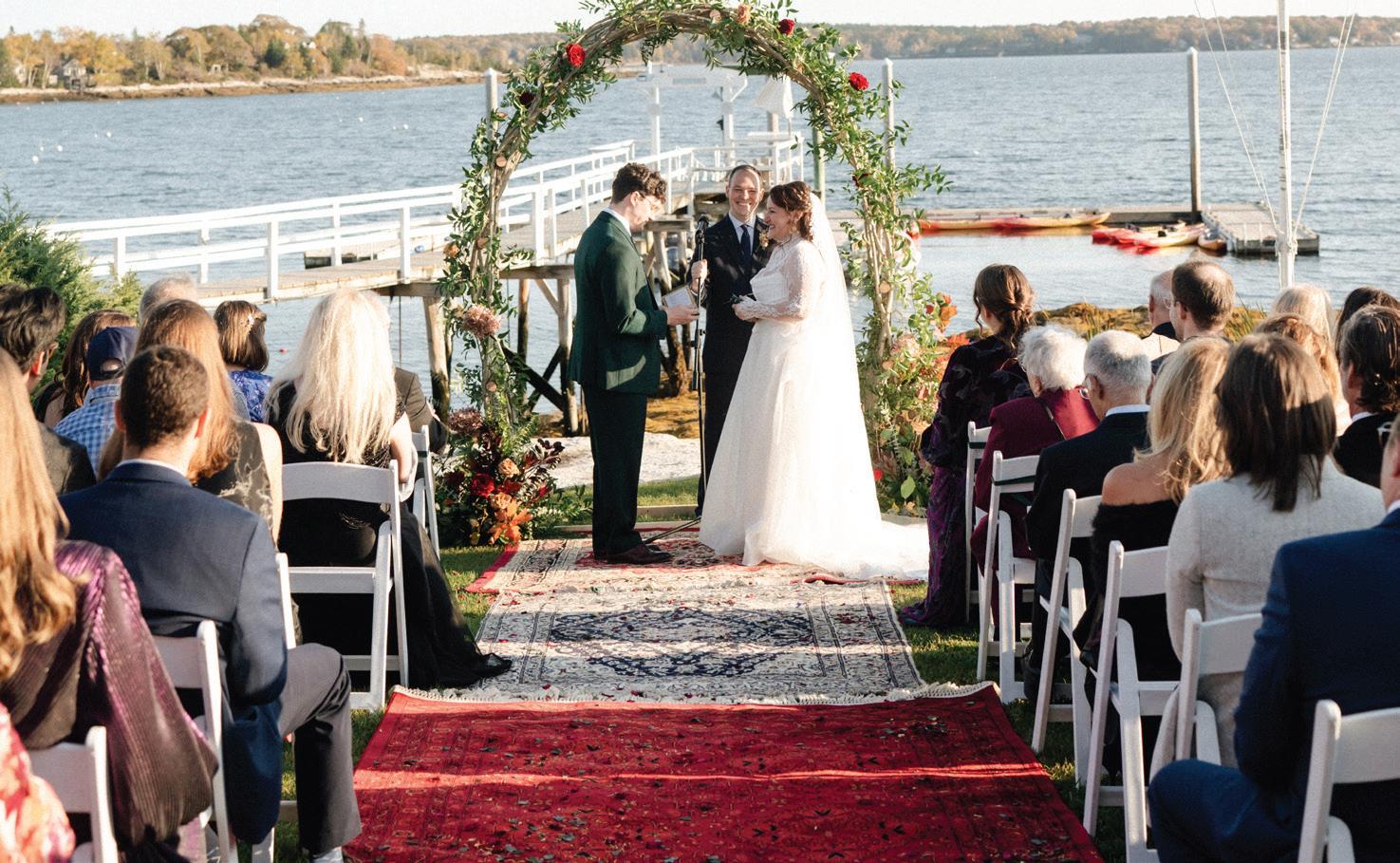
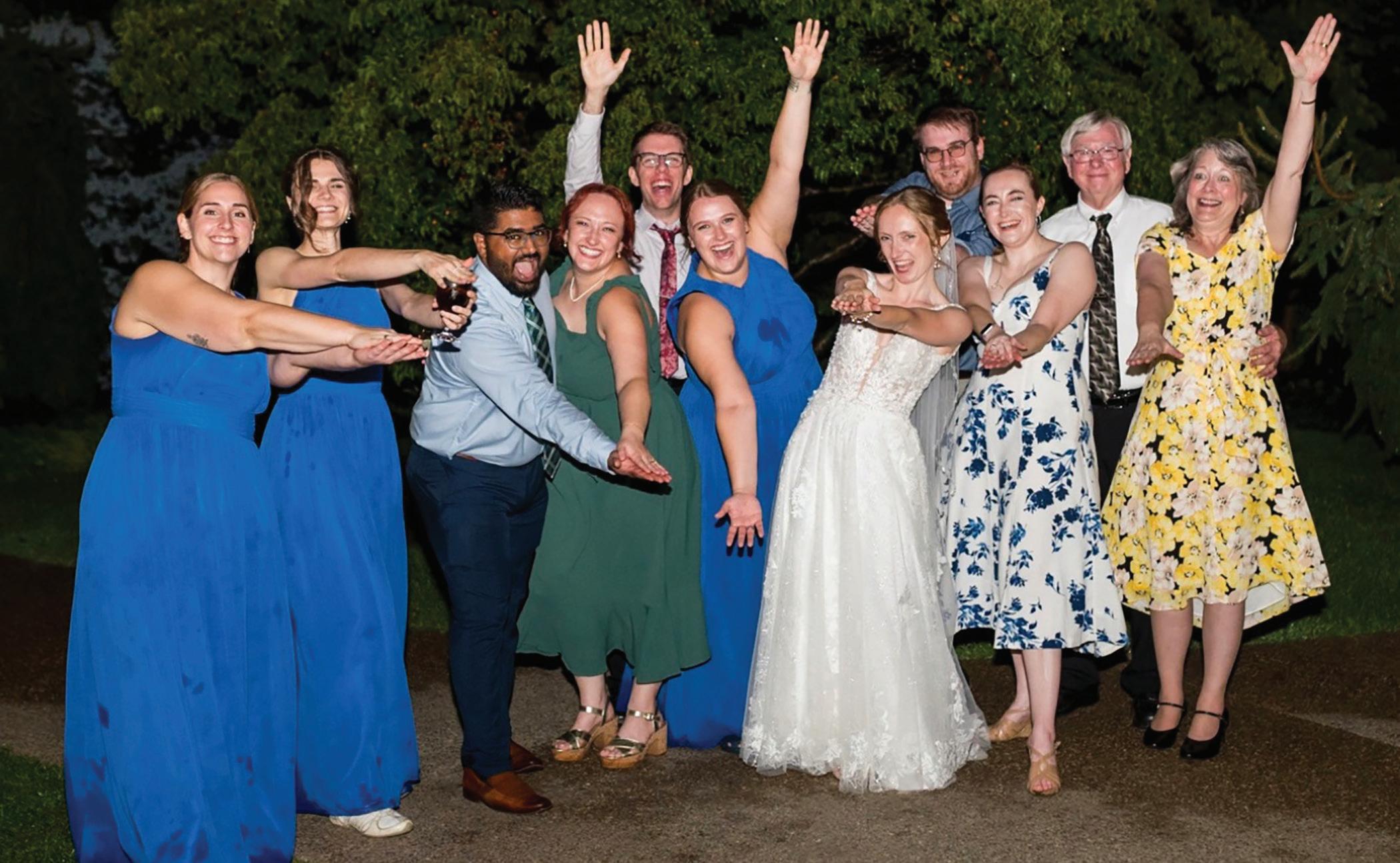
Nick DiBucci '18 and Dr. Hannah Fischer '18 were married September 28, 2024, in Pittsburgh, Pennsylvania. Alumni in attendance included Alissa Hill Hayden '18, Maggie Donaldson '18, Margo Birol '18, Emily Watto '18, Clay Coon '18, Amasa Smith Andes '17, Ashley Weibel O’Brien '18, Zach Shomo '18, Dr. Stephanie Harriman McGrath '03, Mike McGrath '03, Erik Orta '19, Caitlin Deubell '18, Kyle O’Connell '18, Seve Piccolino '15, and Andrew Dawson '17 Other alumni not pictured included Dan Bonnett '18, Madi Caufield '18, Cullen Flaherty '18, Sean Kealey '20, Nick Kempa '20, John Miller '19, Keegan Phillips '20, and Griffin Sullivan '19.
Emily Rahravan '18 and Alex Reganata '18 married on October 19, 2024, at Linekin Bay Resort in Boothbay Harbor, Maine. They were RAs together and co-hosted a WARC radio show called “Consensual Sax.”
Dana O'Connor Plumb ’19 married Dr. Gregory Plumb on August 31, 2024, at Phipps Conservatory and Botanical Gardens in Pittsburgh, Pennsylvania.
“We obviously had to take an Allegheny College alum photo,” O'Connor Plumb said. From left to right: Abbey Hughes '19, Emily Greene '19, Ben Thomas '17, Megan Kelly-Thomas '18, Jonathan Schaeffer '19, Abbie Johnson '19, O'Connor Plumb, Jack Goodman '19, Claire Wilson '19, and Dr. Lowell Hepler and Julie Hepler of the Music Department.
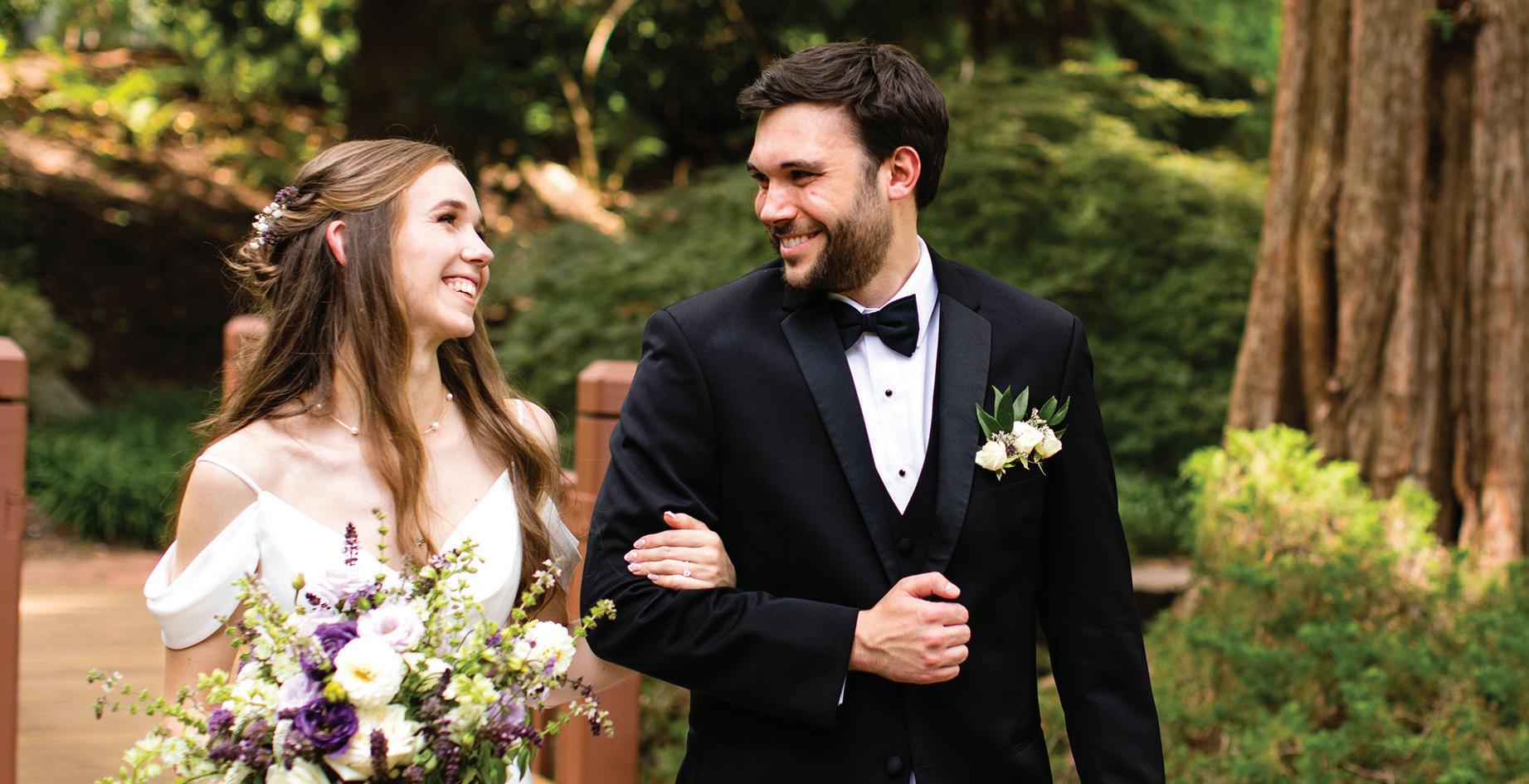

Find the full listing at allegheny.edu/magazine
These include death notices reported by December 1, 2024. ’45
Muriel MacGregor Brown on August 17, 2024
Marjean Cipperly Moore Good Smith on March 9, 2024
Betty Lou Scava Depp on January 20, 2024
Wanda Peairs Jenkins on January 11, 2024
Mary Eleanore Taylor Feisley on October 20, 2024
Donald Crosby McClimans on January 14, 2024
Margery Elaine Dickey Peffer on August 10, 2024
William L. “Bill” Wright Sr. on June 5, 2024
’51
Joseph C. Friedman on March 27, 2024
Donald Merle Roha on September 6, 2024
Warren Ernest Smith III on September 21, 2024
Lindsay Benko '20 and Bobby Bower '20 were married on August 12, 2023. Alumni in attendance included Olivia Blakeslee Burgess '21, Erin Hartwiger '21, Ethan Kennelly '21, Maximus Levinsky '21, Kassie Hill '20, Macey Klingeman '20, Brontë Arreola '20, Carla Aldana '20, Rachael Cohen '20, Jared Bobeck '20, and Kierstin Faw '21
Shane Fiorentini '20 and Alexa Newman '21 were married on October 5, 2024, in Deep Creek, Maryland. Pictured are (front row) Lindsay Blum '21, Renna Wrubleski '21, Newman, Fiorentini, Shannon Putnam '20, Alex Graf '21, Lola Asnin '21, (back row) Justin Brucker '21, Bret Kelly '20, Wyatt Wright '21, Andrew Vincent '20, Jyl Russotti '22, Ari Villavicencio '20, Megan Keruskin '20, Rhiannon King '20, Matt Hass '19, and Hannah Snyder '21
William Cooper Hillhouse on July 31, 2024
Dr. Darrell “Skip” Windfred McIndoe on July 5, 2024
Richard "Rooney" Ashby Myers on September 19, 2024
Edward E. Werley on June 18, 2024
Charles Azel Barney on July 14, 2024
John Allen Beardsley on July 7, 2024
Cmdr. Richard Hannah Davis on November 19, 2024
Shirley A. Kragnes Rather on September 2, 2024
Susan Williams Byron on May 22, 2024
Jean Fellows Foust on November 19, 2024
Paul Gadigian on July 13, 2024
Mary Anne "Nan" Kilburn Trevathan on August 27, 2024
’55
John Richard Kenny on September 10, 2024
Thomas J. Klasek on April 6, 2024
John Morgan Jr. on October 12, 2024
’56
William “Bill” T. Deane on September 9, 2024
Doris Jeanne Jones Lifton on May 18, 2023
Dr. Arthur David Steffee Jr. on August 16, 2024
’57
Joyce Conley Carman-Baldus on October 31, 2024
Robert R. McMullin on August 31, 2024
Sara Phipps Semmelroth on July 29, 2024
Lloyd Charles Wisdom on July 10, 2024
’58
David Allen Blauch on October 14, 2024
Richard "Dick" Broman Lander in July 2024
Paul Milton Thomas, Ph.D., on September 6, 2024
’59
Martha Jones Feidt on November 18, 2024
Sarah Stewart St. Clair on September 13, 2024
’60
Carol Murdoch Matregrano on November 23, 2024
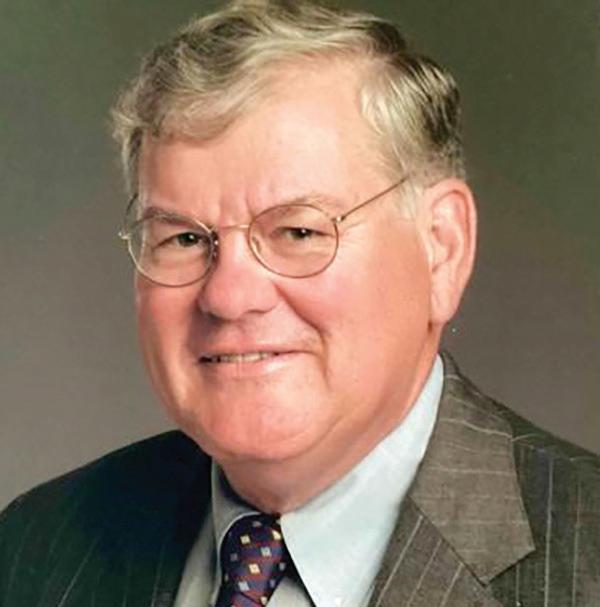
Robert Adams on July 5, 2024
Fr. Bernard Colussy, OFM, on July 24, 2024
Barbara A. Gartrell Conlin on September 23, 2024
Dr. David A. McKay on April 25, 2024
Ronald R. “Ron” Brooks on July 14, 2024
Nancy Brant Cunningham on June 29, 2024
Joseph D. O'Neill on August 7, 2024
Edmund Ravenscroft on September 24, 2024
Robert Clay Stephenson on August 13, 2024
Raymond Michael “Mike” Terné on August 30, 2024
Beth Ann Sutherland Terry on October 26, 2024
Gertrude "Gaye" Cushner Burkett on November 16, 2024
James Drake on June 11, 2024
Harvey H. Ekins on June 4, 2024
Dr. Joseph C. Calabrese on August 4, 2024
William "Bill" Graham Dolde on August 20, 2024
Nancy Watkins Dunham on July 24, 2024
Martha Jane Lindsay Koepf on July 28, 2024
George Charles Dehne died January 19, 2025, at his home.
He was born on November 14, 1946, in Philadelphia, the youngest of three siblings. He shared 51 years of marriage with his beloved wife, Joan, who was not only his life partner but also his business partner. Together, they built GDA Integrated Services, with George leading the company as a visionary and Joan managing its financial operations as CFO.
His career in higher education marketing began during his tenure as special assistant to the president at Carleton College from 1977 to 1981. There, he developed a groundbreaking marketing program that won four Grand Awards for Public Relations and Admissions from CASE and garnered national attention in The New York Times, The Wall Street Journal, and Harvard Business Review. Earlier in his career, Dehne worked as a feature writer for United Press
International, creative director for Young & Rubicam, and director of the news bureau at Wittenberg University. He co-authored the seminal work “Marketing Higher Education: A Handbook for College Administrators,” solidifying his reputation as a pioneer in the field.
Beyond his entrepreneurial endeavors, Dehne extended his expertise on a global scale as a Senior Advisor to the International Association of University Presidents (IAUP) from 2008 to 2011, where he created and maintained the first Worldwide Global Survey of University Presidents.
A passionate supporter of a liberal arts education, Dehne served as a trustee at both The Trinity-Pawling School and Allegheny College, where his dedication and leadership left a lasting impact. His contributions to higher education were further recognized when he received an honorary doctorate from Morningside
College in 2015, honoring his illustrious career as an admissions, financial aid, and public relations consultant to some of the nation's leading colleges and universities, including Morningside itself.
Dehne was a lifelong learner, earning a master's degree in education from Indiana University. He graduated from Allegheny College in 1968 with a BA in English and was a proud 1964 graduate of Germantown Friends School.
He is survived by his devoted wife of 51 years, Joan; his siblings Nancy Dehne Myers and Theodore L. Dehne, Jr. (Victoria); his children Charles Nicholas Dehne (Carolyn) and Kathryn Elizabeth Dehne (Peter); and his five granddaughters: Adelaide, Waverly, Louella, Isabella, and Cypher. He was preceded in death by his parents, Roberta and Theodore L. Dehne 1927
’65
Lana Shield Creal on September 14, 2024
John "Jack" Tjaden on August 21, 2024
Dr. Peter J. Wolfe on November 29, 2023
’66
Sally Ann Dietz on September 15, 2024
Betsy Lynn Myers Maxwell on July 2, 2024
’67
Margaret “Peggy” Swan Lewis on June 16, 2024
’68
Leonard G. Hunter on June 5, 2024
’69
The Rev. Hugh Frank McKnight on June 17, 2024
’70
Deborah “Debby” Wood Appleyard on August 31, 2024
The Rev. Elaine Marie Rader Hower on October 21, 2024
John Travers White Jr. on July 26, 2024
’71
Tim Boomer on October 12, 2024
Jim D. Humes on September 7, 2024
’75
Darcy Mitchell Roediger on September 24, 2024
Brady W. Stewart III on October 15, 2024
’79
Alan Pierre Daniel Koseff on September 4, 2024
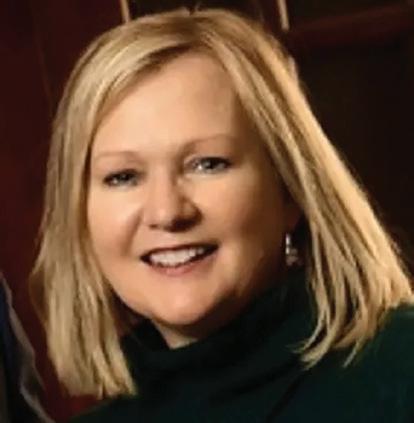
Robert L. Purvis on August 16, 2024
’81
Scott A. Johnson on August 16, 2024
’84
Anne Linaberger on October 25, 2024
’86
Doreen Lynn Giebner on June 23, 2024
Gregory P. Niedbala on October 26, 2024
’87
Dr. Joseph Robert Weyers on June 10, 2024
’88
Kellie Sue Carlson Anderson on October 18, 2024
’08
Dr. Christopher J. Karns on August 7, 2024
’09
Sheila Mae Frantz Wood on July 28, 2024
Lucille Ford, Ph.D., on September 2, 2024
Dr. William David Graham on June 25, 2024
Ralph I. Hocking on August 12, 2024
Jean Lynch on August 31, 2024
Dr. William Braxter Wiggins in October 2024
Former Assistant Director for Donor Relations
Janice Scharra McInally died October 5, 2024.
She was born on September 20, 1963, to Patricia and Joseph Scharra in Akron, Ohio. She was a graduate of the University of Akron, where she met her devoted husband, Dave (former Allegheny dean of students and executive vice president), and was active in Alpha Gamma Delta sorority (serving as president), the Panhellenic Council, and many other aspects of student life.
She began her professional career at Allegheny, serving primarily in the Admissions and Development Offices for
25 years. During this time, Janice and Dave welcomed their children Will ’14 and Susannah ’15, the source of her greatest joy throughout her life. Janice and her family were active in First Presbyterian Church and numerous community organizations and were a constant presence on the Allegheny campus.
In 2013, Janice and Dave moved to Cedar Rapids, Iowa, where she served as the “First Spouse” of Coe College. Janice made the role her own, dedicating herself to many forms of service to Coe and countless local organizations, including as chair of the Alzheimer’s Association, and bringing joy wherever she went. In recognition of her
service to the community, the Coe College Center for Health and Society bears her name. Upon retirement, she and Dave relocated to Urbandale, IA, to be near family. They became active in Heartland Presbyterian Church, a loving and welcoming community perfectly suited to Janice’s generous spirit.
Janice is survived by her loving husband Dave, son Will McInally (Liz Dean), daughter Susannah Johnson (Trey), and grandsons Nathaniel and Cameron Johnson. She is also survived by her brother Mike Scharra (Sherry), sister Judy Baxtresser (Earl), and many in-laws, nieces, and nephews, along with their children.
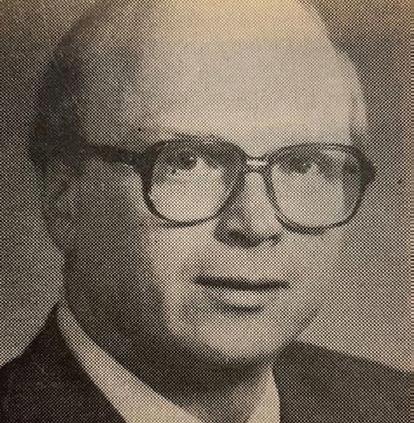
Dr. Carl L. Olson died January 29, 2025, in Meadville Medical Center.
Dr. Olson was born in Newark, NJ, on November 12,1941, the son of Carl and Rose (Haspel) Olson. On June 29, 1968, he married the former Peggy Eisenhower; she survives. He was a graduate of Union High School, and he received his B.A. in liberal arts from Penn State University in 1967, his Master of Divinity from Drew University in 1970, and his Ph.D. from Drew University in 1977.
Dr. Olson was a professor of religious studies at Allegheny for 36 years, with wide-ranging interests and an international reputation in his field. He
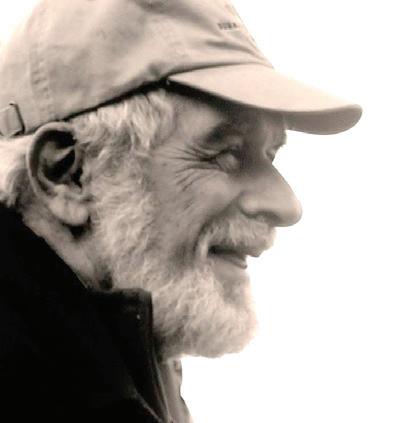
offered courses in Eastern religious traditions, comparative philosophy, and method and theory in the study of religion. He wrote 22 books and multiple publications, enjoyed attending football and basketball games with his friend Lloyd Michaels, and enjoyed visits from his friend Glenn Holland.
Dr. Olson held numerous honors and appointments, including National Endowment for the Humanities Chair and the Teacher-Scholar Professorship of the Humanities at Allegheny. He traveled and lectured in India and Japan, held a Visiting Fellowship and was subsequently elected to Life Membership at Clare Hall at the University of Cambridge. While in
England, he also lectured at Cambridge and Lancaster University and delivered the Walstrom Annual Lecture at Oxford University. For nine years, he served as book review editor for the International Journal of Hindu Studies.
He is survived by his loving family including his wife of 56 years; two daughters, Holly Olson Paz ’96 and her husband, Marlon, of McLean, VA; Kelly Olson ’99 of St. Louis, MO; a brother, Gary Olson of New Jersey; three grandchildren, Ben, Alex, and Sophie; and several cousins and nephews. He was preceded in death by his parents and an infant Jeffrey Olson.
Paul Zolbrod, professor and author, died on February 21, 2025, at home in Albuquerque, New Mexico. He was 92.
Dr. Zolbrod’s best-known work was “Diné Bahane': The Navajo Creation Story,” considered to be the most complete version of the sacred stories in print (New Mexico University Press, 1984). In addition to being a cherished husband and father, he was a beloved professor and mentor who touched the lives of thousands of students.
Dr. Zolbrod was born in Pittsburgh, Pennsylvania, in 1932 to the late Caroline Engler Zolbrod and Herman Zolbrod, both immigrants. He graduated from Mt. Lebanon High School and took a job driving a delivery truck until he was drafted into the U.S. Army, where he served in Japan from 1953–1955. The GI Bill
enabled him to get his bachelor’s degree in English at University of Pittsburgh, graduating summa cum laude in 1958. He was a Fulbright Fellow in France in 1958–59 and an Andrew Mellon Fellow at University of Pittsburgh, where he earned his doctorate, specializing in late Medieval and early Renaissance English literature.
Dr. Zolbrod joined the faculty of Allegheny College in 1964. Several years later, a visit to the Museum of the Plains Indians sparked his curiosity about whether Native American oral tradition included epics such as those attributed to Homer. Thus began the research into Native American poetics that guided his scholarship for the rest of his life.
Teaching was Dr. Zolbrod’s passion. He was a Frederick F. Seeley Professor of English at Allegheny from 1989 to 1994. He was also
the recipient of two National Endowment for the Humanities Research Fellowships. After he retired from Allegheny, he taught at the Crownpoint branch campus of Diné College for 20 years, as well as at New Mexico Highlands University and Pacifica Graduate Institute. To honor Dr. Zolbrod, Allegheny alumni and friends created the Dr. Paul Zolbrod Interdisciplinary Communications Fund to support work in the humanities, where contributions can be made in his honor.
Dr. Zolbrod is survived by his wife, Joanne McCloskey; his children, Zoe Zolbrod and Aaron Zolbrod; his stepchildren, Eric McCloskey and Laurel McCloskey; his grandchildren, Atillio Zolbrod DeBernardi, Adalina Zolbrod, and Lillian Zolbrod DeBernardi; his previous spouse, Joan Dietrich Zolbrod; his sister, Wilma Austern; and 10 nieces and nephews. 47
by Lauren Paulson, Ph.D., LPC Associate Professor of Psychology
Principal Investigator, Community Impact Hub
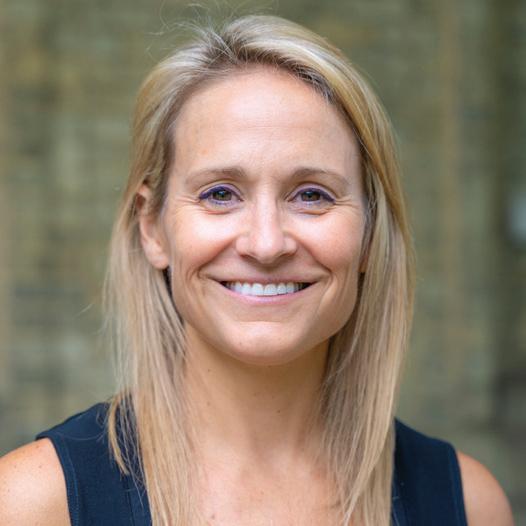
What does it truly mean to be part of something larger than oneself? How can colleges and communities collaborate to build partnerships that foster mutual growth, shared resources, and lasting impact? A successful campus-community relationship transforms both individuals and the collective, fostering personal growth while driving progress toward shared goals.
its impact continues for generations. This investment reflects the College’s unwavering dedication to transformative, mutually beneficial partnerships.
The Hub aligns with Allegheny’s Strategic Pathway, particularly Goal 4, which emphasizes community and economic development. The Hub’s mission is ambitious: to tackle grand challenges in five key areas. Impact Teams including over 40 students, community partners, faculty, and staff work together to ensure these initiatives are intentional, impactful, and sustainable.
Reflecting on my professional journey, I’ve come to deeply value community engagement — not only for its impact on students and community partners but for the way it strengthens Allegheny’s legacy of service. Over a decade ago, when I joined Allegheny after working as a professional counselor, I was eager to bridge academia with the surrounding community. Recognizing that meaningful change often starts locally, I transitioned from clinical work to CommunityEngaged Learning (CEL) — a high-impact practice that integrates academics with hands-on community collaboration.
CEL is proven to deepen learning, increase student retention, and foster a sense of purpose by connecting classroom experiences to real-world applications (Kuh, 2008). But for me, it became more than a teaching tool — it became a commitment to working alongside community partners to address realworld challenges. This passion led to my involvement in a pilot grant to test whether Allegheny’s students, faculty, and resources could meet pressing community needs while enriching education. Over time, this work grew into the creation of the Community Impact Hub (the Hub) — an initiative built on collaboration, innovation, and a shared vision for the future.
With extensive assessment and stakeholder input, the Hub was designed to strengthen Meadville while enhancing student learning. In November, Allegheny announced a $15 million endowment grant to sustain the Hub’s work, ensuring
The Hub aligns with Allegheny’s Strategic Pathway Goal 4, which emphasizes community and economic development. Through Impact Teams composed of students, faculty, and local partners, the Hub tackles challenges in key focus areas (see p. 8). The initiative has already seen remarkable results, including capacitybuilding for nonprofits, a robust summer community-based research program, professional development for community leaders, and seed grants for local initiatives.
Beyond its local impact, the Hub enhances Allegheny’s appeal to prospective students. Research shows that students increasingly seek colleges with strong community engagement opportunities. By investing in Meadville’s growth and fostering hands-on learning, Allegheny ensures its graduates leave with valuable real-world experience and the skills to thrive in a competitive job market.
Looking ahead, the Hub is poised for even greater impact. With an innovative and sustainable collective impact model and the continued support of stakeholders, the Hub aims to complete 50-60 community projects annually, host quarterly professional development workshops, and award up to $100,000 per year in community seed grants. But we can’t do it alone. Alumni support is key to expanding this work.
I invite you to join us — whether by mentoring students, volunteering, donating, or sharing Allegheny’s story. Together, we can strengthen the College’s mission and create lasting change. The Hub is not just an Allegheny initiative — it’s a shared legacy of service, learning, and impact, and I am deeply honored to be part of it.
“Never doubt that a small group of thoughtful, committed citizens can change the world; indeed, it’s the only thing that ever has.”
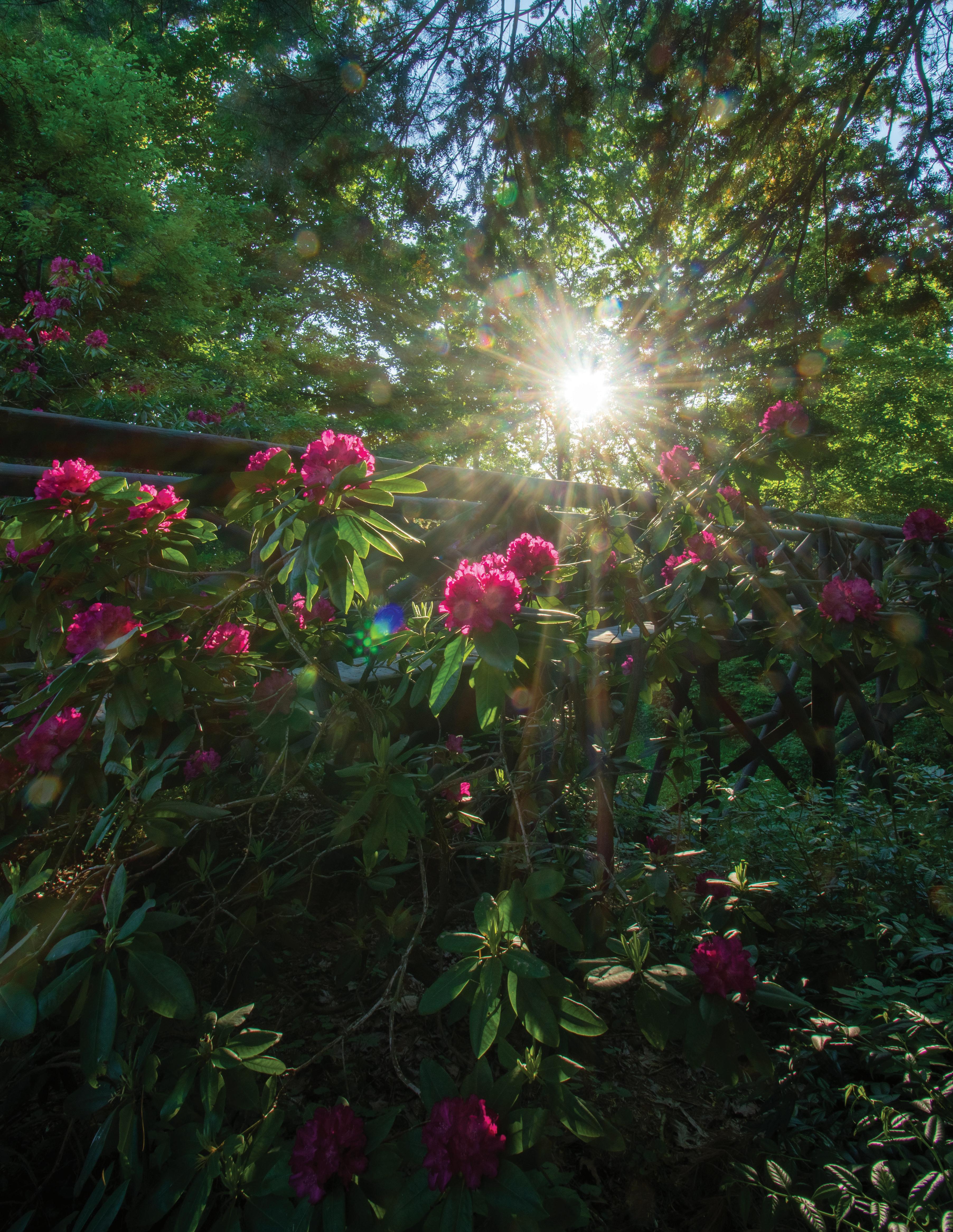
Margaret Mead
Gator energy was in the air at the Gator2Gator Live: Pittsburgh Career Fair, where students met alumni from area companies looking for talent.
